Kayode Tokede
The Central Bank of Nigeria (CBN) raised an estimated N3.58 trillion through the Nigerian Treasury Bills (NTBs) and Open

Kayode Tokede
The Central Bank of Nigeria (CBN) raised an estimated N3.58 trillion through the Nigerian Treasury Bills (NTBs) and Open
Market Operation (OMO) in May 2025, according to a report by the apex bank.
This represents about 75 per cent rise from N2.05 trillion raised in April 2025, and demonstrates
a show of confidence in the Nigerian economy by the investors.
According to the “Government Securities” data by CBN, the estimated NTB and OMO offer
to investors was at N5 trillion in May 2025, as against the N1.95 trillion in April 2025.
The market in May 2025 reflected mixed sentiments, as the amount allotted for OMO
stood at N2.37 trillion, as against the NTB’s N1.21 trillion.
Early in the month, investors' cautious response led to subdued trading as market participants awaited auction results.

Wale Igbintade
The Chairman of the Economic and Financial Crimes Commission (EFCC), Mr. Ola Olukoyede, has said that his commission is currently investigating 18 sitting governors.
He has also debunked the claim that naira spraying was part of the culture and customs of Nigerians, insisting that there was nothing cultural about abusing the country’s currency.
Speaking during a sensitisation programme organised in Lagos for stakeholders, including movie producers and bureau de change (BDC) operators, on the ills of naira mutilation and abuse at the weekend, Olukoyede said the agency would take action when
the tenures of the governors elapse.
He narrated how a former governor was arrested in the United Kingdom because a hotel manager thought he was mad for spraying pounds.
The EFCC boss said the former governor in question fled Nigeria to the UK a day after he handed over power.
“I will give you an experience we had in EFCC. There was a time in this country when we were investigating a governor.
We don’t wait until they finish their tenures before we investigate,” he said.
“As I’m talking to you, I’m investigating 18 governors who
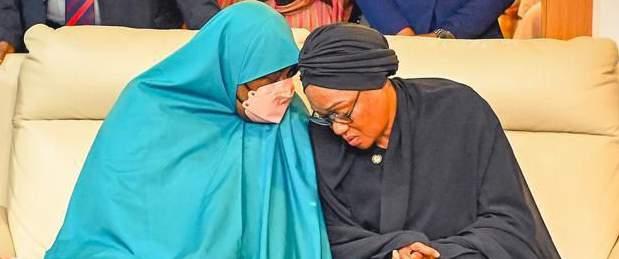




The Federation Account Allocation Committee (FAAC) has shared N1.818 trillion among the federal, state, and local governments as revenue generated in June 2025 — the highest monthly allocation so far this year.
The amount was disclosed in a communiqué issued after the FAAC meeting in Abuja for July 2025.
The Director of Press and Public Relations at the Office of the Accountant General of the Federation (OAGF), Mr. Bawa Mokwa, confirmed that this latest distribution marks a significant rise from the previous five months.
In comparison, the amount shared in May was N1.659 trillion, while N1.681 trillion was shared in April.
are still serving. When they leave (office), we will go to the next level.
“This governor was investigated while he was in office. Immediately, he finished his tenure, the following day, he took off to England to avoid the arrest of the EFCC.
“Coincidentally, that week happens to be his birthday. He organised a birthday party in the hotel where he was staying.
“While the party was going on, he started spraying pounds 50 bills and 10 bills. So, the manager of the hotel was called. He came down and saw the former governor spraying pounds. He had never seen such a thing in his life, so he had to call 911.
“When the Metropolitan Police came, he asked that they should help arrest the former governor. The ex-governor was arrested,
Congress (ADC) over the opposition party’s claim that President Bola Tinubu’s administration exploited the death of former President Muhammadu Buhari for political image laundering.
ADC had Friday mocked President Tinubu, accusing him of exploiting Buhari’s death for political gains.
The opposition party noted that Tinubu’s administration had spent over a year blaming Buhari for the country’s economic troubles, only to now perform public grief in a bid to whitewash its battered image, especially in the North and among Buhari’s loyalists.
ADC also described the recent announcement of appointments by President Tinubu as a “desperate, cynical attempt to buy back the trust that he has spent over a year squandering, particularly in Northern Nigeria.”
But in a swift response, the Presidency described the opposition party’s claims as “shameless” and “obnoxious.”
Similarly, APC also berated the ADC for accusing President Tinubu of
trillion, reflecting firm investors’ appetite amid tight monetary conditions.
Meanwhile, NTB auctions also witnessed robust participation, with subscription levels consistently exceeding offers.
A total of over N1.21 trillion was allotted, particularly concentrated in the 364-day tenor, which saw marginal rate adjustments across the month.
Of the six NTB auctions in May 2025, investors were offered N1.05 trillion and a subscription of N1.42 trillion.
In the secondary market, demand was mostly focused on mid-to-long dated OMO papers, such as the March to May maturities, and new NTB
In March, N1.578 trillion was shared, while N1.678 trillion was shared in February, and N1.703 trillion in January.
The N1.818 trillion shared in July comprised several revenue streams.
These included: N1.018 trillion from statutory revenue, N631.507 billion from Value Added Tax (VAT), N29.165 billion from the Electronic Money Transfer Levy (EMTL), N38.849 billion from exchange difference revenue, and an augmentation of N100 billion sourced from non-mineral revenue.
According to the communiqué, total gross revenue available in June 2025 was N4.232 trillion. From this amount, deductions for
the cost of collection amounted to N162.786 billion, while a total of N2.251 trillion was earmarked for transfers, interventions, refunds, and savings.
A breakdown of the gross revenue components revealed that statutory revenue for June stood at N3.485 trillion, a substantial increase of N1.390 trillion compared to the N2.094 trillion received in May.
Conversely, gross VAT revenue dropped from N742.820 billion in May to N678.165 billion in June, representing a decline of N64.655 billion.
From the N1.818 trillion distributable revenue, the federal government received N645.383 billion.
The state governments received
N607.417 billion, while the local government councils got N444.853 billion. Additionally, N120.759 billion was distributed to oil-producing states as 13 per cent derivation revenue from mineral sources.
Within the N1.018 trillion statutory revenue segment, the federal government received N474.455 billion. The state governments were allocated N240.650 billion, and the local government councils received N185.531 billion. Oil-producing states got N118.256 billion as part of the 13 percent derivation.
For the N631.507 billion generated from VAT in June, the federal government took N94.726 billion. The state governments received N315.754 billion, while the local governments
received N221.027 billion.
Of the N29.165 billion received from EMTL, the federal government was allocated N4.375 billion. The states received N14.582 billion, and the local government councils got N10.208 billion.
Revenue from the exchange difference amounted to N38.849 billion. From this amount, the federal government received N19.147 billion, the states were allocated N9.712 billion, and the local governments got N7.487 billion. A further N2.503 billion was distributed to states entitled to derivation revenue.
The N100 billion augmentation from non-mineral sources was shared, with the federal government receiving N52.680 billion. The state
governments got N26.720 billion, while local governments were allocated N20.600 billion.
FAAC also reported that revenue inflows from Companies Income Tax (CIT), Petroleum Profit Tax (PPT), and Electronic Money Transfer Levy increased significantly in June. However, receipts from Oil and Gas Royalty, VAT, Import Duty, Excise Duty, and Common External Tariff (CET) Levies recorded noticeable declines.
The significant revenue boost in June is expected to provide some fiscal breathing space for governments at all levels as they continue to grapple with funding obligations and development programmes amid broader economic adjustments.
and they wanted to put him in an ambulance.
“The people — his friends, colleagues, and two governors — who went to London to celebrate with him had to intervene.
“They said the ex-governor was not a madman because the hotel manager thought he was mad, and he was handed over to the EFCC.
“He was prosecuted and jailed, but was later pardoned. You could see that even the British do not allow people to spray or stamp their currency”, he added.
Speaking on how to curb the abuse of naira, Olukoyede said the naira is not only a means of exchange, but also “our sovereignty”.
“People claim that naira spraying is part of our culture and customs. Assuming without conceding that it’s true, I think culture and customs must add
exploiting Buhari’s burial for political gains.
Reacting through a statement issued yesterday, the Special Adviser to the President on Media and Public Communications, Mr. Sunday Dare, the Presidency accused the ADC and its leading figures of “disrespecting Buhari and dancing on his grave for relevance.”
“Let it be said clearly: ADC is the one exploiting Buhari’s death for political attention, not this government. From Atiku and El-Rufai’s choreographed arrival in Daura — greeted with chants seeking to make political capital from the solemnity of the moment — to this disgraceful press statement, the ADC has shown itself to be utterly shameless,” it stated.
The presidency dismissed the ADC’s criticism as a “laughable tantrum” and part of a pattern of opportunistic outrage.
“This is not the first time the ADC — in its pitiful, stuttering attempts at reinvention — has embarrassed itself with hollow, attention-seeking criticisms. A party still grappling with an identity crisis presumes lecturing
issuances.
However, activity remained constrained by wide bid-offer spreads and periods of thin market liquidity.
Overall, average mid-yield on benchmark NTBs rose modestly by eight basis points m/m to close at 20.51per cent.
By tightening its monetary policy through modest interest rates and large OMO and NTBs auctions, the CBN aims to curb rising inflation and stabilise the foreign exchange rate, thereby fostering a more balanced economic environment.
THISDAY gathered that investors' demand for long maturities NTBs continued to grow as its stop rate reached
value to us and evolve the way our lifestyle has evolved. There’s nothing cultural about spraying and stamping the naira. The EFCC is mandated to enforce all naira abuse. The commission will be failing in its operation by succumbing to such blackmail. We must all lend our voices to restore the integrity of our naira because it’s our sovereignty,” Olukoyede explained.
Olukoyede, who said he filed over 5,000 corruption cases last year alone, also said it’s very difficult to prosecute politically exposed persons and convict them, especially former governors, because they have the wherewithal to hire lawyers and delay the prosecution.
“More than 65% of the cases we filed last year were on civil servants, politically exposed persons. There was a case of a former governor we spent 11
the President of the Federal Republic on governance, decorum, and public accountability. How utterly ridiculous”, the statement read.
The Presidency insisted that President Tinubu’s conduct during the mourning period was both dignified and befitting of the stature of the late former President.
“The burial of former President Buhari was conducted with the complete honour befitting a leader of his stature. That is why world leaders showed up, millions of Nigerians tuned in on television and across social media, and even ADC promoters were falling over themselves in Daura, prancing about the Buhari family compound like eager real estate agents scouting new territory,” it noted.
Highlighting the administration’s focus and performance, the statement outlined what it described as President Tinubu’s growing list of achievements.
According to the statement, Tinubu’s achievements “are not press statements. These are the results. Tangible, measurable, and ongoing. That is leadership,” the statement added.
The Presidency described the ADC
18.9000 - 26.0000 per cent as of May 21, 2025,
The variation in stop rates across tenors also offers insight into investor sentiment regarding short-, medium-, and long-term economic outlooks.
Investors’ diversified demand across the different maturities of NTBs reflects strategic positioning for various investment horizons and signals a healthy trading environment in the Nigerian debt market.
The Mr. Olayemi Cardoso-led Monetary Policy Committee (MPC) of the CBN has jacked up the interest rate by 870 basis points to 27.50 per cent from 18.75 per cent at the start of the year to combat rising inflation. This has
years on interlocutory injunction from the Federal High Court up to the Supreme Court before the apex court decided that he (ex-governor) had a case to answer.
“Do you know what it takes to prosecute former governors?” he asked.
“We received calls from the high and mighty. At times, we have to relocate from our homes. We’re constantly under pressure.”
On how to nip corruption in the bud, the EFCC chairman said: “I also established a fraud risk assessment unit to prevent money from being pilfered. Within one year of the unit, we have prevented N10billion from being stolen.
“The EFCC also owns an anti-corruption radio, 97.3 FM, for public enlightenment and anti-corruption efforts to curb the activities of fraudsters.”
as a political “contraption” plagued by internal strife and legal woes, noting that the party has become consumed by “internal squabbles” and is “reduced to issuing these baseless attacks to cling to the fringes of relevance.”
It added that “President Tinubu honoured Buhari with dignity in death and continues to honour his legacy through hard work, not hollow words.”
On its part, the APC, in a statement by its National Publicity Secretary, Felix Morka, noted that ADC’s criticism of the dignified state burial accorded the late President was as spooky as it was unconscionable.
Morka said: “It (ADC) has cut its own portrait as a party of mindless political dregs, a dump of Nigeria’s internally displaced politicians, ready to do or say anything in the chase of attention but sinking itself deeper in the quicksand of ignominy.
“That the ADC is blowing up over the state burial of the late President only reflects the party’s duplicity and insensitivity.”
It’s Too Late for You to Buy the
led to an equal increase in the yields of Treasury bills compared to last year.
On Treasury bill yield for 2025, analysts at Cordros Research in a report titled, ‘Nigeria in 2025. Reform to Recovery: Navigating the Rebound, said, “Given our expectations of a pause in monetary policy rate hikes and a moderate pace of borrowings in 2025, we expect yields to pare, particularly towards the second half of the year, after a further increase in Q1-2025.
“Specifically, we expect the onset of the disinflationary process in Q1-2025 and the pause in rate hikes, which should begin in March, to influence market sentiments.
He also explained that, unlike in the past when some of the money recovered was relooted, the commission, according to him, is poised to use money recovered judiciously.
“We have also recovered a university, which we later changed to the University of Applied Sciences, Kashia Kaduna, from a former director in the civil service who diverted about N12 billion to build a university. The university is one of the best private universities we have around.”
He said that out of 194 foreigners who were arrested in Lagos on charges of illegal cryptocurrency, 168 of them have been convicted.
“As of yesterday, 168 of the foreigners have been convicted. We are ready to clean our economic sector to make it attractive to foreign investors.
North with Token Appointments, ADC Tells Tinubu
In a similar development, the ADC also described the recent announcement of appointments by Tinubu as a “desperate, cynical attempt to buy back the trust that he has spent over a year squandering, particularly in Northern Nigeria.”
In a separate statement signed by the party’s National Publicity Secretary, Abdullahi, the ADC dismissed the so-called appointments as “too little, too late,” adding that “you cannot marginalise a region for over twenty-five months and expect applause because you suddenly remembered on the twenty-sixth month that Nigeria is bigger than Lagos State.”
According to the ADC, these appointments are nothing more than “political panic management,” a frantic attempt to bandage the gaping wounds inflicted on Northern Nigeria by over a year of calculated neglect, presidential arrogance, and unprecedented nepotism.
“For over a year, this government turned a blind eye as bandits
“Additionally, while we expect the demand-supply imbalance to persist, the slower borrowing pace could cause yields to temper.
“Considering all the factors, we expect yields to decline and settle at c.18.5 per cent and c.18 per cent on Treasury bills and bonds by 2025 year-end, reflecting our expectations of successful policy pass-throughs.”
Investment Banker & Stockbroker, Mr. Tajudeen Olayinka, attributed the high yield to the factor of demand and supply, stressing that the government deliberately increased NTB supply to encourage a higher stop rate above 20 per cent, or that some institutional investors held back
“Yahoo, Yahoo, and other associated crimes have done a lot of reputation damage to us. At one time, Nigerian passports could enter 12 developed countries without a visa. But today, the international passports of Cameron and Ghana are better than ours,” he lamented.
Corroborating the EFCC chairman, Director General of the National Orientation Agency (NOA), Mallam Lanre Isa Onilu, said abuse of naira is not only unlawful, but it’s also unethical.
“For civic responsibility and national cohesion, we must ensure that we treat our naira in a dignified manner. “The National Values Charter also dwells on how to curb the abuse of the naira. “We have our television commercials running on some stations to sensitise Nigerians about this,” he added.
terrorised villages in the north, as our farmers abandoned their land, and as rural economies crumbled under the weight of poorly thought-out fuel subsidy removal,” Abdullahi said.
“Now, under the rising heat of public discontent, and with the emergence of a formidable opposition coalition gaining traction in the North and across the country, President Tinubu suddenly remembers that there are Nigerians to appoint into positions outside Lagos.
“Every major decision of this administration, from subsidy removal to a majority of the political appointments, has been taken without the North at the table. Now that the consequences of those decisions have become glaring, the President is doling out appointments as consolation prizes.
''But Northerners, as co-owners of our great Federal Republic, know better than to be deceived by these token appointments. They see through President Tinubu’s actions — and can sense that this is not genuine. Tokenism is not inclusion, and symbolism is not governance,” the ADC spokesperson said.
their bids.”
According to him, "the essence is to encourage foreign inflows that could help improve dollar liquidity in the foreign exchange market and cause a moderation in Naira exchange rate until the market attains an equilibrium level.
"I have no doubt that this is the most appropriate decision on the part of CBN and the government at this time. There's a need to improve dollar liquidity that will eventually force domestic interest rates to moderate subsequently. “The higher interest rate will likely filter into the equity market to temporarily moderate the bullish sentiments in that market as well."
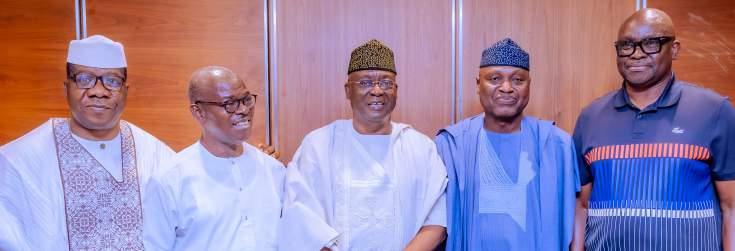
L-R: Senate Leader, Senator Opeyemi Bamidele; former Ekiti State Governor, Mr Segun Oni; Chairman of Nigerian Ports Authority (NPA), Senator Dayo Adeyeye; Ekiti State Governor, Mr Biodun Oyebanji; and former Ekiti State Governor, Chief Ayodele Fayose; at a programme held in honour of the newly inaugurated NPA chairman, Senator Adeyeye in Abuja...recently
The Academic Staff Union of Universities (ASUU), University of Maiduguri (UNIMAID) chapter, has strongly rejected President Bola Tinubu’s move to rename the institution after the late former President Muhammadu Buhari
In a statement released by the Chairman of the UNIMAID chapter of ASUU, Dr. Abubakar Mshelia Saidu, described the decision as “politically motivated,” and a “brazen affront” to the university’s legacy, history, and academic integrity.
The renaming, announced at a special Federal Executive Council (FEC) meeting held in Buhari’s honour on July 17, has drawn widespread criticism both within and outside the university.
The union is now mobilising its Congress, veterans, and extended executive council to
resist the move.
“This action is not merely shocking; it desecrates the sanctity of our alma mater,” the union said, especially as “the university prepares to mark its 50th anniversary under the widely respected ‘UNIMAID’ identity.
ASUU warned that the decision amounts to sacrificing the institution’s hard-earned reputation for political patronage.
The statement also noted that public outrage is mounting, and ASUU’s response would be “unequivocal, forceful, and commanding.”
While calling for collective resistance, the union emphasized that it will respond intellectually and factually, urging members and the public to contribute views ahead of upcoming deliberations.
“We must articulate our adamant opposition and demand
Tinubu Leaves Abuja Today to Attend Awujale’s Eighthday Prayer in Ijebuland
President Bola Tinubu is scheduled to leave Abuja today for Ijebu-Ode, Ogun State, where he will attend the eighth-day prayer for Oba Sikiru Kayode Adetona.
The Awujale of Ijebu, a revered traditional ruler, passed away on July 13 at the age of 91 and was buried the following day.
His burial, conducted in accordance with Islamic rites, took place quietly in Ijebu-Ode, marking the end of a remarkable era of leadership.
The Oba, who ruled for an unprecedented 65 years, was one of Nigeria’s longest-serving traditional rulers and a major voice in national affairs.
The News Agency of Nigeria (NAN) reported that President Tinubu will be joined by Governor Dapo Abiodun and other dignitaries at the solemn event.
The prayer ceremony is scheduled to be held at the Dipo Dina International Stadium, one of the largest venues in Ijebu-Ode.
The event is expected to draw traditional rulers, political leaders, business executives, and religious figures from across Nigeria and beyond.
Earlier on Friday, the president paid a condolence visit to Kano, where he sympathised with the family of late elder statesman, Alhaji Aminu Dantata. Tinubu has intensified condolence visits in recent weeks following the loss of several high-profile Nigerians, including former President Muhammadu Buhari.
These visits reflect his commitment to honouring leaders who have served Nigeria with distinction and left a lasting legacy.
During Oba Adetona’s 90th birthday and 64th coronation anniversary, Tinubu conferred upon him Nigeria’s second-highest national honour, recognising his national contributions.
The Oba was widely regarded as a progressive traditional ruler who spoke truth to power and prioritised education and development across the Ijebu community.
In his journey to the presidency, Tinubu began his consultations with Oba Adetona, a gesture that demonstrated deep personal and political respect.
After emerging victorious, he returned to the Awujale’s palace to express appreciation, fulfilling a promise he made during the campaign.
In preparation for the eighth-day prayer, security has been strengthened across Ijebu-Ode, especially on roads leading to key venues.
Streets around Dipo Dina Stadium, the Awujale’s Palace, and his Igbeba private residence are now under strict surveillance by security operatives.
Officers of the Nigeria Police Force, Nigerian Army, Nigeria Security and Civil Defence Corps (NSCDC), and Amotekun Corps are positioned at strategic points.
Their presence is to ensure peace and proper coordination of the event, expected to attract thousands of mourners and well-wishers.
the immediate reversal of this illconceived and deeply offensive decision,” the union declared. UNIMAID is a leading
federal university in Nigeria, founded in 1975, and noted for maintaining academic excellence despite ongoing insecurity in
the North-east. Those opposed to the renaming argue that Buhari already has multiple public
institutions named after him, especially in Borno State, stressing that this latest move is unnecessary and divisive.
Olusegun Samuel in Yenagoa
Governor of Bayelsa State, Senator Douye Diri, has faulted the endless process of reviewing the 1999 Constitution.
Speaking in Government House, Yenagoa, Bayelsa State capital, at the weekend, when he hosted members of the House of Representatives’ Committee on Constitution Review, Governor Diri recalled that he was a member of the committee when he was in the National Assembly from 2015 to 2020.
He expressed concern that successive administrations in the country had not implemented the committee’s recommendations.
A statement by his Chief Press Secretary (CPS), Daniel Alabrah, quoted the governor as saying that the exercise was becoming a waste of time and resources as every National Assembly session embarked on the same process without the recommendations being implemented.
The Bayelsa State governor expressed the hope that the current federal government would ensure that the
ongoing review reached a logical end.
Diri restated the need for equitable distribution of the country’s resources and emphasised the injustice to Bayelsa State, an oil-producing state making huge contributions to the economy, in having only eight local government areas.
He said that for Nigeria to make progress, it must practice fiscal federalism and uphold justice.
His words: "I thank you for choosing Bayelsa to host the zonal public hearing on the review of our constitution.
"I appreciate the Speaker of the House of Representatives for sustaining this
ritual, which I hope will come to an end one day.
“But this is not good for us as a country. We cannot be holding a Constitution review, and nothing comes out of it. It is becoming a waste of time and resources. I want to believe that this government has what it takes to implement the decisions that will be made at this time.
"I was a member of this same committee, and nothing happened. But I am hoping that the President we have today, who is a democrat, will implement the recommendations.”
Tinubu remains our choice in 2027, says Daura Emir
Deji Elumoye in Abuja
Wife of the President, Senator Oluremi Tinubu yesterday shared a solemn moment to condole with her predecessor and widow of the late former President Muhammadu Buhari, Hajia Aisha Buhari.
This was during a condolence visit when she led wives of the leaders of the National Assembly, wives of state governors, wives of ministers, wives of service chiefs and other women to the residence of the late former President in Daura, Katsina State.
During Mrs Buhari’s team’s visit to the Emir of Daura, HRH, Alhaji Umar Farouk Umar, the monarch stated that President Bola Tinubu would be their choice in 2027.
According to a statement issued by Mrs Tinubu’s Media Assistant, Busola Kukoyi, the women who took turns to commiserate with the former First Lady, also offered prayers for the family and the repose of his soul.
A brief visit to the grave side of the late President for a short prayer was followed by a call on the residence of Buhari’s uncle and ally, Alhaji Mamman Daura.
Speaking at the residence, the First Lady described the late former President as an accomplished man who made his family, town, state and nation very proud. Responding, Mamman Daura thanked Mrs Tinubu for the support and honour accorded the late former President Buhari.
The Peoples Democratic Party (PDP) governorship candidate for the upcoming Anambra State election on November 8, 2025, has reportedly been shot by gunmen in Abuja.
Sources say the attack happened on Friday night near Wuse 2 as Ezenwafor was on his way home
from an appointment. He was seriously injured in the incident.
Ezenwafor, a real estate developer based in Abuja who emerged unopposed as the PDP candidate, is currently receiving treatment in a private hospital. Doctors are preparing to carry out surgery to remove bullets from his body.
Two other people who were with him at the time also suffered injuries and are being treated.
The reason for the attack and the identities of the shooters are still unknown. Police investigations are ongoing.
When contacted, FCT Police
spokesperson, SP Josephine Adeh, said: “I am not aware. I have not been informed.”
Meanwhile, PDP insiders said the incident could affect the party’s campaign plans, depending on how serious Ezenwafor’s injuries are and how soon he can recover
Chuks Okocha in Abuja
The Acting National Chairman of the Peoples Democratic Party (PDP), Ambassador Iliya Damagum, has described the resignation of former Vice-President Atiku Abubakar from the party as a familiar and recurring development in the party's political history.
This is as Atiku's political acolyte, Senator Ehigie Uzamere, has described the former vice president’s defection to the African Democratic Congress
(ADC) as a spark in political darkness.
Speaking to journalists at the weekend in Bauchi, Damagum said: “This is not the first time; we’re expecting him back.”
According to him, PDP was neither shocked nor overly concerned about Atiku’s exit, adding that the party was already accustomed to his repeated exits and returns over the years.
The acting national chairman stated that the former vice-president’s movement aligned with a historical pattern, implying that the party viewed his latest resignation as part of his
political strategy rather than a final break from the PDP. Damagum further hinted that the party’s calm response stemmed from the confidence it had in its own resilience or skepticism over the permanence of Atiku’s decision.
This, he said, was a sequel to reports that he was forming a new political platform, ADC, in preparation for future elections.
But an acolyte of the former vice president, Senator Uzamere, in defence of the defection, said that, 'Atiku
Abubakar’s resignation from the PDP and his bold defection to the ADC were nothing short of a masterstroke of conviction.
He added that the action was an act of political clarity rooted in moral courage. According to Uzamere, ''in a time when the soul of Nigeria stands at a dangerous crossroads, when compromise has become currency and silence is mistaken for diplomacy, Atiku's departure is not merely a shift in party allegiance, it is a clarion call to patriots.

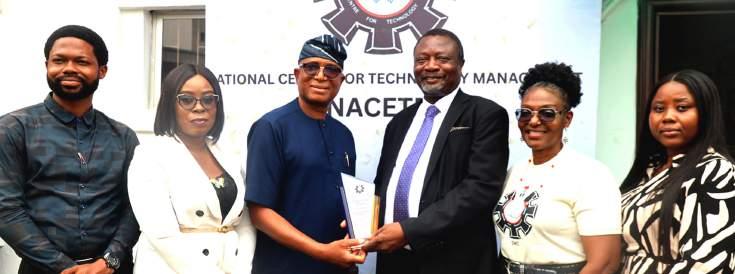
L-R: Executive Assistant to the Chief Executive Officer, Metrospeed Group, Mr. Bright Unaegbu; Head of Marketing and Sales, Metrospeed Group, Emike Ntiokiet; Chief Executive Officer, Metrospeed Group, Col.
(rtd.); Chief Executive Officer/Director-General, National Centre for Technology Management, Dr. Olusola Odusanya; South West Zonal Coordinator, NACETEM, Mrs. Ireti Oyefuga; and Head of Legal, Metrospeed Group,
and IT installations at the NACETEM’s South-west office, in Lagos...recently
Chuks Okocha in Abuja
Former Minister of Works and Housing, Mr. Babatunde Fashola, has stated that the formation of a new coalition led by opposition figures has disproved claims that Nigeria was tilting toward a one-party state.
This is as he said that it would be unrealistic to expect the local governments in Nigeria to function
independently under the current 1999 Constitution.
Speaking during a television interview yesterday, Fashola described the adoption of the African Democratic Congress (ADC) as a reflection of democratic rights to free association and political choice, adding that Nigerians should respect such expressions. However, he questioned the party’s long-term viability and
ideological depth.
He said, “Well, there are many things to take away from those developments. I think perhaps the first is that it puts a lie, a big lie, to the story making the rounds about eight weeks ago that Nigeria was going to become a one-party state because there is an opposition of some quality, whatever that quality may be.
“The second point to make is
that it is a manifestation of a right to choose, a freedom of choice, and a freedom to associate, and one must respect that as I do.
“In terms of the political consequences, there are many things that I’m waiting to see. Gathering ourselves together and saying we want to change Nigeria, we want to remake Nigeria, is all very well and good.
Yinka Kolawole in Osogbo
The senators representing Osun Central and Osun East in the Senate, Olubiyi Fadeyi and Francis Fadahunsi, and a member of the House of Representatives representing Ijesha South federal constituency, Sanya Omirin, have resigned their membership of the Peoples Democratic Party (PDP).
Though the lawmakers did not say which party they would move to, there were indications that the All Progressives Congress (APC) would be their next platform.
Fadahunsi, a two-term senator, in his resignation letter, which surfaced
on the social media, cited irreconcilable differences and protracted legal battles ravaging the PDP.
The senator attributed his exit to ongoing internal conflicts and unresolved legal wrangling that have persisted within the party since the conclusion of the 2023 general election.
According to a letter dated June 12, 2025 and addressed to the PDP Ward 4 Chairman in Obokun Local Government Area of Osun State, Fadahunsi said his decision followed extensive dialogue with political allies, relatives, and trusted confidants.
Fadahunsi, who also heads the Senate Committee on Industry, expressed frustration over what he
termed as enduring party instability at the national level, fueled by drawn-out legal tussles and fractured leadership.
“I wish to formally notify you that I am resigning my Membership of the Peoples Democratic Party (PDP) with immediate effect, due to the irreparable, irreconcilable differences and protracted legal battles that have bedevilled the party at the national level after the 2023 general election.
“This was concluded after consultation and engagement with my political associates, family and friends. It is my wish that you accept my resignation in good faith,” the senator wrote.
Fadeyi’s resignation letter, dated
July 12, 2025, was addressed to the PDP Ward 3 Chairman, Oke Ejigbo, Ila Orangun, Osun State.
The senator confirmed the letter, which partly read: “I wish to formally notify you that I am resigning my membership of the Peoples Democratic Party (PDP) with immediate effect.
“Irreconcilable differences and irreparable division that have emerged and court cases and counter court cases in the last three years, which have created factions in the party at the national level.
“This was concluded after consultation and engagement with my political associates, family and friends.”
The United States has rolled out a new policy introducing a mandatory $250 visa integrity fee for all non-immigrant travellers.
This charge, which allows no exemptions or waivers, is part of the One Big Beautiful Bill Act passed during Trump’s administration.
According to the Managing Director of Programmes and Strategy at the American Immigration Council, Jorge Loweree, “Attaching an additional $250 fee has the very real potential to significantly reduce the number of people that can afford to do that.
“There are hundreds of thousands of people who receive visas and permission from the Department of State to come to the U.S. every single month temporarily.”
The law also permits the Secretary of Homeland Security to increase the fee at any time if considered necessary.
Under the new regulation, the fee will be collected only after a visa is granted.
Applicants whose visa requests are denied will not be required to pay.
However, a refund is possible for individuals who fully comply with the conditions of their visa.
To qualify for reimbursement, travellers must avoid engaging in unauthorised employment, refrain from seeking to extend their stay, and leave the US within five days of their visa’s expiration.
Lawful permanent residents may also be eligible for refunds, though the specific process for claiming them has yet to be outlined.
This policy is expected to have the most impact on tourists, business travellers, and international students.
In addition to the visa integrity fee, the law introduces several other fee increases affecting foreign nationals. For instance, the cost of obtaining Form I-94—which documents the arrival and departure of foreign nationals—has risen.
While air and sea travellers typically receive the form electronically, those entering by land, who previously paid $6, will now pay $24 for each issuance. It remains uncertain which categories of land travellers will be affected by the adjustment.
Travellers from visa waiver countries using the Electronic System for Travel Authorisation (ESTA) will also face increased
costs. The fee has been raised to a minimum of $13, with future adjustments to be tied to inflation.
The legislation further imposes higher charges on various immigration-related services.
Temporary Protected Status applications now cost $500, while initial Employment Authorization Documents (EADs) are set at $550, with renewals priced at $275. Asylum seekers will pay a $100 annual fee.
Humanitarian parole applications now attract a $1,000 charge, and applicants seeking an EAD based on parole will pay $550 for the initial card and $275 for renewals.
In immigration court, the cost of adjusting status is now $1,500, with cancellation of removal set at $600. Most appeals and motions will now cost $900.
“What is the compelling alternative message? Without a manifesto, without a programme of action, I can’t speak to how persuasive the coalition will be, but there’s still a distance to run.”
The former Lagos State governor also criticised Nigeria’s opposition parties for, in his view, abdicating their democratic responsibilities in recent years, stating that the country may benefit from what appears to be a reawakening.
“I respect the rights to associate, and Nigeria perhaps benefits from the reawakening of opposition from what has been a long slumber, if you ask me. The opposition essentially abdicated its responsibility over the last two years,” he said.
Meanwhile, Fashola said it would be unrealistic to expect the local governments in Nigeria to function independently under the current Constitution.
He added that local councils cannot carry out their responsibilities based
on the interference of the state Houses of Assembly and state governments. He explained that the fact that the state houses of assembly make laws for local governments is an external influence that contradicts the idea of autonomy.
“The next thing, of course, is to look in the Fourth Schedule of the constitution and look at all of the responsibilities that are assigned to local governments, such as the operation of slaughterhouses, abattoirs for animals, cemeteries, building of rules, advertising hoardings, primary schools, primary healthcare centres, all of those responsibilities are dependent on one item, land.
“And to the extent that the state government controls land, which affects how the local governments will carry out these functions, I didn’t think that autonomy was intended. Now, if we decide that we want autonomous local governments, those are some of the things we have to free up if that is our decision.
Alex Enumah in Abuja
The Court of Appeal in Abuja has ruled that the National Human Rights Commission (NHRC) lacks the jurisdiction to entertain complaints relating to oil spillage and pollution in Nigeria.
In a unanimous judgment delivered, Justice Okon Abang, who read the lead judgment, held that only the Federal High Court is constitutionally empowered to adjudicate on matters concerning oil pollution and environmental degradation.
“The only authority that has exclusive jurisdiction—indeed, jurisdiction not shared by any person or authority—to make enforceable orders regarding oil spillage and similar activities of oil pollution under section 251(1) of the 1999 Constitution (as amended) is the Federal High Court,” Abang said.
“Certainly not the respondent (NHRC) under any guise.”
The case stemmed from a 2016 petition filed before the NHRC by the Akwa Ibom Oil Producing Community Development Network (AKIPCON) and the All Farmers
Association of Nigeria, Akwa Ibom State chapter.
The petition accused oil companies operating in the state of harmful environmental practices and sought redress.
The Nigerian National Petroleum Company (NNPC) Limited challenged the NHRC’s authority to investigate the matter.
However, in a March 23, 2018, ruling, Justice Binta Nyako of the Federal High Court upheld the commission’s powers to hear the complaint and issue relevant orders. Dissatisfied, NNPC appealed the judgment in suit number CA/A/864/2018, arguing that the NHRC had no legal authority to handle oil spill matters.
Olurotimi Aju, NNPC’s lawyer, urged the Court of Appeal to prohibit and permanently restrain the NHRC’s special investigation panel from probing the allegations.
Citing precedent from Ikechukwu Opara & three others vs. Shell Petroleum Development Company of Nigeria Limited & five others, Aju contended that oil pollution is not a fundamental rights issue and falls outside the NHRC’s mandate.

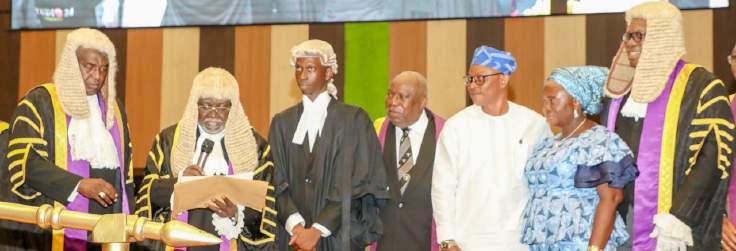
Niger Delta group condemns Okpebholo’s inciting remarks Police warn against planned birthday rally in Kaduna over
Sunday Ehigiator in Lagos, DavidChyddy Eleke in Awka and John Shiklam in Kaduna
The Labour Party (LP) caucuses in the National Assembly have strongly condemned comments made by the Governor of Edo State, Monday Okpebholo, regarding the safety of the party’s presidential candidate in the 2023 election, Mr. Peter Obi.
The Niger Delta Congress (NDC) has also strongly criticised Okpebholo, over his threat against Obi.
These came as the Kaduna State Police Command yesterday cautioned supporters of Obi against holding a rally in honour of his birthday in the state.
Okpebholo, during a public event on Friday, warned that Obi must not visit Edo without prior security clearance.
In two separate statements signed by Senators Victor Umeh; Ireti Kingibe;
Ezea Okey and Tony Nwoye for the Senate caucus and Afam Ogene for the House of Representatives caucus, they described Okpebholo’s remarks as “uncivil, unconstitutional and unbecoming of a public official.”
The senators expressed grave concern over the Governor’s public statement warning Mr. Obi never to enter Edo State again without his permission, or risk the withdrawal of his security protection.
On his part, Ogene noted that Obi, like every Nigerian citizen, is entitled to move freely across the country without fear of intimidation, violence, or political persecution.
The caucus said: "Mr. Peter Obi's philanthropic efforts nationwide embody his humanity and empathy for the people, transcending political affiliations, ethnicity, and other divides.
"Rather than being vilified or incited against, he should be commended for
Sunday Aborisade in Abuja
The senator representing Kogi Central, Natasha Akpoti-Uduaghan, has said she will resume plenary on Tuesday, July 22, 2025, in line with a court decision, despite an appeal filed by Senate President Godswill Akpabio challenging the ruling.
In an interview while in her constituency for a training programme yesterday, AkpotiUduaghan confirmed she had written to the Senate to formally announce her intention to return.
“I have pretty much two months more before the six months expire. However, I have written to the Senate again telling them that I’m resuming on the 22nd, which is on Tuesday, by the special grace of God.
“I will be there, because the court did make the decision on that. Now, they argue that it’s an order, it’s not an order, but it is a decision,” she said.
The lawmaker, who was suspended in March, maintained that while the suspension did not stop her from delivering projects to her constituents, it hindered her ability to carry out key legislative duties such as sponsoring bills and moving motions.
“I did mention that every senator has three major functions. Legislative, which is the creation of
laws and review of treaties. Then we have oversight, which is to oversee ministers and agencies. And then the third is representation, which I’m doing.
“Whereby I identify the problems and the challenges of my community, and I make sure I present them and have them captured in the federal budget. And I have done pretty well with that. Of course, I do miss putting up my bills there, but it didn’t stop me from working,” she explained.
Senator Akpoti-Uduaghan said she has communicated her intentions to resume on Tuesday in a letter to the Senate.
On March 6, the Senate suspended Akpoti-Uduaghan for six months for breaching its rules.
The suspension came amid her allegation of sexual harassment against Senator Akpabio. The Kogi lawmaker, however, took the matter to court, challenging her suspension.
A recent ruling declared the suspension illegal, but the Senate has since filed an appeal, which the senator said does not stop her resumption.
Her planned return sets the stage for a fresh confrontation in the red chamber, as she presses on with what she describes as her constitutional right to representation.
supporting human capital development in the nation.
"As a champion of democracy, nation-building, and sustainable development, Peter Obi deserves protection and support from all who share these values.
"What manner of example do we set for the younger generation, especially as regards public conduct, civility, respect for human rights and the rule of law, as enshrined in the constitution of the Federal Republic of Nigeria?
"How do we fight violence in the land, if as leaders we openly encourage intolerance, bigotry and anti-democratic tendencies, like the Edo State governor has publicly exhibited?
"If Governor Okpebholo could make such inflammatory remarks in a public setting, one wonders what kind of
inciteful rhetoric he might be using behind closed doors against opposition party members or perceived enemies of his party.
"It is instructive that Governor Okpebholo uttered his infamous and satanic verses against Peter Obi at the defection ceremony of Hon. Marcus Onobun, a House of Representatives member who he had only days before threatened with the demolition of his house, for allegedly harbouring cultists.
"It would be interesting to ask Governor Okpebholo if he would still go ahead to pull down Hon. Onobun's country home - which he had marked for demolition - now that he has forcefully coerced him into his political party?
"In fact, it is only in these climes that a governor would glibly boast
about insecurity in his state, as well as lie about the death of citizens, without providing any shred of evidence.
"We, therefore, urge President Bola Tinubu to call the Edo State governor to order. And hasten to warn that no harm should come to our leader, Peter Obi, anywhere in Nigeria or beyond.
"The other day, it was Governor Hyacinth Alia of Benue state; today it is Okpebholo of Edo. If the ruling All Progressives Congress, APC, thinks it can use scaremongering to halt the ever-growing popularity of Mr. Peter Obi, they better think again."
Similarly, in a statement issued yesterday, and signed by NDC's National Spokesperson, Mudiaga Ogboru, NDC described Governor Okpebholo’s warning against Obi was against Section 41 of the Nigerian
Constitution, which guarantees the freedom of movement to all citizens.
“Such divisive rhetoric undermines democratic principles and distracts from the Governor’s core responsibilities,” the statement read.
Meanwhile, Kaduna State Police Command yesterday cautioned supporters of Obi against holding a rally in honour of his birthday in the state.
The spokesperson of the command, Mansir Hassan, said intelligence reports indicate that some criminal elements plan to hijack the event to cause chaos and disrupt public peace. In a statement, Hassan said while the command acknowledges citizens’ right to association and political expression, rallies remain suspended.
Constitution review presents opportunities to steer Nigeria in the right direction, says Otti
The Imo State Governor, Hope Uzodimma, has said that the five states that make up the SouthEast geo-political zone have clear expectations regarding the proposals in the ongoing 1999 Constitution review by the National Assembly, insisting that the zone requires at least two more states.
Also, Governor Alex Otti of Abia State emphasised that the ongoing 2025 Constitution Review offers Nigerians a significant chance to critically examine the current system and decide on necessary changes to guide the country towards progress.
The two governors stated this in their remarks at the South-east Zonal public hearing for Imo and Abia states on the Constitution Review held in Owerri, the Imo State capital, yesterday.
According to Uzodimma, the South-east remains the only zone with five states, underscoring the need for at least two additional states in the region.
He said, “Every other zone has six or more. This imbalance has led to underrepresentation in critical national institutions, from the National Assembly to the Federal Executive Council. It has shrunk our voice and abridged our inclusivity. “Therefore,
it’s only fair and just that we ask for the creation of at least two additional states in the South-east.
“It is my well-considered submission that Anim State should be one of the new states to be created. This is one state that will have an oil-producing status upon creation.
“This makes it commercially viable, with a sufficient revenue base to sustain itself.
“This should naturally go hand-inhand with the creation of new local government areas for the zone.”
The governor noted that “Until a few years ago, Owerri served as the capital of us all. Today, we have Umuahia and Abakaliki as the capitals of the new states.
“Through our collective efforts, perhaps, we shall soon have more state capitals like Orlu, Aba, Nsukka, and more.
“I believe that this is the prayer of the entire South-east, and it shall come to pass by the grace of God”.
He also made a case for a constitutional amendment to pave the way for rotational presidency, not along the North–South divide, but along the six established geo-political zones.
He continued, “This is not about tokenism but national stability.
“Already, zoning has helped calm nerves over federal appointments. If Nigerians know that the presidency will rotate among the six zones, it
will remove the fear of domination and deepen the sense of inclusion in the country.
“In addition, the time has come for us to take decisive steps on state police. The current centralised policing structure is overstretched and often disconnected from local realities.
“As the Chairman of the Progressive Governors’ Forum, I can confirm that we support the decentralisation of the police for greater responsiveness and effectiveness.
“The fear that governors will misuse such a force is unfounded and frankly outdated.
“We cannot allow the past to paralyse the future when our citizens are crying out for safety and order at the grassroots.”
On his part, Governor Otti has emphasised that the ongoing 2025 Constitution Review offers Nigerians a significant chance to critically examine the current system and decide on necessary changes to guide the country towards progress.
He made this statement during his address at the South-east Zonal Constitution Review meeting for Abia and Imo States, held in Owerri, organized by the House Committee on Constitution Review.
Governor Otti, who was represented by his deputy, Ikechukwu Emetu, stressed that regardless of political or other personal beliefs, Nigeria
belongs to all its citizens and they must take responsibility for its future rather than relying on others abroad.
He acknowledged that Nigeria may not yet be the ideal nation its citizens dream of, but pointed out that history teaches nothing is irreversible, implying positive change is always possible. Otti stressed that meaningful change requires an environment free of cynicism, passivity, and mistrust.
"Nigerians need to regain faith in their identity as a community with a rich national heritage and potential."
He shared his personal views on key topics for debate in the constitutional review, noting that these ideas have been part of his public discourse for over a decade.
He welcomed differing opinions from other stakeholders, emphasizing inclusive participation through the public hearing platform. Regarding the proposal to create 31 additional states, Otti acknowledged the reasons behind such calls, mainly addressing marginalization and exclusion of ethnic and religious groups in the current 36-state structure.
He expressed concern about the financial burden and administrative bloat these new states would impose on Nigeria’s already limited resources, doubting the feasibility of funding new states without new revenue streams, thus not sharing the optimism of proponents.


The Director General of the Nigeria-China Strategic Partnership (NCSP), Joseph Tegbe, has disclosed that Nigeria has secured over $20billion in investment commitments from China, aimed at transforming key sectors of the Nigerian economy.
Tegbe said the investments would be channelled into critical sectors such as agriculture, automotive manufacturing, steel, energy, and mining, adding that they were
part of ongoing efforts to fasttrack Nigeria’s industrial revival through deepened collaboration with Chinese business leaders.
In a statement at the weekend from the NCSP, Tegbe said the $20billion commitment was secured through a series of engagements, following the recent elevation of Nigeria-China relations to a Comprehensive Strategic Partnership.
He added that the investments will begin rolling out later this year. The statement partly reads: “Following the
Ex-guber Aspirant, Azuka Okwuosa, Wins APC Ticket for Anambra South Senatorial
David-Chyddy Eleke in Awka
Former Anambra State governorship aspirant, Hon. Azuka Okwuosa, has clinched the ticket of the All Progressives Congress (APC) for the August 16 senatorial bye-election for Anambra South Senatorial zone.
Okwuosa defeated Mr. Obinna Uzor to clinch the ticket.
The Anambra South senatorial bye-election is to replace the late Senator Ifeanyi Ubah, who died a year ago in the United Kingdom.
In a keenly contested election, which was conducted by a seven-member committee from the national secretariat of the APC and chaired by Chief Henry Ikoh, Okwuosa polled a total of 470 votes to defeat Uzor, who garnered 57 votes.
Announcing the results, the chairman of the primary election committee, Chief Ikoh, revealed that a total of 594 delegates from all seven local government areas of the zone participated in the primary election, with 22 invalid votes.
Organisations of Persons with Disabilities (OPDs) has advocated for a more strategic visibility.
OPDs made this advocacy at a one day workshop training with the media organised by the Voices Amplified Network (VAN) in conjunction with Ability Impact Centre (AIC) in Lagos.
The training/workshop brought together over 10 OPDs. It featured expert-led sessions, hands-on group work, and the launch of AIC’s Media Kit for OPDs, a pioneering resource to help organisations craft compelling, advocacy-driven communication.
A highlight of the day was the interactive session led by Ayo
Makinde of Channels Television, which challenged participants to move from narratives of pity to narratives of power.
“This workshop is more than training, it’s a movement. We are reclaiming our stories and taking our place in Africa’s development agenda,” Co-founder of the Ability Impact Centre (AIC), Olusola Adeyefa said.
Tobiloba Ajayi, Founder of the Let Cerebral Palsy Kids Learn Foundation, and Folashade Salimonu, a broadcast journalist from the Lagos Television (LTV), were among the distinguished resource persons who added depth to the conversation on inclusive media.
elevation of Nigeria-China relations to a Comprehensive Strategic Partnership and the establishment of the NCSP, Nigeria has recorded significant milestones in key sectors.
“Recent engagements have secured over $20 billion in invest-
ment commitments, focusing on critical sectors such as agriculture, automotive manufacturing, mining, steel production, and energy. These investments are set to boost food security, create jobs, and drive a new wave of industrial development in the country.
“These are not just promises. We are looking at tangible projects that will create jobs, boost food security, enhance power generation, and reposition Nigeria as a major manufacturing hub in Africa.”
Tegbe explained that the NCSP, which was established to steer Nigeria’s engagement with China under the Forum on China-Africa Cooperation, is also leveraging partnerships beyond formal agreements to bring about transformative economic results.
Seriki Adinoyi in Jos
The Plateau State Government has demanded the withdrawal of military personnel from flashpoints, calling for the deployment of mobile police personnel in the areas. This demand followed recent attacks in villages in the Riyom Local Government Area (LGAs), where 27 persons were killed.
Governor Caleb Mutfwang
had condemned the incident during his visit to the affected communities on Wednesday, blaming security personnel for failing to apprehend the perpetrators.
In a statement at the weekend, the Special Envoy on Peace and Security to the governor, Prof. Chris Kwaja, said the presence of soldiers has not yielded positive results, hence the need to deploy mobile policemen, whom the
government believes are better equipped to tackle insecurity in the region.
Kwaja noted that during Tuesday night’s attack, the security forces, especially the Operation Safe Haven, a security task force maintaining peace in the state, failed to foil the attack despite its presence in the area, adding that the attack was avoidable, given the early warning signs and intelligence reports.
He said: “The federal government should, as a matter of priority, consider withdrawing all military personnel deployed in flashpoints and replace them with Mobile Police Squads. This change in approach is necessary to ensure a more effective and responsive security strategy that prioritises fighting against asymmetry warfare, which the MOPOL is conversant with.”
Chuks Okocha in Abuja
Former Kaduna Central Senator, Shehu Sani, has said that while alive, the late President Muhammadu Buhari never honoured anyone the way President Bola Tinubu did to him.
Tinubu had declared a public holiday on the day Buhari was buried, personally attended his
burial, and also named a federal institution after the late Nigerian leader, among other recognitions.
Sani described the actions as unprecedented and deserving of acknowledgment.
In a post on X, Sani highlighted the series of gestures Tinubu undertook to honour his predecessor.
These include a declaration of a public holiday, physically attending
Buhari’s interment, meeting his family, holding a Federal Executive Council meeting in his honour, and renaming a university after him.
“The President physically attended the burial of Buhari, met with his family, declared a public holiday, held a FEC meeting in his honor, and renamed a university to immortalise him.
“Something even the late
president never did to others. And yet they said he is ‘exploiting the death of Buhari’.
“What would they have said if he had done none of the above?
Politics is something else,” the senator tweeted.
The post has continued to generate reactions, amassing over 1,000 likes as of the time of filing this report.
The Igbo socio-cultural organisation, Ohanaeze Ndigbo Worldwide has called for fairness in key elective and appointive leadership positions in the ongoing constitutional review exercise by the 10th National Assembly.
The group made the call at the South-east Zonal Public hearing for Imo and Abia states, which was held in Owerri, the Imo State capital yesterday.
In a submission by its National Executive Committee (NEC), presented by Chizoba Iheka, the group commended the Benjamin Kalu-led Committee for its ongoing effort to birth a revised constitution for the country.
Ohanaeze stated: “We advocate a deliberate service in this constitution to ensure that the key federal positions including the presidency, the Senate president, the Speaker, and other major offices of the
country reflect the six geo-political zones.
“This will promote inclusiveness, a sense of brotherhood, and fairness in the distribution of leadership roles.
“It will be recalled that since the inception of the present democratic dispensation in the country, nobody from the Southeast geo-political zone has ever held the position of a leader.
“Nobody from the South-east
geo-political zone has ever held the position of Attorney General of the Federation (AGF), Head of Civil Defence, Immigration, Customs, and Minister of Internal Affairs and Agriculture, among others.”
The group noted that the proposal would contribute to a more equitable and inclusive federal structure, addressing the historical marginalisation of the South-east and promoting national cohesion and development.
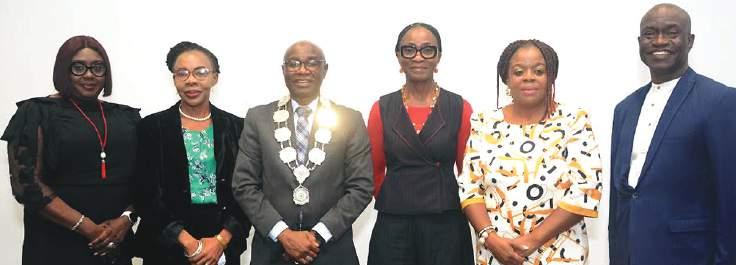
L–R: Registrar/Chief Executive of Chartered Institute of Personnel Management, Ms. Oluwatoyin Naiwo; Vice President of CIPM, Mrs. Chidinma Obiejesi; President and Chairman of the Governing Council of CIPM, Mallam Ahmed Ladan Gobir; Guest Speaker, Mrs. Oyeyimika Adeboye; National Treasurer of CIPM, Mrs. Ogochukwu Egbunonu; and immediate past President of CIPM, Mr. Olusegun Mojeed, at the CEO/CHRO/HRD Forum organised CIPM in Lagos…recently
Segun James Lagos State Governor, Babajide Sanwo-Olu, has called on the National Assembly to be fair to the state by enlisting the 37 Local Council Development Areas and granting the state a special status in the constitution.
Sanwo-Olu made the statement at the South-West Zonal Public Hearing of the House of Representatives Committee on the Review of the 1999 Constitution in Lagos.
Sanwo-Olu, who appreciated the leadership of the National Assembly for holding the public hearing in Lagos, said that Lagos remained an important state in the country.
The governor, represented by his deputy, Dr. Obafemi Hamzat, said it was not fair that the state, which he said carries the burden of many other states, does not
enjoy special status.
Further justifying his call for special status for the state, the governor said that Lagos and Kano States were created in 1967, but that in 1991, Jigawa was carved out of Kano State.
The governor said that Lagos had remained the same with 20 Local Governments, while Kano now has 44 LGs, while Jigawa has 27 LGs, describing the arrangement as unfair. “As a nation, we cannot and we should not continue to deceive ourselves. We must be guided by the principle of inclusiveness, equity and justice.
“It is not about emotion, it is about facts and fairness. Is that fair? Is that right?
“What we are asking is that the 37 Local Council Development Areas we have given birth to since 2000, should be listed in the constitution.
“Can we have a child that is
Firm Reaffirms Commitment to Standardise Services in Nigeria
FIFY Technical Services has reaffirmed its commitment to bridge the technical skills gap and standardise the technical service industry in Nigeria with 24 hours a 24-hour operation in Lagos.
Speaking at a media parley in Lagos, Founding Director, FIFY Technical Services, Mr. Tokunboh Akindele, explained that the firm is entrenching standardisation and professionalism in the technical service industry by leveraging a system of transparency, strong data governance, technical expertise, product insurance, robust security verification and timely response to ad- dress mechanical, electrical and plumbing (MEP) problems Nigerians may encounter.
With 50 certified technicians, two operational shifts, a standard company hostel, five standby shuttle services, and 18 months of service, Akindele stated that the firm
targets bringing the Nigerian public up to speed with global best practices.
“Everybody has a plumber who is never available. Your generator goes off at 9 p.m., and people just accept that it will be fixed tomorrow. FIFY ensures it can be fixed today, even at 2 a.m.
“We are not just creating a business that has 24/7 availability, we also ensure that technical excellence is the foundation of the institution.
“We source our staff from training schools, and we have supervisors who have about 20 years of industry experience with certified engineers who lead all our teams to ensure that everything done meets our standard operating procedure,” he said.
With FIFY Technical Services currently operational in Ikoyi, Victoria Island, Oniru, and Lekki Phase 1, Lagos, its Directors, Ms. Kemi Dallas and Mr. Abiodun Thomas, shared that plans are underway to expand into other markets as the need arises.
25 years old and without giving them birth certificate?. Let us get our birth certificates.
“This issue of special status for Lagos is not a unique thing to Lagos, it is the same in Brazil, Indonesia and others.
“When you move your capital from a place to another, you do not abandon where you left. For
me, as a nation, let us be fair to Lagos and everybody,” he said.
He said that the state contested the population figures of the Nigeria Population Commission in the 2006 census in 19 local government areas at the tribunal.
“The tribunal agreed with us on what we raised in 18 local government areas. Let us even
agree with the figure, Alimosho LGA in 2006 was given the population of 1,371,000 while Bayelsa has a population of 1.67 million,” he added.
Sanwo-Olu highlighted the need for genuine federalism and devolution of powers, state police, electoral and judicial reforms, special seat for women, among others.
Sanwo-Olu added: “We must ensure the security and welfare of our citizens, including crucial discussions around the creation of state police.
“Just for the simplicity of it, state policing is not about semantics; it is about protection of the people. So, let us have it.”
The immediate past National Chairman of the All Progressives Congress (APC), Dr. Abdullahi Ganduje, has given reasons for his unavoidable absence during President Bola Tinubu’s condolence visit to Kano on Friday, stating
that it was due to a pre-scheduled personal engagement in London.
The personal engagement commenced five days after Ganduje resigned from the party’s leadership. A former Chief of Staff to the APC National Chairman, Malam Muhammad Garba, clarified a statement yesterday.
He said contrary to media speculations suggesting that Ganduje was either unwell or deliberately excluded from the President’s entourage, the former National Chairman had travelled to London for a personal engagement that had been arranged well in advance.
Garba explained that the visit by President Tinubu, which was aimed at paying condolences to the family of the late business mogul, Alhaji Aminu Dantata, was communicated to Ganduje, “but unfortunately, despite frantic efforts to reschedule his flight and itinerary, the logistics made it impossible for him to return in time.”
Blessing Ibunge in Port Harcourt
The Nigerian Content Development and Monitoring Board (NCDMB) has commended Solewant Group for unveiling an ultra-modern Pipe Bend Coating Plant in Rivers State.
The Executive Secretary of NCDMB, Mr. Felix Ogbe, made the commendation during the commissioning of the Pipe Bend Mult-Layer Coating Plant, held at the
company’s facility in Alode, Eleme Local Government Area of Rivers State.
Represented by the General Manager, Human Capacity Development, NCDMB, Esueme Kikile, Ogbe noted that Solewant Group has largely contributed in boosting the oil and gas industry. He said with the new project, the company has become a major service company in pipe coating, pipe manufacturing and pipe assembling in the country.
Speaking on the benefit of
promoting local content in the industry, Ogbe said “NCDMB is encouraged by this action, because at NCDMB our mandate is very clear, to build the capacities of Nigerian people and Nigerian companies to participate actively in the oil and gas industry.
“So, what Solewant has done today is just a manifestation of NCDMB’s continuous campaign to invest locally in Nigeria, to ensure that local companies have opportunities to play in the areas
where international companies are playing”, he added.
On his part, the Chairman of PETAN, Mr Wole Ogunsanya, said the initiative will massively impact on the oil and gas industry, as it helps to stop all forms of leakages, dust, and loss of crude and gas.
Ogunsanya who was represented by the Chairman of GGI International Nigeria Limited, Dr Innocent Akuvue, noted that the benefit of the plant to the country is massive.
Globacom’s social responsibility arm, Glo Foundation, on Thursday in Lagos held a graduation ceremony for the first set of participants in its Skillbridge training programme.
The Glo Skillbridge programme is Glo Foundation’s skill acquisition initiative to empower Nigerians with creative-technical skills to enable them to broaden their horizon and create other streams of income for themselves.
For the graduation cohort, drawn from the crop of Lagos Waste Management Authority (LAWMA) street sweepers across the state, their lives will never remain the same as they have been given the opportunity to partake in life-transforming trainings bankrolled by Glo Foundation.
Welcoming guests and the beneficiaries of the training, Jumobi Mofe-Damijo, Head of CSR at Globacom, observed that
the hard work and dedication of the participants to training had been truly inspiring. “They have provided a strong feedback to us that investing in our community, and creating opportunities for the staff of LAWMA is a great way to give back to society.”
She observed that “completing this creative-technical skills training programme is a significant milestone,” and expressed the commendation of Globacom to each
of the trainees for their dedication and hard work all through the training period.
“We know that this training has given you the tools and knowledge to succeed, and we are excitedly looking forward to seeing what you accomplish beyond today in order to open more opportunities for yourselves to have more sources of income to cater for yourselves and your loved ones”, she added.
Africa, in the strategic calculations of the more developed countries, is a dumping ground for their toxic wastes and e-wastes. Africans themselves do not see this as a source of their socio-political and economic setbacks. Right from the time of general accession of African countries into national sovereignty in the 1960s, the use of Africa for development of Europe was raised. Africa was and is still seen by Europeans as a source of raw materials for their development. Nigeria, under the military regime of General Yakubu Gowon as Head of State and Dr Okoi Arikpo as Commissioner for ExternalAffairs, objected made it clear that under no circumstances would Nigeria accept the exclusive use of Africa as a source of raw materials for the development of Europe and to the detriment of Africa. However, crises and conflicts are frequently aided and abetted by the developed countries to ensure the procurement of resource materials and friendly governments in power. Any opposition to this policy stand is always dealt with manu militari.
The people of Africa themselves do not help the matter by encouraging Europeanisation of their lifestyles. What is referred to as ‘Tokunbo’ in Nigeria, that is, second-hand or third-hand imported goods, is not peculiar to Nigeria. More noted here are Tokunbo vehicles and Tokunbo hairs for ladies. Most shamefully, African women buy imported second hand clothes, hairs, shoes. They are wrapped up in the glory of Tokunbo outfits and cars. This shameful pride has lent support to the advanced countries in making Africa a dumping ground for their unwanted wastes: Tokunbo cars and vehicle spare parts, e-wastes and toxic wastes. Most unfortunately, however, criminally human wastes have now been added with the cases of Rwanda and Eswatini.
Africa as Dumping Site forToxic and E-Wastes
Africa was the testing ground for the three atomic bombs carried out in 1960 by the Republic of France. The testing took place in February, April, and December 1960 in the Reggane area of the Sahara Desert. Nigeria complained bitterly against the French tests through Great Britain, the then colonial master. Nigeria feared the implications of radioactive effects on the people and noted that the wind might be polluted by radioactivity and would be blowing southwardly. The protests were to no avail as France argued that whatever radioactive effects there might be could not reach the habitat people lived in. The disregard for Nigeria’s protests led to rupture of their diplomatic ties on 5 January 1961. The rupture was largely influenced by the thinking that if there would be no harmful radioactive effects, why were the tests not carried out somewhere else in Europe? There was no answer to the question.
Without jot of doubt, the genesis of Africa as a dumping ground for unwanted militaro-economic activities in Europe is traceable to the French atomic bomb tests in 1960. Since then, Africa has been a dumping ground for two main types of European wastes: material and human wastes. As regards material wastes, they are essentially, on the one hand, the toxic wastes (chemical wastes, radioactive wastes exposure to which there can be health hazards such as respiratory issues, birth defects, eye infections; contamination of soil and water and general environmental degradation), and, on the other hands, e-wastes which can be household or industrial in character and origin.
E-waste is considered one of the fastest-growing waste streams in the world and a silent killer in West Africa, to borrow the words of https://theconversation.com. It is very problematic because every e-waste contains lead, mercury, cadmium, and bromated flame retardants all of which are very harzardous. In the same vein, toxic waste refers to any hazardous material that can be, found in solids, liquids, and gases. Toxic waste is not only unwanted but also has the potential to harm living organisms if inhaled, ingested, or absorbed through the skin. Consequently, both e-waste and toxic waste are dangerous to human life in whichever way it is looked at. If this is so, are Africans ignorant of this fact?
What is problematic and most unfortunate is thatAfrican people

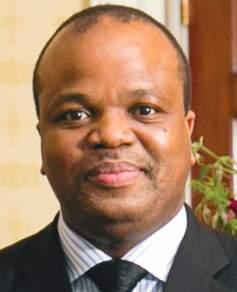
often underscore the monetary aspect or financial profit and consciously neglect the human impact of toxic wastes, particularly on their health. For instance, it is on record that Ghana generates about US$100 million every year from levies collected from importers of e-wastes. In Nigeria, about 100,000 people engaged in the informal e-waste business. In fact, the conversation.com has clearly shown how Africa is being exploited as Africans have eyes that can no longer see, ears that cannot hear, and life that is hardly thought-provoking anymore. As noted by the converesation.com. ‘in 2006 Trafigura, a Netherlands-based multinational oil trading company, didn’t want to pay the EUR500,000 (about $620,000) to treat and dispose of its toxic waste in the Netherlands. And so it approached an Ivoirian contractor to dispose of over 500,000 litres of toxic waste. They paid the Ivoirian sub-contractor in Abidjan EUR18,500 (about US$22,000). The waste was disposed of at over 12 different locations around Abidjan. They claimed the material was non-toxic, hence no need for treatment.’
Many questions cannot but be raised from this quotation: why is the cost of disposal of toxic wastes too exorbitant for the Trafigura? Why did Trafigura refuse to pay the demanded EUR500,000 for the waste disposal? Why the choice of Africa, and particularly why the choice of the Côte d’Ivoire? Why are other regions of the world not considered for waste disposal? Why is the focus always on Africa as a dumping ground? How
Rwanda and Eswatini can accommodate unwanted criminals, illegal migrants, and refugees from any country of the world, based on their sovereign rights. The right, however, becomes a noisome problem if both countries are Member States of the African Union which has pledged to collectively defend Africa, speak with one voice, and also promote the resolution of African problems by African people. Comparatively, many people believe that President Donald Trump is a reckless and senseless leader considering his foreign policy attitudes and behaviours. I used to belong to people who see him as a disaster. With his deportation of five people, convicted for murder, rape and other crimes, to Eswatini, I am no longer left in any shadow of doubt that President Trump knows what he wants in international relations, US hegemony by use of force and manu militari. To believe that he is wrong is to also suggest that the majority of Americans that voted him in as US president are also wrong. They are not wrong. They only have a new vision. It is African leaders that are wrong. As international relations is now fraught with attitudinal insanity, only an insane leader can accept the use of his country as a dumping ground for unwanted criminals elsewhere, especially when the deportees are not his nationals. If African leaders accept to be used to undermine Africa’s dignity of purpose, there is no need for any African Union anymore. In fact, the 1810 principle of uti possidetis should be completely jettisoned to allow for a complete redrawing of the international borders of all African countries. It is by so doing that Africa can truly develop
do we explain the cheap cost of disposing the toxic waste in Africa? Can there be any waste disposal without the complicity of Africans? More than 100,000 Ivoirians were sick and 15 of them eventually died as a result of the radioactive effects of the waste which were fraudulently presented by the local sub-contractor as not dangerous. Are the dumping sites of the toxic wastes free from contamination as of today?
And true enough, the Government of the Côte d’Ivoire was compelled, not only to make the Trafigura pay a reparation of CFA95 billion (US$200 million), for the clean-up, but also to compensate the victims. The problem here is not simply the payment of reparation but the unaddressed problem of Africans being the first problem of Africa, of being the first impediment to the implementation of any continental decision. African people make the objective of evolving an African solution to Africa’s problem very difficult. They facilitate foreign exploitation and degradation of Africa and its people.
For example, what the exporters of wastes to Africa do is to flout obligations created by international conventions by disguising toxic waste as not harmful and e-waste as re-usable electronics when exporting them to West and Central Africa. In the words of Ifesinachi Okafor-Yarwood of the University of St Andrews and Ibukun J. Adewumi of the University of Wollongong, ‘Western companies and businesses (primarily those in Europe and the US) target countries in the Gulf of Guinea (that is, Nigeria, Ghana, and Cote d’Ivoire), as a dump for their toxic waste. This, despite the knowledge of the physiological and environmental effects of this waste. These African countries do not have the facilities to enable the safe disposal of hazardous and toxic waste.’ In spite of the lack of facilities, about 500 container loads of about 500,000 pieces of used electronic devices, most of which are no longer reusable, enter Nigeria’s port from Europe, the US and Asia. The e-wastes necessarily pollute the environment because they are not well recycled contrarily to the requirements of many international conventions.
There is, for instance, the Basel Convention on the Control of Transboundary Movements of Hazardous Wastes and their Disposal, as well as the Rotterdam and Stockholm Conventions. The Basel Convention only restricts and controls transboundary movement of hazardous wastes for disposal. But more interestingly, there is the Bamako Convention against illegal dumping of hazardous wastes in Africa. Its declared objectives are to prohibit the import of all hazardous and radioactive wastes into Africa for whatever reasons. The objective is also to minimise and control transboundary movement of hazardous wastes withAfrica, as well as prohibit all ocean and inland water dumping or incineration of hazardous wastes.
If the main objective of the Bamako Convention is to prevent the dumping of electronic and toxic wastes on African soil, how do we explain the fact that Nigeria signed the Bamako Convention in 1988, but is yet to ratify it, not to talk about domestication of it? There was also the issue of the more than 10,000 barrels of toxic waste from Italy, dumped in Koko, a small fishing village in Nigeria, in June 1988. By that time, Nigeria did not have relevant regulations to address the problem until the adoption of the RA 6969 Toxic Substances and Hazardous and Nuclear Waste Control Act of 1990.
What about the August 2006 toxic waste dumping by Probo Koala, a Panama-registered ship, chartered by Trafigura, a Singaporean-based oil and commodity company, in the Côte d’Ivoire? The local sub-contractor handling wastes was a company called Tommy. Without any iota of doubt, the Ivoirian government failed in its state responsibility to prevent the dumping of toxic wastes on its soil. The African Court on Human, and People’s Rights not only raised the international and state responsibility of the Ivoirian government, but also the need for its corporate accountability for not preventing the incident. Whatever is the case, e-waste and toxic waste are no more the critical issues but the new dimensions of human waste dumping in Africa.
For us in this column, human beings, for various reasons, are no longer better than e-wastes or toxic wastes, simply because the powerful countries and their leaders equate human beings with them, and therefore not deserving or eligible to live among the peoples in such powerful countries or on their sovereign territory. This issue of not deserving or not being eligible to reside in the United Kingdom and the United States, for examples, arises from alleged offences of immigration and claims of right of establishment. When people engage in infractions, they are kept in prisons in the country of the infraction. When the country of infraction is no longer feeling comfortable to house the criminals and is looking for another home for them in a third country whose nationality the criminals do not have, then there is the need to engage in more critical thinking.
At the level of the United Kingdom, for instance, there are some people seeking the status of a refugee in the UK but the British Government has not been favourably disposed to the asylum seekers, hence the need to find alternative places. The British came up with what is called the Rwanda Asylum Plan, a short expression for the UK and Rwanda Migration and Economic Development Partnership.
With the Nigerian National Petroleum Company Limited’s refineries bearing marks of failure, waste, corruption, and deceit for many years despite whopping financial investments on TurnAround Maintenance, Africa’s richest man, Aliko Dangote, has advocated the sale of the four facilities in Port Harcourt, Warri, and Kaduna, Peter Uzoho reports

Penultimate week, the sale of the four refineries belonging to the Nigerian National Petroleum Company limited (NNPC) again came to the front-burner when the President/Chief Executive of Dangote Industries Limited, Alhaji Aliko Dangote, stressed the need for the offloading of the facilities. Dangote hinged his call on the huge financial waste associated with the refineries located in Port Harcourt, Warri, and Kaduna, with a combined 450,000 barrels per day (bpd) nameplate processing capacity.
For many years, the four refineries have failed to add value to the company and country as monies were being wasted on their TurnAround Maintenance (TAM), without positive result. The idle employees at these refineries continue to earn fat salaries, enjoy promotion and all sorts of allowances and benefits that are meant for active workers of an organisation.
The non-functionality of the NNPC refineries plunged Nigeria into becoming a net importer of petroleum products for decades, especially petrol, with huge subsidy payments by the government, and high exposure of the national oil company to debts to foreign oil traders.
The unpalatable story about NNPC and its refineries has always fuelled the call for its sale to end the continuous waste and corruption associated with the facilities.
The federal government, through the NNPC, recently embarked on about $3 billion rehabilitation programme aimed at reviving the country’s ailing refineries in Port Harcourt, Warri, and Kaduna.
Despite the substantial investment, the process has faced significant hurdles, including funding delays, technical setbacks, and complications arising from outdated infrastructure.
In late November 2024, the Port Harcourt refinery was recommissioned following a $1.5 billion overhaul, initially touted to run at 70 per cent capacity, but the refinery continued to struggle until it was shut down in May 2025.
Similarly, information on the Warri refinery remains hazy, but it was said to have resumed operations at 60 per cent capacity on December 30, 2024, following an $897.6 million rehabilitation.
This plant is believed to be inactive, following a shutdown earlier in the year, due to a
critical fault in the Crude Distillation Unit (CDU) main heater—a major safety risk that forced a complete halt in processing. The NNPC has said work is ongoing on the Kaduna refinery.
Dangote’s Push for Sale of NNPC Refineries
Dangote is somebody who now understands what it takes to build, maintain, and run a petroleum refinery efficiently, profitably, and sustainably, having successfully built and put to operation a 650,000 barrels per day refinery.
He has doubted the possibility of NNPC’s Port Harcourt, Warri, and Kaduna refineries functioning again.
Addressing members of the Global CEO Africa from the Lagos Business School, who paid a visit to the $20 billion Dangote refinery penultimate week, the billionaire investor put the cumulative spending on rehabilitating the four NNPC refineries so far at $18 billion without any good result.
Dangote likened the turnaround maintenance of the refineries by the NNPC to trying to modernise a car built 40 years ago, when technology has advanced.
According to Dangote, the 650,000-capacity refinery he built after the government of late Umar Yar’Adua aborted his acquisition of the government refineries now has over 50 per cent of its output dedicated to Premium Motor Spirit (petrol), saying that even government refineries committed just 22 per cent of their production to petrol.
Dangote recalled how he and his team had to return the nation’s refineries to Yar’adua, a few months after former President Olusegun Obasanjo left office in 2007.
According to him, the former managers of the refinery had told Yar’Adua that Obasanjo sold the facilities below their costs as a parting gift to him and his colleagues.
“The refineries that we bought before, which were owned by Nigeria, were doing about 22 per cent of PMS. We bought the refineries in January 2007. Then we had to return them to the government because there was a change of government. And the Managing Director at that time convinced Yar’Adua that the refineries would work.
“They said they just gave them to us as a parting gift or so. And as of today, they have spent about $18billion on those refineries, and they are still not working. And I don’t think, and
I doubt very much if they will work,” he said.
“(The turnaround maintenance) is like you trying to modernise a car that was built 40 years ago, when technology and everything have changed. Even if you change the engine, the body will not be able to take the shock of that new technology engine,” he stated.
NNPC Hints at Selling Refineries
With much being expected from the current NNPC leadership populated by competent, experienced, and tested and trusted oil and gas professionals, the company cannot afford to disappoint Nigerians in terms of delivery.
Perhaps aligning with the position of Dangote, NNPC has said the sale of the country’s crude oil refineries was not ‘off the table’, disclosing that the rehabilitation of the facilities had become more complex than expected.
The Group Chief Executive Officer of the national oil company, Bayo Ojulari, stated this during an interview with Bloomberg at the just concluded 9th OPEC International Seminar in Vienna, Austria, a day after Dangote advanced his view on the state-owned refineries.
Ojulari revealed that the technologies imported to fix the facilities are largely misaligned with the refineries as a result of their old age.
He noted that although a lot of investment had been made in revamping the refineries, the issue has become challenging.
Ojulari said: “So our refineries, we made quite a lot of investment over the last several years and brought in a lot of technologies. We’ve been challenged. Some of those technologies have not worked as we expected so far. But also, as you know, when you’re refining (rehabilitating) a very old refinery that has been abandoned for some time, what we’re finding is that it’s becoming a little bit more complicated. So we’re reviewing all our refinery strategies now.
“We hope that before the end of the year, we’ll be able to conclude that review. That review may lead us to do things slightly differently. But what we’re seeing is that sale is not out of the question. All the options are on the table, to be frank. But that decision will be based on the outcome of the reviews we’re doing now.”
IPMAN Back Sale of Refineries
Throwing his members’ support for the sale of the NNPC refineries, the National Publicity Secretary of the Independent Petroleum Marketers Association of Nigeria (IPMAN),
Chinedu Ukadike, described the refineries as a burden on public finances.
Ukadike argued that the billions of dollars already sunk into turnaround maintenance efforts had yielded no tangible results, noting that IPMAN had earlier called for the declaration of a state of emergency in the refining sector, which is long overdue.
“For me, NNPCL is a private investment owned by the federal government, and it has been there for decades, supplying the needs of Nigerians at times. But in the last 15 years, it hasn’t been operational. The running cost is even higher than what it earns in revenue or production.
“So it is imperative that the government looks at this and chart the best way forward, either to sell off the refinery or to repair it. But we have found out that, for a long time now, repairs are not imminent.
“And billions of naira have been sunk to do a turnaround maintenance. So whatever the government can do, to ensure that the property is being utilised. Like they did with Indorama, it is acceptable for us. So that it can drive competition in the industry”, Ukadike said.
He, however, cautioned against selling the refineries as scrap,” adding, “We have advised before that the President should declare a state of emergency in the refining sector. That would yield positive results.”
Don Warns against Hasty Sale of Refineries
In his intervention on the sale of the four refineries, a renowned petroleum economist, Prof. Wumi Iledare, has cautioned against any hasty or sentiment-driven sale of Nigeria’s state-owned refineries.
Iledare urged the federal government to adopt a strategic and transparent approach in line with the Petroleum Industry Act (PIA) 2021.
Iledare stressed that although NNPC Limited, now operating as a commercial entity under the PIA, possesses the legal right to dispose of its assets, the decision to sell the country’s refineries should be guided by long-term national interest rather than immediate gains.
“The Port Harcourt, Warri, and Kaduna refineries have consistently underperformed,” he acknowledged. “However, the core issue is not state ownership but inefficiency caused by poor governance and institutional weaknesses.”
Recently, the European Union’s Special Representative for the Sahel, Joao Cravinho, visited Nigeria where he talked about strengthening collaboration with the country on regional security, development and governance, as part of a reflection on EU relations with the Sahel. He also emphasised Nigeria’s pivotal role in the region, and the need to understand local perspectives and foster joint efforts to tackle insecurity, youth marginalisation and underdevelopment. Cravinho told THISDAY he is anxiously looking forward to the upcoming ministerial-level engagements that will help shape a deeper and more responsive partnership between the EU and Nigeria. Excerpts:
yourExcellency, letusstart byknowingwhatbrings youtoNigeria.Howthis visit aligns with the EU borderstrategypriorities in the Sahel and West Africa?
Well, firstly, Nigeria was my first port of call when I took office, which was on the 1st of December, and I came to Abuja early December for the Economic Community of West African States (ECOWAS) Summit. Therefore, Nigeria was my first place to stop. However, at the time, it was not possible to engage in a deeper manner with the Nigerian authorities on the challenges of the Sahel. Since then, I have visited a number of countries, particularly those of the Central Sahel, Burkina Faso, Mali and Niger. It was time to come back and speak with Nigeria - the country that is the big giant of the region.
Moreover, I think Nigeria has a central role to play in this wide region of West Africa, including the Sahel. Getting the assessment of the Nigerian authorities on how they see the situation is very important.
At the moment I am working with colleagues in Brussels and with Member States of the European Union to reflect upon a new approach to the Sahel. This requires understanding the views of the main actors of the region. Therefore, what brings me to Nigeria is, really, a desire firstly to understand Nigerian perspectives and secondly to establish in which areas we can work with Nigeria in terms of our common interests in the Sahel region.
InwhatwaysdoyouseeEU-Nigeriarelationscontributingtoregionalstability,not onlywithinNigeriabutacrosstheSahel, inthecontextofsecurity,governanceand development?
Exactly. I think those are the areas where we can work together: the European Union and Nigeria in order to promote regional stability. Insecurity in the Central Sahel is deeply worrying for us in Europe. Nigeria and other coastal countries are directly affected. We shall dry up the sources of recruitment for terrorist groups, armed groups and organised criminal groups by creating conditions for people to have alternative options in life. We need to work together on development. We need to work together on security. We are currently operating on a fairly small scale but are willing to scale up
with the four Gulf of Guinea coastal countries, Togo, Benin, Ghana and Ivory Coast. There is also an ongoing discussion with Nigeria about ways we can work together to help Nigeria confront its security challenges.
With Nigeria being a democratic country that has not had military rule since the 1990s and a country so influential in this region, we have every interest in developing deeper collaboration in development and security.
Earlier you talked about a new approach to doing things. I do not knowwhetheryouareawareofthe increasingdiscoursearoundAfrican solutionstoAfricanproblems.From your point of view, how is the EU working to support locally owned peace-buildinginitiativesandgovernanceframeworksratherthanimposingexternalmodelsofengagement?
Well, firstly, I think you are absolutely right that it does not make sense to impose external models. I would point out, though, that when you talk of African solutions to African problems, not all problems are African. We have problems resulting from insecurity and organised criminality, also in Nigeria, that affect Europe, such as drug smuggling with the European market. So we have problems that are ours and that we need to address them with our African counterparts. Nevertheless, we are not arriving here with a recipe book of solutions. We come with open ears, working out how we can align with our concerns and those of African populations and governments.
Couldyoubespecificaboutsome interventionstheEUisundertakingto addresstherootcausesofinsecurity andunderdevelopmentintheSahel, andhowNigeriafitsintoyourstrategic plan?
In reflecting on our new approach, we focus on issues that align with our interests. When I say our interests, there is no contradiction with those of Nigeria or other countries such as Mali, because we share an interest in stability and security in the region. We seek to work even with governments we disagree with - those that arrived in
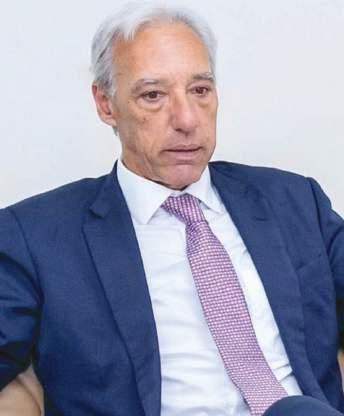
• Cravinho
power through unconstitutional means - by saying: we will not endorse how you came to power but we want your people to live in peace and prosperity and remain in their countries. A good example of EU support is the Ouagadougou-Abidjan corridor.
Burkina Faso and Côte d’Ivoire are not on speaking terms; when they speak, they use harsh language. What we are prepared to invest in is something of deep interest to the populations of both countries - the corridor.
Around 40 per cent of Burkina Faso’s population lives in that region. Investing in infrastructure there helps regional integration, enables people to bring their products to market, grants access to basic services and creates minimal levels of human security that offer prospects for the future. We are working with African Development Bank and Islamic Development Bank on this significant investment.
Lastly,lookingahead,howcanNigeria and the EU deepen their partnership to address immediate security concerns and build long-term resilience through inclusivegovernance,climateadaptation andregionalintegration?
You have touched on three points at the heart of the EU’s concerns and are also very important for Nigeria. I had a very interesting meeting with Foreign Minister Yusuf Tuggar about these issues. Climate resilience is a global reality, but in the Sahel climate change is advancing rapidly, impacting mobility and livelihoods. There is much we can do to support local authorities in improving resilience. We are ready to bring that to the table with Nigeria and other regional countries. On governance, Nigeria and the EU share democratic values. All democracies
are imperfect and can deepen. Nigeria is interested in strengthening local governance, and we are fully available to assist. Regional integration is the third major theme. The EU has relations with all West African countries, but with Nigeria, we engage a nation whose influence extends across a vast region. That gives us a strong incentive to work more closely with Nigeria. Later this year, we hope to convene a ministerial meeting between Nigeria’s Foreign Minister Mr. Yusuf Tuggar and our High Representative for Foreign Affairs, Ms Kaja Kallas to address these topics and initiate specialised follow-up to make our relationship more productive and responsive to current challenges.
Isthereanythingyouwouldliketoadd?
As the EU Special Representative for the Sahel, one of my primary concerns is the deteriorating security situation, which is why our focus must extend beyond purely military solutions. Military action is part of the answer but cannot address underlying issues alone. We need an integrated approach that looks at human security. Why are young men being drafted into jihadist organisations? It is not because of religious fervour but because they lack alternatives. We must focus on creating those alternatives, especially for young people.
In Africa, 65 per cent of the population is under 25, and in the Sahel 70 per cent is under 25 - the youngest population in the world. It is tragic to see so many lives wasted when these youths do not have the chance to realise their potential and instead find themselves on the back of a motorbike with a Kalashnikov. We all have a duty to do our utmost to prevent that.
www.thisdaylive.com

THE KING WHO MADE US PROUD BOBO OMOTAYO pays tribute to Oba Sikiru Kayode Adetona, the Awujale of Ijebuland
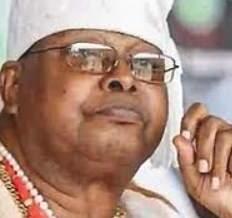
See Page 18 VICTOR UMEH AND NIGERIA’S CENSUS RECKONING Nigeria must summon the courage to count its people reasonably, honestly, and regularly, writes PAT ONUKWULI
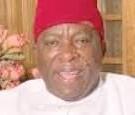
See Page 18
EDITORIAL REFINERIES AND THE OPTION TO SELL

opinion@thisdaylive.com

Peter Obi, currently the main issue in Nigerian politics, is 64 years yesterday. It says a lot that one person in a country of 200 million others can encapsulate through their worldview the hopes and aspirations of the masses across all age groups, ethnic divisions, religious beliefs, and political allegiances. He manages to attract and repel with remarkable calmness the polarities of love and rejection from vast segments of the nation, displaying exceptional bravery and supreme confidence as he extends this invitation to his fellow countrymen and women: “Please, come with me, I know the destination of our national salvation, and I have meticulously charted a sure course to it.”
Decades ago, there was another politician in this country who believed in ideas, in planning, and in directly facing challenges. He always aimed to identify the core issues, not for fame, but to find ways of mastering them. As a Premier, he ran a government that invested heavily in education, building a university, a pioneering television station, and housing estates for his people. Yet not one of his achievements was named after him. In a moment of inspiration, General Ibrahim Babangida, as Military President, sent the man a birthday message in which he declared him “the main issue” in Nigerian politics. That man was, of course, Chief Obafemi Awolowo. There were a few others in Awo’s mould, including Dr. M. I. Okpara, who, as Premier of Eastern Nigeria, oversaw the fastest-growing economy in the world. Dr. Okpara rapidly industrialised Eastern Nigeria and escalated educational growth from kindergarten to the tertiary level. Yet, he named none of his achievements after himself. By the time he passed in 1984, he did not have a house to his name.
Between Awo and Okpara, there is a common set of traits that are evident in Peter Obi. Neither valued extravagance nor engaged in chasing shadows. Neither made grand claims of unearned academic laurels, dubious ancestry, or unverified identities. Neither would have entertained, even for a millisecond, the inane thought of riding in a 100-vehicle cavalcade with sirens and horns blaring through dirty, potholed streets to showcase their political stature. To this practical and realistic duo, who harboured neither illusions nor pretensions, being grounded in thought and positive actions was the guiding philosophy.
Peter Obi is cast in that mould, which is why, for each of his claims and postulations, he optimistically leaves a challenge: “Go and verify!” As a State Governor, Peter Obi was often in convoys of just a handful of vehicles bearing only officials, security personnel, and pressmen. Well, Awo passed in 1987. Neither he nor Okpara departed with their legacy. Their positive footprints in the sands of time remain with the people they led – a testament to steadfastness and purposefulness. Peter Obi is very much around. So, how would he mark his birthday today? One thing is certain. There would be no parties. Stories abound in this country of folks with undocumented pedigrees and undeclared sources of wealth who hire tourist Caribbean villages in any of Barbuda, the Cayman Islands, Mustique, Eleuthera or Saint Kitts, etc., for the celebration of their
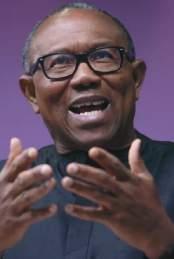
birthdays with bashes crawling with aspiring felons, freeloaders, hangers-on, never-do-wells, assorted parasites, and plenary sycophants. Count Peter Obi out of such bizarrity. He would rather sit alone or with like minds to ruminate and meditate on ways to improve the Nigerian condition.
It is this practice of subjecting Nigeria to constant interrogation that has enabled him to proffer, at every turn, the best steps forward for the country to become meaningful. Baldly, he has repeatedly declared that directing the affairs of a nation should never be left to the devices of drug barons, turncoats, kleptocratic vultures, conceited ignoramuses, and their retinues of “cut it down, whether ripe or not.”
To demonstrate that he wasn’t simply all talk and no action, he contested a presidential election in which he trounced, even in their backyards, self-declared electoral “champions” and political “strategists.” Then the heist came. Who doesn’t know that, just as the shell follows the snail, so does desolation trail plunder? Today, woe is in ascent. The entity, previously in a state of stasis, has degenerated into sepsis.
That is why a coalition has come up. A coalition to determine whether an 11th-hour salvation is feasible in the circumstances of near hopelessness. How does one say no in the face of thunder? No new jobs are being created. The employed are rapidly receiving severance letters. Those clinging precariously to jobs are hardly paid. Of the miserable few that earn at all, the shock is that, in most cases, the take-home pay is barely enough for commuting. There’s no health system worthy of the name. A good percentage of the available drugs are either fake or expired. It bothers them not because, when ill with even an earache or a toothache, they jet off at public expense to the Riviera or somewhere nearby for expert medical attention. When, as sometimes happens, they kick the bucket in alien territory, their remains are crated home, again at public expense. Tell that to the doubly jeopardised septuagenarian afflicted by diabetes and hypertension. Holding tightly to her doctor’s prescription, she rues the insufficient money in
her purse and mutters, “I will buy the diabetes drug and go home. The management of my high blood pressure can wait.” Why should this tragedy of unrelenting proportions be commonplace in an oil-rich country?
How could it be said and repeated that Fulani herdsmen invaded and wiped away 200 lives in one night, with Abuja unable to call the massacre by its name? How can it be the case that Abuja is unable or unwilling to confront, halt, and reverse the bloody effrontery of mass killers prowling across the national vastness with impunity? The dire straits in which the country is trapped are the reason a coalition has been formed to determine whether an 11th-hour salvation from national despondency is attainable. This alliance to overturn dismal political leadership is a frontal attack on injustice. After all, clueless leadership is a gross injustice to the people. There is, therefore, one piece of advice for anyone who would come into equity. Come with clean hands! It would be absurd to confront blatant injustice with a process that is itself unjust.
All other geopolitical zones have produced presidents, some for repeated times. But not the South East. When the 2022 PDP presidential primary election discarded the process that could have addressed the grievous injustice, Peter Obi, on principle, ditched the party and became the Labour Party’s presidential flagbearer, a role in which, with his unwavering army of the Obidients, he stunned the cynics. The coalitionists know, or ought to know, that in treating conjunctivitis, the application of pepper is anathema. If, despite this knowledge, they give him a short shrift, Mr. Peter Obi, the main issue in Nigerian politics today, will look in another direction because nobody will be allowed to use him and the Obidients to boost their political avarice. If Mr. Obi turns his back to the coalition, it will instantly collapse like a pack of cards, and it will become clear to all that the alliance cheerleaders were insincere charlatans livid because power resided other than in their backyard, and not because of the imperative of extirpating a cancerous tumour from the body politic. Will reason and statesmanship ultimately prevail? Or will covetousness and a rabid sense of entitlement press the default button for the sustenance of a decadent status quo?
If, in choosing a presidential flagbearer, the coalition gets its act right, the challenge will shift to the critically patriotic duty of teaching the perpetual perpetrators of electoral corruption that the head is bigger than the body. From all indications, the foreseeable future promises a basketful of news, wholesome and unwelcome, for those who care and others who pretend to be unconcerned. For now, two prayers must end this piece. One, may God deliver the long-suffering peoples of this country who, interminably, are being incessantly and remorselessly raped with a barbed phallus. Two, and for the birthday celebrant: May the Creator of Heaven and Earth keep and lead you in so far as you intend to place a healing balm on the essences of the severely wounded peoples of your fatherland.
Nigeria must summon the courage to count its people reasonably, honestly, and regularly, writes PAT ONUKWULI

In a political landscape often marked by rhetoric and evasive promises, it is rare to hear a voice speak with both clarity and urgency about one of Nigeria’s most critical shortcomings: its refusal to identify itself.
That voice, this time, belongs to Senator Victor Umeh, the Chairman of the Senate Committee on Population. At a recent public unveiling of the 2025 edition of the State of the World Population report in Abuja, Umeh made a plea that every patriotic Nigerian should echo: that the federal government must take urgent steps to conduct a national population and housing census.
It is not the first time such a call has been made. But Umeh’s framing was compelling. He reminded us that Nigeria continues to rely on assumptions about its population size, with estimates ranging from 200 million to 230 million, and no verifiable data to support them.
“These are merely assumptions,” he said. “That’s why conducting a credible national census is non-negotiable.”
He is right. In a 21st-century world defined by data, a country that does not know its population cannot possibly govern effectively. And yet, Nigeria, despite its ambitions of greatness, continues to make policy decisions in the dark, guided by outdated figures and politically convenient myths.
The British physicist Lord Kelvin once said, “If you cannot measure it, you cannot improve it.” That statement captures, with mathematical precision, Nigeria’s national dilemma. Our inability, or refusal, to count ourselves has become a symptom of deeper issues: political insecurity, institutional distrust, and a chronic failure to build a governance system grounded in altruism and truth.
It is easy to blame logistics, funding, or security concerns for Nigeria’s census paralysis. But the real reasons lie elsewhere.
Since independence, censuses have been plagued by controversy, marred by ethnic rivalries, political manipulation, and widespread mistrust. Repeated attempts at accurate headcounts have either been fiercely disputed, quietly abandoned, or reluctantly accepted as political compromises rather than statistical truths.
Thus, at the heart of Nigeria’s reluctance to conduct regular and accurate censuses is a pervasive fear of what the numbers might reveal, as well as the potential reordering of power that those numbers might demand.
Population figures in Nigeria are not neutral data points; they are political tools. Legislative seats, revenue allocations, and federal appointments are all distributed according to population. In such a system, the incentive is not to know the truth but to preserve the fiction.
Heuristic signals, such as school enrolment rates, electricity consumption, mobile phone registrations, birth records from public hospitals, and tax data, tell a far less convenient story.
These indicators suggest that some parts of Nigeria may not be as populous as they claim. Yet the illusion persists, precisely because it sustains entrenched political advantages. Peter Drucker, the influential management thinker, once wrote, “You can’t manage what you don’t measure.”
Nigeria is attempting to do precisely that: manage its economy, plan its infrastructure, combat insecurity, and deliver social services, without a clear understanding of its demographic makeup. The consequences are dire and immediate.
When we don’t know how many school-
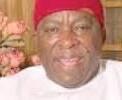
aged children live in a region, we under- or overbuild classrooms. When we guess at the number of elderly citizens or unemployed youth, we misallocate healthcare, pensions, and job creation programmes. Electoral boundaries become skewed, voter registration figures become suspect, and policymaking becomes a game of shadows.
The Nigerian state is not just failing to count; it is failing to care. A census is not simply a technical exercise; it is a moral declaration that every person matters. Counting a population is an act of recognition. It affirms the dignity of the citizen.
As American chemist Linus Pauling once said, “Facts are the air of scientists. Without them, you can never fly.” The same applies to nations. Umeh’s advocacy is significant not just because of his role in the Senate, but because it comes at a time when Nigeria stands at a crossroads.
The 2006 census, the last official count, took place almost two decades ago. Since then, the country has experienced rapid urbanisation, mass migration, insurgencies, and shifting fertility trends. Yet we remain locked into figures that no longer reflect our national reality.
Encouragingly, the call for change is gaining traction. Hon. Okunjimi Odimayo, Chairman of the House Committee on National Population and Identity, has indicated that the Constitution Review Committee is considering institutionalising a fixed interval for conducting censuses, as recommended by the United Nations Population Fund (UNFPA).
Nasir Isah Kwarra, Chairman of the National Population Commission, has emphasised that behind Nigeria’s fertility and demographic shifts lie deeper structural issues, poverty, gender inequality, and lack of reproductive autonomy, which can only be addressed with accurate data.
But even as these voices grow louder, the obstacles remain formidable. Too many vested interests benefit from the status quo. There is a reluctance to embrace a mirror that might reflect inconvenient truths. But that reluctance is ultimately self-defeating. As the ancient Greek philosopher Socrates said, “Know thyself.” It was not merely a call for introspection; it was a principle for all intelligent action.
A country that refuses to know itself cannot serve its people. It cannot govern wisely. It cannot compete globally.
The way forward demands courage, not only from policymakers but from the entire political class. A reliable census will require funding, transparency, and the proper use of technology. Most importantly, it will demand honesty. We must move away from the zero-sum mentality of inflated claims and adopt a governance ethic that prioritises truth over advantage.
Dr. Onukwuli, a legal scholar and public affairs analyst, writes from Bolton, UK. patonukwuli2003@yahoo. co.uk


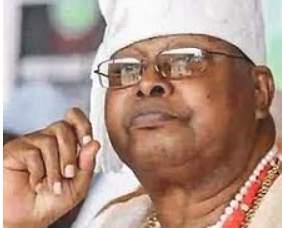
On Saturday, July 13, 2025, a giant left the earth.
His Royal Majesty, Oba (Dr.) Sikiru Kayode Adetona, GCON, the Awujale and Paramount Ruler of Ijebuland, died at the age of 91. For many Nigerians, he was a cultural icon, as one of the country’s longest-reigning monarchs in modern times. For six and a half decades, he served as a living link between ancient tradition and modern progress, capturing the best of both.
But for those of us who are Ijebu, regardless of where we are in the world, he was far more than a historical figure or ceremonial leader. He was our compass. Our anchor. The physical embodiment of everything that made us feel proud, distinct, and at home in our Ijebu identity.
This week, I was reminded that my pride in being Ijebu—the quiet, unwavering patriotism I carry—is deeply ingrained in him. Because Oba Adetona didn’t simply reign. He represented.
He represented dignity. Discipline. Diplomacy. Above all, duty.
My family witnessed this firsthand. My late father, Alhaji Olatunji Omotayo, played an important role in his coronation in 1960. They shared mutual respect, to the point where the King treated my father as if he were an older brother. And when my father died unexpectedly in 1985, Oba Adetona did not vanish. He stood by my mother, offering advice and protection.
Years later, when my mother converted from Islam to Christianity amid personal and social turmoil, he did not shame her. He may have disagreed, but he protected her. Privately. Graciously. Quietly. This is the type of leadership we rarely see.
In 1991, he bestowed upon her the title of Otunba Fidilegboye of Ijebuland. A widow. A mother of seven. Honored not for her connections, but for her personality. The gesture wasn’t just symbolic. It was incredibly affirming for our family.
Even just a decade ago, when my brother Femi invited the King to a small remembrance ceremony for our father, we expected only his blessing. But Oba Adetona defied royal protocol and arrived in person. Kings of his stature do not usually attend these gatherings, but he sat with us in my late father’s compound. He prayed with us. And laid the groundwork for a new Islamic center named after my father.
This was a monarch who knew when to stick to tradition and when to break free from it.
His rule was transformational. He
transformed Ijebuland into a model of community progress, advocating for improved education, infrastructure, and healthcare. He provided intellectual clarity to his leadership. His extensive knowledge of governance, law, and cultural diplomacy put him well ahead of his peers. Even national leaders sought his advice.
And then there’s Ojude Oba.
What began as a religious homage by Ijebu Muslims has evolved into a celebration of Ijebu culture, attracting global attention and reaffirming our place on the map. Under his patronage, it became the one day when all Ijebu sons and daughters from all over the world returned home to honour our common identity. It wasn’t simply a festival. It was a ritual of belonging.
And now he’s gone.
Naturally, there have been debates about his burial. He was laid to rest in his private residence in accordance with Islamic traditions. This has sparked outrage among traditionalists, who believe that monarchs of his stature should be buried in sacred groves designated for royal ancestors. Yoruba cosmology revolves around these groves, which serve as spiritual liminal spaces that connect the visible and invisible worlds. For some, this departure from tradition feels like a rupture. A break in continuity. An affront to the ancestral order.
But I believe Oba Adetona understood what he was doing.
He was never a ruler preoccupied with grandeur. His reign was based on substance, not spectacle. Perhaps he was sending a final message by opting for a simpler end: true kingship is found in how one lives rather than in burial rites. Faith and culture do not always have to clash, and harmony can be found even in contradictions.
He was both a traditionalist and a transformative figure. A guardian of our heritage. A father to his people. A symbol of how dignity can endure even in the midst of noise. His death has left a void in our hearts, as well as a responsibility on our shoulders. To live with the intentionality he exemplified. To preserve our heritage while embracing the future.
We may never see another King like him. But we’re better now — prouder, stronger, and more grounded — because we witnessed this.
May his soul rest in complete peace. May Ijebuland never forget the man who made us proud to be part of his community.

Editor, Editorial Page PETER ISHAKA
Email peter.ishaka@thisdaylive.com
Over the past few decades, several billions of dollars have been spent on the Turn Around Maintenance (TAM) of the nation’s four refineries. Unfortunately, what usually follows such expenditures are stories of waste. The issues with the refineries are not just that they do not produce refined products for Nigeria’s domestic economy, but also that they gulp huge funds as operational expenditures (OPEX). It therefore came as no surprise that the Nigerian National Petroleum Company Limited (NNPCL) is now mulling the idea of selling them. “We’re reviewing all our refinery strategies now. We hope before the end of the year, we’ll be able to conclude that review,” NNPCL Group Chief Executive Officer, Bayo Ojulari, said last week. “But what we’re saying is that sale is not out of the question.”
Our position on the state of the nation’s refineries is clear and has not changed. The refineries have been huge cost centres to the government and country, and we have always argued that they should be handed to credible private entities to restore their full productive capacities. Private businesses are often better managed than government’s. A quick visit to the Port Harcourt refinery and its neighbour, Indorama Eleme Petrochemical Industry, which was privatised in 2006, reinforces this position. If Eleme can be restored to efficiency with private funds and still pay out dividends to the federal government, privatising others should not be a problem.

is, indeed, conducive for all sorts of criminal dealings, whereby national assets could be deliberately devalued and sold to cronies.”
Other stakeholders have expressed similar concerns which the federal government must consider before taking a decision on the way forward. But we support the idea of privatisation. While the rehabilitation of moribund refineries has remained the unrelenting mantra since 1999, it is now clear that we cannot continue to subsidise failure, which the refineries clearly represent, at great national cost. But in doing this, we also strongly insist that competent consultants must be engaged to evaluate the assets of the refineries before a supervisory sale closely monitored by the National Council of Privatisation (NCP) and Bureau of Public Enterprise (BPE) could be undertaken.
While the rehabilitation of moribund refineries has remained the unrelenting mantra since 1999, it is now clear that we cannot continue to subsidise failure, which the refineries clearly represent, at great national cost
SUNDAY NEWSPAPER
editor DAviDSoN iriekpeN
deputy editors FeSTUS AkANBi eJioFor ALike
Managing director eNioLA BeLLo
deputy Managing director iSrAeL iwegBU
chairMan editorial Board oLUSegUN ADeNiYi
For as long as our refineries remain within government’s absolute control, Nigeria will continue to lose value from their existence, scarce financial resources will be wasted on repairs, salaries will be paid to hundreds of workers for doing nothing, and the country’s downstream petroleum sector will remain untapped to move millions out of poverty. So, the choice is now clear: It’s either the refineries are sold to private operators through a privatisation exercise or put into a transparent joint venture ownership and operatorship arrangement with trusted private investors.
However, there are also genuine concerns about the decision to privatise the refineries, especially at this period. The African Democratic Congress (ADC), the new opposition coalition platform for prominent politicians, has demanded a full audit of the refineries, citing recent reports that nearly $18 billion had been spent on their rehabilitation over the years. “This development, coming just months after government officials claimed the Port Harcourt and Warri refineries had resumed partial operations, raises fundamental questions about transparency and policy coherence,” said the ADC National Publicity Secretary and coalition spokesperson, Bolaji Abdullahi, who questioned the timing of declaring the refineries moribund after spending over $2.8 billion on a recent TAM. “Selling off the refineries under the prevailing circumstances
editor nation s capital iYoBoSA UwUgiAreN the oMBudsMan kAYoDe koMoLAFe
THISDAY NEWSPAPERS LIMITED
editor-in-chief/chairMan NDUkA oBAigBeNA
group executive directors eNioLA BeLLo, kAYoDe koMoLAFe, iSrAeL iwegBU divisional directors SHAkA MoMoDU, peTer iwegBU ANTHoNY ogeDeNgBe deputy divisional director oJogUN viCTor DANBoYi snr. associate director eriC oJeH associate director pATriCk eiMiUHi controllers ABiMBoLA TAiwo UCHeNNA DiBiAgwU, NDUkA MoSeri director, printing production CHUkS oNwUDiNJo to send eMail: first name.surname@thisdaylive.com
To ensure that the processes leading to the refineries’ divestment are not interfered with by politics, we strongly recommend that a transparent and fair bidding process independently managed by the BPE, and transaction advisors be adopted while a postprivatisation performance mechanism be set up to review and checkmate likely unwholesome activities. But it makes no sense to continue to waste resources on unproductive refineries.
The reality is that Nigeria is fiscally broke and should spend scarce money wisely. The times we live in demand of governments across the world to be economically prudent. We cannot continue to spend billions of dollars on phony repairs of refineries that are basically unproductive. We need a clear and sensible solution to what has become a cyclical waste of scarce resources.
Letters in response to specific publications in THiSDAY should be brief(150-200 words) and straight to the point. interested readers may send such letters along with their contact details to opinion@thisdaylive.com. we also welcome comments and opinions on topical local, national and international issues provided they are well-written and should also not be longer than (950- 1000 words). They should be sent to opinion@thisdaylive. com along with the email address and phone numbers of the writer
For all it is worth, the coalition converging under the auspices of the African Democratic Congress (ADC) seems bent on shaking up things, which is no bad idea in a country crying out for direction.
As the 2027 elections approach, former political foes are finding common ground just in time. Political alliances are aligning, and calculations are thickening as to who will get what change out of the elections.
For the African Democratic Congress (ADC), the boost has been as welcome as it is unexpected. Improbably, it has become the centerpiece of a coalition desperate to unseat President Bola Ahmed Tinubu. If the presidency and the ruling APC appear concerned, it is because they have been there before but maybe not quite. In 2014, as President Goodluck Ebele Jonathan prepared for another stint in office, the major opposition political parties in Nigeria at the time forged an unlikely alliance.
The result was a historic upset that yielded eight years in power for Muhammadu Buhari. Buhari’s exit from politics in 2023 saw the ascension of Bola Tinubu to continue APC’s hegemomy of political power in Nigeria. While it doesn’t look like the APC is about to relinquish power anytime soon, there is a deep and deepening rumble of discontent among Nigerians. This discontent, dented by its diversity and ferocity, has cut across every corner of Nigeria, touching vast swathes of the country and poses the greatest threat to the current administration.
In 2027, beyond any coalition, beyond any calculation, even beyond any capitulation, it does appear that just as was the case in 2015, Nigerians will stand before the ballot box poised with their votes to register their discontent with those who have held the reins of power in the country for the last decade.
The alliance may be a handful of sore losers and nearly rans who are clearly desperate
to get back into the big time, but it may just present Nigerians with a perfect opportunity to pay back the APC in its coin of betrayal.
It Is bitterly disappointing that the APC is yet to repay the trust reposed in it by Nigerians in 2015. In deed, the way and manner some of those elected on the platform of the party have performed in office shows a mocking disregard for Nigerians and their feelings. In this wise, the 2027 elections promise to be a titanic battle. The politicians now pooling into the coalition may be disgruntled, but they are by no means spent political forces. Many of them are veteran politicians, seasoned in the art of political warfare, who still have their structures in place and vast swaths of supporters who will support them until the death.
Once party primaries begin, the coalition will also experience a swell as a result of more disgruntled politicians leaving their political
parties. This means that the coalition may get some change, especially out of the ruling APC using the same tactics of divide and rule that the APC deployed to wrest power from the PDP in 2015.
Whatever happens, Nigerians deserve a break. The beauty of democracy and elections is in change. The greatest incentive for office holders in a democracy to put the people first while relegating their personal interests comes from the knowledge that the voters can enliven or kill their political careers at the polls.
Given everything that has been said about the APC since the party assumed power in 2015, the time seems ripe for a change. ADC may be the greatest opportunity for that change. Nigeria’s democracy may well depend on it. Ike Willie-Nwobu,
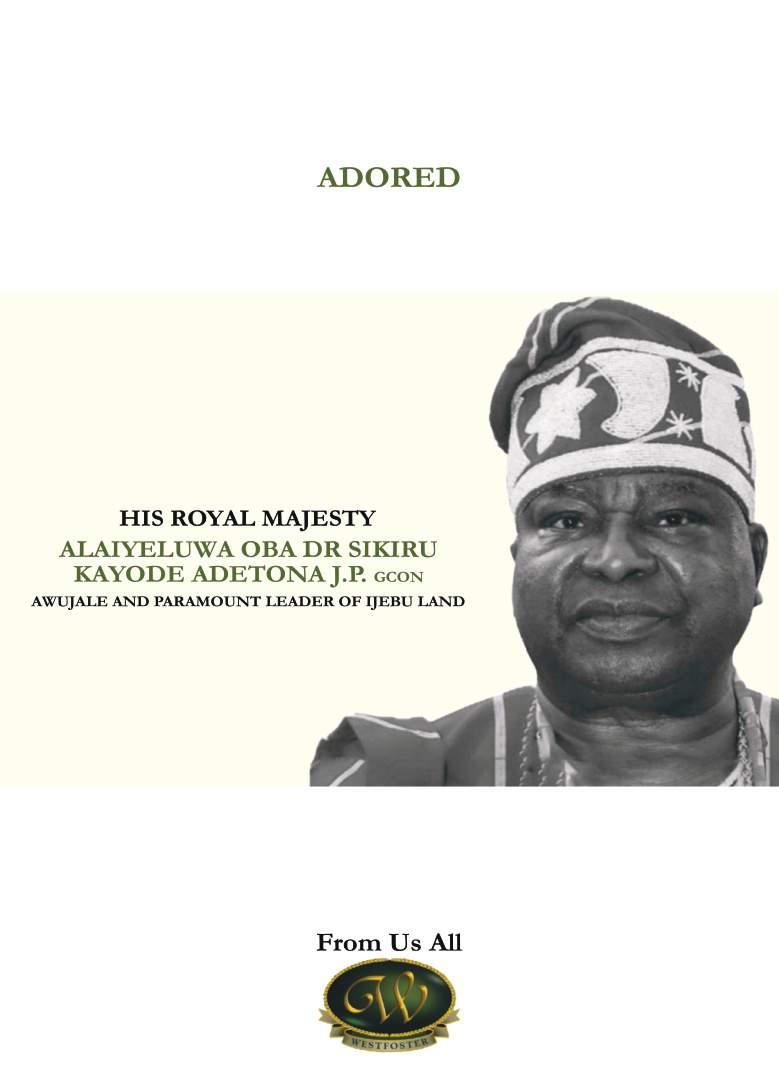
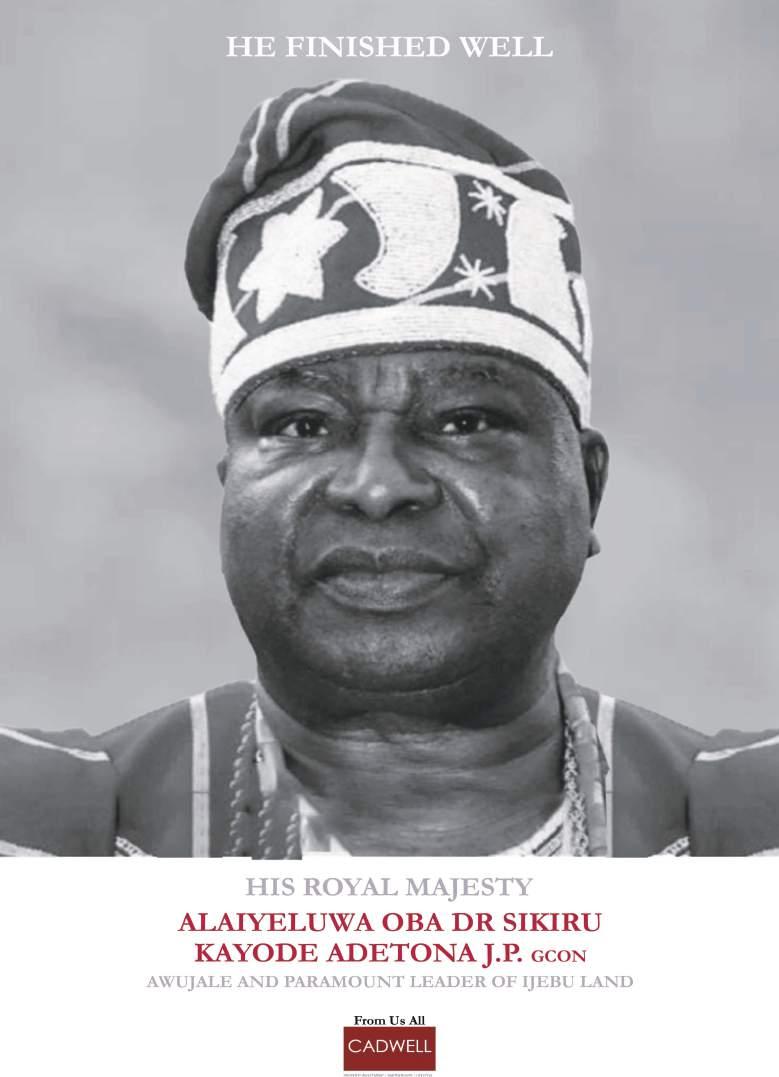
Stories by Vanessa Obioha
Osereme Ebewele Brown is not here to play. And he made this known in his latest collection in Lagos recently. At his showroom tucked away on a quiet street in Lekki, Brown, renowned for his keen eye for detail and highquality fabrics, welcomed guests with a tour of Sainte, his line of luxury urban streetwear.
Designed for the young-at-heart and upwardly mobile, Sainte immediately captures attention. The collection features premium T-shirts in various colours and designs, relaxed pants, shorts, carry-ons, and accessories, all suitable for casual or semi-formal occasions. The cuts are clean, the designs striking, and the overall finish speaks of international standards.
“We sell cleanliness. If it’s not clean, we won’t be in the market,” Brown said during a chat.
On the runway, models wore the collection with ease and elegance. Shorts bearing the line’s signature motifs were paired with matching shirts or simple tees, radiating understated luxury. The colour palette leaned warm—think brown and blue hues—creating a soft, stylish blend. A subtle African soul permeated the pieces, from frills stitched into pants to aso-oke fabrics, combined with T-shirts or layered with jackets. Accessories were far from an afterthought. Fashion-
forward sunglasses, carry-ons, and even suitcases turned the idea of streetwear into a versatile, everyday statement.
“Sainte is our urban line,” he explained. “It suits Lagos as a major metropolis. We’re offering what the people here want.”
With over a decade in the fashion industry, Brown’s journey began with bespoke tailoring. But as the demand for versatile fashion grew, so did his vision. Today, he runs three distinct lines that reflect his diverse clientele. In addition to Sainte, there’s the Ebewele Brown signature label, an ultra-luxury, made-to-measure line crafted exclusively for men of distinction. Every piece is built around the client’s unique taste, using the finest fabrics and rare accessories sourced globally. It’s the brand’s most prestigious expression— where excellence meets exclusivity.
Then there’s Oldwyn, a ready-to-wear collection tailored for the modern man seeking elegance on the go. With over 100 refined styles constantly in rotation, this line offers the ease of walk-in, walk-out fashion— no sacrifice on quality, no compromise on creativity.
In 2023, Brown scaled his production efforts with the launch of the Abuja Garment Factory, a 500-square-meter facility that employs over 50 professionals. It services the Ebewele Brown brands and also provides manufacturing support to other fashion labels. Altogether, the brand and factory now employ about 100 skilled workers, contributing to the growth of local fashion manufacturing.
In December 2024, Brown, who is based in Abuja, expanded to Lagos to better serve
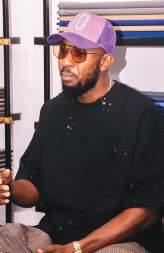
his growing clientele in the city. With a customer base that includes celebrities, political figures, and cultural icons, Brown has built a brand rooted in meticulous craftsmanship, Afrocentric sophistication, and storytelling through fashion.

Organisers of the annual Africa’s Under 40 CEOs Awards and Summit have released the list of 2025 award recipients who were conferred with the prestigious honour in Sandton, Johannesburg, South Africa on Saturday, June 28.
Mayorkings Agency Group, which holds the award ceremony annually, said Africa’s Under 40 CEOs Awards and Summit is a topnotch continental award event and ranking that identifies, showcases, honours and celebrates Young Africans who are mostly influential, established and accomplished young business leaders, under the age of 40.
The recipients are selected across various industries, and have demonstrated commitment to business growth, development, professional excellence and community service as well as philanthropy.
A statement released on Friday by the convener Dr. Temisan O. Louis who was
It seems just like yesterday that Kiki Okewale, the wife of the popular Lagos fertility doctor Babatunde Okewale turned her passion for fashion into a business venture. Recently, the brand marked its 10th anniversary and it has been quite a journey for Okewale.
Before she veered into fashion, Okewale worked in notable PR companies like TPT, owned by the prolific Tokunbo Modupe, although she disclosed that her venture into the field was out of necessity since she had just returned to Nigeria at the time. She would later veer into the
events arm of the company, OO1 Prisme Events Limited, where she lived her passion for event management. But she realised that the job wouldn’t be suitable when she finally settled down, and by 2010, she left the world of PR and event management.
In 2015, she started her fashion business with fabrics and accessories, mainly shoes and bags.
“But it wasn’t even up to one year when people started insisting that we have to make the clothes because we were selling premium fabrics, and they were scared of giving to tailors
recently appointed President of the African Union Youth Council (Clubs) in Abuja reads in part, “The event and rankings aim to encourage and promote young African champions globally as well as bridging a room for networking, collaboration, unity of purpose among successful young Africans for the sole agenda of the advancement of the African continent.
“Mayorkings Agency Group, together with our partners globally, and our highly committed award screening committee and jury, are 100% committed to honouring and celebrating only deserving young Africans at each edition of the prestigious event and rankings drawn from different countries in Africa.”
Selected recipients are also awarded honorary doctorate degrees (PhD) from Prowess University, Delaware, USA, as well as American Management University, California, USA. Recipients include global influencer Jennifer Oyubu; Founder/CEO, Infinite Tech Space, Fikile Mdiniso; Founder/ Chairman, Prince Luxury Group, Prince Omoha; CEO, IBIS Real Estate LLC, Ibitayo Subair; actress and fashion stylist, Nana Akua Addo;
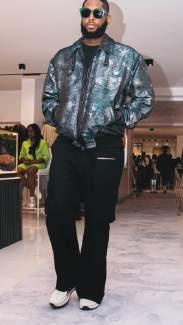
who didn’t know the worth of the fabric and would damage it,” she shared during a chat in her store in Opebi, Ikeja.
Gradually, from one tailor to two, she started offering bespoke garments but that also came with its own headache. She finally stopped the bespoke line two years ago. Now she offers not only ready-to-wear outfits but also has expanded her business to include a garment production company and fabric printing house.
The idea to own a garment production company, BK3, came during the pandemic when she realised that many boutiques couldn’t buy fabrics because of the lockdown.
For the fabric printing which is housed in another building, it was a result of the repetitive patterns found in most fabrics. She wanted something unique.
“It just became a big issue for us, and that was why I decided to go into fabric printing.
So everything is now like an ecosystem; from fabric to readyto-wear, to jewellery to shoes to head pieces,” she said.
Kiki is mostly grateful for the 10-year journey.
“It’s humbling to know that we started from the back of our car.”
Lessons abound from her 10-year journey. They include consistency in business and accepting challenges as building blocks.
“I’ve also learned that you don’t need the people you know alone to actually grow in business. Ninety-eight per cent of my clients are not my friends. I didn’t know them. Most of my friends don’t even patronise me.”
Her goal is to expand the fabric printing factory. She intends to get a bigger space and acquire additional printing machines to meet the high demand. For now, she offers two types of printing, sublimation and direct-to-film printing.

Immediate past Chairman of the Independent Corrupt Practices and Other Related Offences Commission, Professor Bolaji Owasanoye (SAN), is the Coordinating Director of the Proceeds of Crime Management and Illicit Financial Flows Coordination Directorate of the Federal Inland Revenue Service. In this interview THISDAY, he speaks on why FIRS is organising a national conference on IFFs, the dangers the menace poses to economic development and efforts that must be made to address it
FIRSplanstoholdanational conferenceonillicitfinancial flows.Howsignificantisthe conferencetotheactivitiesof FIRSandbyextensionNigeria?
It is significant to Nigeria’s economic development and well-being because tax revenue is the surest source of income for government’s programmes and the nation’s economic development. Illicit financial flows (IFFs) significantly affect tax revenue and if people don’t understand how it affects tax revenue, they will not appreciate the effect on the ability of the tax authority to meet statutory mandate, which is to collect revenue for government. Basically, there are three sources through which a country loses money that it ought to have for its development aspiration. One is by commercial transactions, another is by corruption, and the third is by criminal transactions. People focus more only on corruption and criminal transactions, which jointly account for slightly above 30% of the losses. Commercial transactions account for over 60% of revenue losses. Within that framework of commercial transactions, the biggest losses are to tax revenue. But people don’t know. And this is based on the operations of corporations which have commercial transactions that appear legitimate on their face value. But in actual fact, they are being used to move money and reduce taxable profit. What the tax authority looks out for apart from specifics like Value Added Tax (VAT), stamp duties and PAYE and all that is to tax profits of corporations and businesses. If you succeed in significantly reducing your profit because of these anomalous practices, you have reduced the collectible of the tax authority. So, the conference is designed to bring attention to these issues, how they happen, the various agencies that must work together and collaborate to make sure that we reduce very significantly, in our own interest, revenue losses to illicit financial flows.
Thereisalotofopacityaroundthesubject matter(IFFs)eventheactivitiesthatunderline it,theflows,thetransfers,difficulttodetermine. HowbigachallengeisIFF?
That’s one of the reasons for the conference. We want to call attention to the kinds of things that lead to outflows. I will give you some examples. If, for example, a company wants to import phones and to reduce the amount of duty it will pay to the government, it falsifies the invoices. It has already stolen some money which the government would have been entitled to as part of the profits of the company. If you export goods, as government is encouraging diversification of our exports base now, and you export 1,000 tubers of yam, but you put 500 tubers in the invoice and you are supposed to repatriate your earnings to boost Nigeria’s foreign exchange earnings. You will only bring in the income for 500 tubers. You will keep 500 offshore. So, the government cannot tax the remaining because you falsified those trade records. These things are happening within the commercial sector, particularly when companies do inter-corporation transactions. Let us say that three companies are part of the same conglomerate. One subsidiary produces plastics, another one produces bottle tops, the third subsidiary produces water, and you want to do business among yourselves. The law says that they will trade at what we call arm’s length. Fairly, each entity will protect itself. But the law ignores the reality that somebody owns the three companies. So, if they want to move money and the business is being operated in different countries with one country has more potential than the others.

They will move money from that place that has potential, so they can tell you to do the transaction one way or the other and move money from the economy that has potential to the one that doesn’t have or to pretend that this is the headquarters of the company, that is the home country of the company. So, when we finish doing business every year, our profits move to this place, whereas the economic activity is not in that place; the economic activity is somewhere else. All your operations are somewhere else. So, if you are creating environmental problems, for example, it is somewhere else. Now if you deny that somewhere else tax revenue, how will you fix some of the problems that you have created in such a place? So, these things are not obvious. Unless you have the skills to know what to look for, you will miss out a lot.
You raised a very important issue. How big a problem is this? This is one of the reasons why we need to dig deeper into this. The African Union in 2015, about 10 years ago or more, set up a committee headed by former president of South Africa, Thabo Mbeki, to look at this very issue because it was realized that African countries, especially countries with extractive resources and virtually every African country, especially Nigeria, is losing a lot of revenue estimated to be about $80 billion per annum. If you look at the size of the economies of the countries, Nigeria is a big economy in Africa. And the report flags that a significant portion of that is being lost by Nigeria. Nigeria itself has a
responsibility, which is one of the things that the FIRS is doing with the creation of a Proceeds of Crime Management and Illicit Financial Flows Coordination Directorate (POCM-IFF) and to take a closer look at these issues. Of course, before the creation of the POCM-IFF unit, other steps were being taken to mitigate this issue. FIRS has been representing Nigeria in the Organisation for Economic Cooperation and Development (OECD), Base Erosion and Profit Shifting (BEPS) Inclusive Framework and all that. FIRS has issued regulations to deal with transfer pricing. The Service is liaising with other agencies and all that. But still, we have not been able to come out accurately with data to close the knowledge gap as to the exact amount that we are losing. So, part of what we will discuss at this conference is this need for collaboration: bringing out all those agencies that have one role to play or the other. This will ensure we reduce the losses. The other significant thing to say is that it will also build the capacity of FIRS tax officers who are in the field and who will be better trained to know what to look for in such transactions.
It’s good you mentioned the issue of inaccurate data because people have alleged that those who are at the vanguard of this campaign against IFF do not have the data. They give estimates and approximations which are not backed with data. We may not really appreciate the impact if we don’t have accurate data.
One of the things the conference will discuss is the need for us to work together to get the data. From the little that I have said, you would have noticed that many agencies of government are involved. For example, like Customs, if you don’t get data from such institution, you cannot be
able to close the knowledge gap. You are aware that the government approved the national single window project which is domiciled in the FIRS. This is one of the measures being taken to try and mitigate illicit financial flows. The more these projects succeed, the better the revenue collection. No doubt about it. So, there’s a link between this issue and enhanced revenue collection. We can only popularize it more to our own advantage.
Thereareexistinglegalframeworkssuch astheMoneyLaundering(Prohibition)Act 2022andthelawagainstterrorismfinancing. AretheselawsnoteffectiveintacklingIFFs? These laws are relevant, but they do not solve all the problems. They do not close all the gaps. For example, the Money Laundering Act alone does not stop transfer pricing. Transfer pricing, for example, happens from aggressive tax avoidance and aggressive tax planning by companies. A company that is determined to undermine the ability of the tax authority to collect revenue will plan its affairs in the most aggressive manner to exploit every loophole. Aggressive tax avoidance equals tax evasion virtually because your intention is to do everything and anything to make sure that the government does not get this revenue from you. Then, we don’t have laws specifically that criminalize and prohibit falsification of trade records. So, if you find anybody who is guilty of this, you must try and deal with it in another way by, of course, an intensive audit to show that they have breached extant laws and all that. You will also notice that FIRS is listed as one of the relevant organisations (ROs) under the Proceeds of Crime (Recovery and Management) Act 2022. But people will say FIRS is a tax authority, what’s its business with proceeds of crime? But FIRS is actually a law enforcement agency. The new Tax Administration Act, Chapter 4, I think it is, creates a whole range of offences and one of the Sections, 139 maybe, gives FIRS officers power to prosecute offences created by the Act. When you are given prosecuting powers of the Attorney General as the Chief Law Officer of the State, you become a law enforcement agency. And once you choose to prosecute someone for a crime, all the constitutional safeguards for criminal justice administration will kick in. That means you can detain someone. You can arrange for them to be arrested. They can be denied liberty and their property, assets if they lose the case. It must be clear. But, because the FIRS is trying to build trust and get the cooperation of citizens, it has chosen rather than to use its enforcement powers, to use its civil remedies power more. So, if you are found not to have declared your tax, that is a beach of the law. But, FIRS will give you an assessment and ask you to pay. The Service is trying to build a customer-centric approach, because it wants to build trust, gain citizens’ confidence and all that. It doesn’t mean FIRS cannot bite; it must not lose sight of that. The staff must not suffer an identity crisis by not knowing that the FIRS is a law enforcement agency. We smile; we want to get people to cooperate but don’t take the Service for granted. And when you realize that FIRS has asset recovery powers, then you understand how to situate these whole illicit financial flows.
On a global scale now, what kind of collaboration would you be saying that we should have? The media play a critical role in this, especially when you consider what a German investigative journalist did with the Panama Papers.
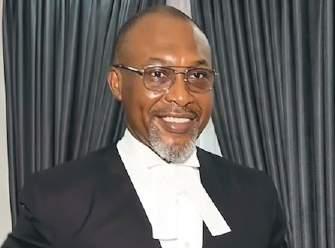
The past two weeks have been celebratory for former Minister of Aviation, Osita Chidoka. First, he fulfilled his father’s long-held dream of seeing him become a lawyer. Then, he marked his 54th birthday. While both milestones are remarkable, what resonated most with many was the story behind his decision to return to school - to make his father proud. Vanessa Obioha writes edited by: VAN
By now, many would have seen Chidoka’s Facebook post from July 10, where he announced that he had been called to the bar. But the post wasn’t just about the accomplishment, there was a message of motivation behind it. Nearly 30 years after earning a degree in Business Management, Chidoka returned to the classroom, driven by a dream that had been previously abandoned.
It was his 98-year-old father who fueled that dream. For years, he had longed to see his son become a lawyer. Like many fathers, he had a vision for his child’s future, one he held onto with unwavering belief. Whether through gentle encouragement or quiet persistence, he nurtured that dream and waited patiently to see it come to life. And he did.
That dream was once Chidoka’s too. In his secondary school days at Union Secondary School Awkunanaw, Enugu, he was known as one of the best Arts students. English, Literature, and Government were his favourites.
“I proudly carried our school’s banner in quizzes and debates, earning trophies and, more importantly, the joy of wielding words—spoken, argued, written,” he shared on Facebook.
With his eloquence and intellect, many saw him as a future lawyer. He himself was inspired by the late Chief Obafemi Awolowo’s journey from journalism to law, and began to imagine a similar path. His father, a devoted admirer of the late Nnamdi Azikiwe, shared in that dream and did everything possible to nurture it.
“From SS1 through university, he gave me money daily for The Guardian, Newswatch, later Time magazine. He wanted me to be like Zik—a philosopher and politician—but also a lawyer like Awo. Thanks to him, I grew up reading far beyond any syllabus.”
However, destiny had a different plan. In 1988, confident in Literature, Chidoka sat for WAEC. To his shock, he failed the subject—despite excelling in others. Though he was initially admitted to study Mass Communication, his parents insisted on Law. He passed JAMB after attending a top tutorial college in Ebute Metta, Lagos.
Around 1989, new rules from the Council of Legal Education made Literature compulsory for studying Law, which he hadn’t met at admission. At UNN, despite registering for GCE, he was denied entry into Law because the requirement had to be fulfilled beforehand. Devastated, he was redirected to study Business Management.
“I was crushed. My father’s eyes held disappointment he tried to hide. My mother promised we’d switch after my GCE.” Though he later passed Literature with an A2, switching back to Law would have meant starting over—a price too high to pay.
“That night I lay awake, staring at the ceiling. Maybe I was not meant to be a lawyer after all. Maybe my father’s pride was misplaced. I felt small, ashamed, like I had failed not just myself but everyone who believed in me.”
While Chidoka gradually let go of the dream, his father quietly held on to it.
In his July 10 post, the former minister shared the kind of relationship he had with his father. It is a rare kind, the type that speaks volumes of compassionate love, care and deep mutual respect. It was not a relationship forged by chance but nurtured from childhood. It was his father who bought books for him to spark curiosity and open his mind to the wider world.
Whenever he travelled, he returned with stacks of foreign newspapers for his son, subtle tools preparing him for a life of relevance and impact. A life that would lead him to corridors of power and make him an exemplary icon for his generation. His father’s efforts were not in vain.
Chidoka recounted a vivid memory of his father’s dedication to his education.
“When President (Olusegun)
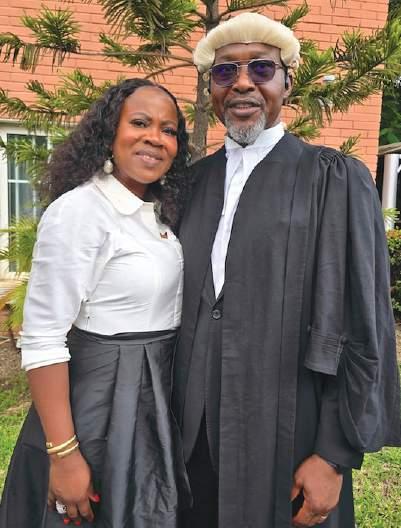
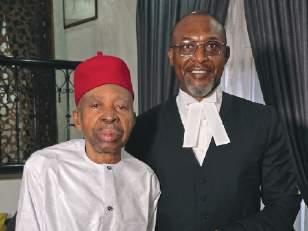
Obasanjo wrote ‘Nzeogwu’ and held a signing session at Choice Bookshop in Ikeja, my father took me by the hand to buy a copy, to meet the General, to collect his autograph.”
Moments like these were seeds planted early, with the hope they would someday bloom. “He dreamed of me as a lawyer and politician and invested in that dream with the dedication only a father knows,” he added.
At the time of his appointment as Minister of Aviation by former President Goodluck Jonathan, law was far from his mind. “When I finally walked into the Federal Executive Council Chambers in 2014 to take the Oath of Office, my parents stood proud, their hearts full,” he recalled.
But for his father, that pride was not yet complete. He still believed that his son was meant to be a lawyer and he would boldly be referred to as the “lawyer’s father.”
“After the day’s celebration, my father still found space to ask if I might someday return to the study of law. He was happy for me, yet somewhere in
orchestration:
“In March 1998, aboard the ADC flight that carried Pope John Paul II from Abuja to Enugu,” he wrote, “a moment of astonishing clarity came over me. As the aircraft lifted off and I gazed out over the sparse skyline of Abuja, a silent prayer rose from deep within: How did a 26-yearold boy from Achara Layout, Enugu and Akowonjo, Lagos come to share airspace with His Holiness? How did I end up here?
“In that instant, I grasped that my graduation year in 1996 was no accident. My path to that plane seat was not engineered by my own hand. I was merely an arrow, drawn back and released by God.” Chidoka was a member of the Committee for the Review of the Abuja Master Plan and led the Drafting Committee for Nigeria’s National Policy on Non-Motorised Transportation.
He worked as Personal Assistant to both the Minister of State for Works and Housing and the Minister of Transport, and later served as Special Assistant to the Senior Adviser to the President on Legal Matters.
He would go on to work in the private sector, joining Mobil Producing Nigeria, a subsidiary of ExxonMobil, as Senior Adviser on Government and Business Relations. But even then, public service called. In 2007, President Olusegun Obasanjo appointed him Corps Marshal and Chief Executive of the Federal Road Safety Corps (FRSC), making him the youngest person to hold that position at age 35.
Before he was appointed a federal minister, he chaired the Presidential Committee on Nigeria’s Centenary’s Transportation Subcommittee and was later appointed Chairman of the Transportation Committee for the World Economic Forum, which was held in Nigeria in May 2014.
“Then came 2015. The PDP lost the presidential election. I found myself in unexpected early retirement, with a rich menu of options before me. But one path stood out. My life to that point had been full beyond my imagination; politics still beckoned.”
Eventually, Chidoka responded to the call—both literal and spiritual—to return to school. “Yet I felt a tug, to honour my father’s investment in his hope of being a lawyer’s father. And so I enrolled at Baze University to study law.”
But in 2017, he left his studies to run for governor of Anambra State, in southeast Nigeria, as a member of the United Progressive Party, but lost to Willie Obiano of the All Progressives Grand Alliance (APGA). In 2021, he graduated with an LLB Second Class Upper from Baze University.
“Today, he will receive my certificates,” he continued, “watch me don my wig and gown, and witness my Call to the Bar.”
“Despite all I have done, despite my age and offices held, I still yearn for that glint of pride in his eye.”
his spirit, he felt something remained unfinished.”
Chidoka didn’t immediately heed that call. Understandably so. He never imagined that the young man who graduated with a degree in Business Management and joined the National Youth Service Corps (NYSC) in 1995 would one day walk the halls of power. Or that just a year later, he would be among the select few offered automatic employment with the Federal Capital Development Authority by the then Minister of the FCT, the late General Jeremiah Useni.
“That single moment would set my life on a trajectory I could never have plotted on my own.”
Indeed, it did. His public service journey saw him contribute to national development in various roles including serving as Secretary to the National Committee for the visit of Pope John Paul II in 1998, which earned him a papal commendation.
That visit, he wrote on his Facebook piece, established a sense of clarity that his career trajectory is a divine
That longing captures who Chidoka is: a man who understands the power of honouring one’s parents, a man who respects the wisdom of elders and their hopes for the next generation. He shared photos and videos from his Call to Bar ceremony—moments rich in emotion and fulfilment. For Ogbueshi Ben Chidoka, the father who held onto a dream for more than 30 years, it was a moment of divine satisfaction
He wasn’t, however, the only one who saw this legal journey in Chidoka’s future. Mr. Rob Iweka, former Attorney General of old Anambra State and a Senior Advocate of Nigeria, also believed in it.
“After each of our long, searching conversations, Uncle Rob would invariably say, ‘Osita, you must still study law.’ Even when I wore the uniform of Corps Marshal or sat in the high councils of state as Minister, he held fast to that gentle admonition.”
As Chidoka turned 54 on July 18, the celebration was more than just a birthday. It was the fulfilment of a lifelong promise. A son had made his father proud. And in doing so, he reminded us all that it’s never too late to pursue purpose, and never too old to honour the dreams that shaped us.
with KAYoDe ALFreD 08116759807, E-mail: kayflex2@yahoo.com
...Amazing lifestyles of Nigeria’s rich and famous
In the hush-hush world of intelligence, where fewer words mean more, Adeola Ajayi has emerged not just as a name, but as a quiet force. He remains the man seated at the helm of Nigeria’s Department of State Services (DSS).
Back in 2024, Ajayi’s ascension was not loud. There were no sweeping promises or political fanfare. Just a dignified handshake, a passing of insignia, and a nod to continuity from outgoing DG Yusuf Bichi. But beneath the ceremony lies something deeper: a seasoned spymaster with a reputation built not on headlines, but on results.
Almost a year later, Ajayi’s appointment is still being called a “round peg in a round hole” by admirers. President Bola Tinubu, it seems, still has a knack for spotting institutional loyalty when it

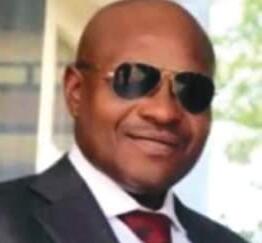
matters.
Insiders say the DSS chief prefers precision to populism. Here is someone who knows that real intelligence work is not made for front pages. Instead, Ajayi’s focus appears firmly fixed on recalibrating the agency for modern challenges: insurgency, economic sabotage, and political unrest. And he’s doing it with a studied silence that is fast becoming his trademark.
In a country where security chiefs typically make news for the wrong reasons, Ajayi seems determined to make his impact without becoming the story. Whether Nigeria’s vast security web tightens or frays under his watch remains to be seen. But for now, one thing is clear: the man in charge prefers results over rhetoric. And in the world within which he’s operating, that might just be the best strategy of all.
frequency. And this time, it hums with Wi-Fi.
With a wink to the future and a handshake with Wave5 Wireless, Nigeria’s elusive billionaire has unfurled a public internet scheme that is as much about access as it is about ambition. Under the glare of market stalls and the rustle of bus shelters, Lagosians may soon stream, scroll, and speak freely for the price of a soft drink. One hour at a time, the data drought is giving way to Adenuga’s rain.
In the thrumming heart of Lagos, where buses crawl and data stalls, Dr. Mike Adenuga Jr. is tuning the city’s rhythm to a different
The pilot is modest in geography but grand in intent. Tejuosho Market, Arena, and fifteen LAMATA bus stations are the opening act. Two hundred thousand users, including traders, students, drivers, and hawkers, are expected to plug in. For N500, one gets three hours, any day, almost every day of the year. But beneath the tariff lies a quiet revolution: connectivity not as privilege, but public amenity
To those familiar with Adenuga’s grand oeuvre (oil, banking, telecoms), this is neither stunt nor whim. It is a signature. In the 1990s, he drilled where others dared not. In the 2000s, he snagged a GSM license that would birth Globacom. And now, in Lagos, he’s offering Wi-Fi on a public bench with the same poise as he might uncork a new crude blend in the Niger Delta.
Elsewhere, his Conoil Producing is exporting Obodo crude, and his Gloworld stores are dotting cities from Maiduguri to Ibadan. Yet this quiet Lagos rollout feels deeply personal. It’s not just network expansion; it’s reputation restoration, brand rejuvenation, and a masterstroke in relevance.
Adenuga, the soft-spoken magnate of lace and lustre, has once again whispered his presence into the nation’s noise. And Lagos, restless as it is, just might be listening.
Political rhythms don’t fade quietly in Osun State. They swell, simmer, and sometimes clash like drums at a festival where no one agreed on the tune. At the heart of this latest chorus:l, Governor Ademola Adeleke and his predecessor Rauf Aregbesola, are the two men marching to very different beats as 2026 inches closer.
Aregbesola, now parading under the colours of the African Democratic Congress (ADC), recently staged a comeback rally with more than just nostalgia in his voice. “We’re taking Osun,” he told supporters, hinting not only at a new political order but at a potential three-party contest come August 2026. A state once ruled in his image, he believes, can be reclaimed. His critics think otherwise.
The Adeleke camp responded like a band pressed for time: fast, sharp, and with little appetite for harmony. The governor’s spokesperson dismissed Aregbesola’s rhetoric as revisionist and oddly timed. In their telling, the former governor left behind ghost projects, half-paid salaries,
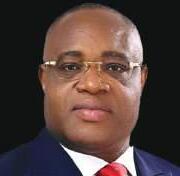
and a pension debt that swallowed many into silence. That Adeleke is still cleaning up the financial debris, they argue, is not up for debate.
And yet, rumours swirl that Adeleke himself is eyeing new political terrain, possibly a move to the APC, though his team flatly denies it. Aregbesola, for his part, seems more interested in crafting a legacy outside the party he once helped to build, even if it means breaking from familiar ranks.
Still, Osun isn’t just counting political banners. Roads are being tarred. Salaries are being paid. A flyover or two is finally rising. The electorate, weary from past promises, appears more concerned with performance than party slogans.
So as 2026 looms like a drumbeat in the distance, Adeleke and Aregbesola may find that the real contest isn’t in the rallies or rebuttals. It’s in the memory of voters who’ve seen enough pageantry to know that applause doesn’t build bridges—but accountability might.
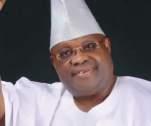
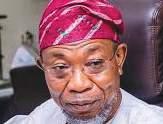

By all appearances, the red chamber should be a place of lawmaking, not longing. But in Nigeria’s Senate, decorum may bow to drama. This is where the rift between President of the Senate Godswill Akpabio and Senator Natasha AkpotiUduaghan now reads like a political novella: full of shifting chairs, midnight phone calls, and courtroom battles. At the centre is a suspension and the swirl around it. On July 4, a Federal High Court ordered Natasha’s reinstatement, calling her six-month suspension “excessive” and tagging on a N5 million fine for good measure. Now, Akpabio is appealing that verdict, arguing that the court has no business meddling in the Senate’s internal rituals. His lawyers insist that such matters are protected by parliamentary privilege and are immune from judicial interference.
But to truly grasp the tenor of the feud, one must rewind to the day Senator Natasha found her seat reassigned, her nameplate gone without warning. When she raised a protest, invoking Senate rules meant to safeguard members’ rights, her microphone was silenced. Days later, her case landed before the Ethics Committee. That might have been the end—until it wasn’t.
In a television interview, Natasha accused Akpabio of sexual harassment, citing incidents ranging from suggestive remarks at a birthday party to promises of legislative favours in exchange for personal attention. He allegedly offered her the Senate’s riches if she’d “take care of him.” She said no. Then came obstruction, and finally, suspension.
Akpabio denies everything. His wife, Ekaette, calls the allegations fantasy. Her defense? Proximity. “I was there,” she said. “Nothing happened.”
Yet the accusations linger, now accompanied by defamation charges from the Attorney General. The Senate is split, the public watching, and the courts, once again, drawn into legislative theatrics.
As the appeals proceed and committees deliberate, one wonders: Is this a test of parliamentary immunity, or simply the Senate confronting a mirror? In either case, the drama isn’t over. It’s only moved to a higher court.
If ambition had a fuel gauge, Gabriel Ogbechie’s would be pressing hard against full.
Recently, the oil magnate and founder of Rainoil Limited unveiled ten new retail stations in a single sweep, bringing his empire to over 210 across 27 states. It’s part of a not-so-modest dream he’s dubbed the “Road to 400.” In a country where expansion plans often wilt under regulatory friction or the quiet chaos of infrastructure gaps, Ogbechie’s rollout feels, if nothing else, determined. But this is no overnight acceleration. Ogbechie’s journey began in the shadow of modest means in Idumuje Ugboko, Delta State, where the future
billionaire was one of six children. After studying Production Engineering at the University of Benin and cutting his teeth in accounting and operations management, he planted the seed for Rainoil in 1997. It didn’t just grow; it surged.
From massive storage depots in Lagos, Calabar, and Oghara to a fleet of hundreds of tank trucks, Ogbechie’s blueprint has always been national, even when the market looked local. His latest venture targets urban spillovers and transit-heavy corridors, where fuel scarcity can turn into political theatre. In Warri South, a traditional chief turned up at the ribbon-cutting, a nod to Rainoil’s knack for blending capitalism with community. Still, Ogbechie is no stranger to turbulence. A public spat with billionaire Ned Nwoko
once threatened to muddy his polished image. But the courts (and time) cleared the air. And Ogbechie, ever the tactician, shifted focus back to business: acquiring Eterna Plc, backing tennis tournaments, and pouring funds into education and healthcare through his foundation.
Nigerians are weary of grand promises and small results. It is with them as witnesses that Ogbechie’s path feels unusually linear. He’s not loud, but he is everywhere. And in this fuel-thirsty economy, his grip on the nozzle is tightening. The destination may be 400 stations. But it’s the road, paved in steel tanks, silent trucks, and unspoken resolve, that tells the better story.
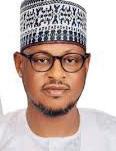
Even governors weep.
As the military hymn faded and the desert wind carried the scent of dust and grief across Daura, Governor Dikko Radda stood still. He was rooted, not as the highest public servant in Katsina; he was rooted as a son of the soil mourning one of its most towering figures. And for a moment, he could not hold back the tears.
It was Tuesday afternoon, and Daura was overflowing. Jets and dignitaries, generals and businessmen, the high and mighty from Abuja and beyond had all come to witness the final rites of Muhammadu Buhari, former president, soldier-statesman, Daura’s most famous son. But it was Governor Radda, in flowing kaftan and muffled sorrow, who seemed to wear the weight of that moment most personally.
He did not speak. He didn’t have to.
Buhari’s casket, wrapped in the Nigerian flag, had arrived hours earlier from London, greeted with a slow march, a 21-gun salute, and a prayer that echoed gently off the helipad walls. The president of Nigeria stood nearby. So did his vice, foreign dignitaries, governors, emirs,
The legal odyssey of Ayodele Fayose has always read more like political theatre than courtroom drama: full of noise, colour, and the occasional bowl of amala. This week, it reached yet another scene change, with the Federal High Court in Lagos clearing the former Ekiti governor of all charges in a N6.9 billion money laundering case brought by Nigeria’s anti-corruption agency.
The Economic and Financial Crimes Commission (EFCC) had chased Fayose since 2018, accusing him of taking illicit campaign funds, collecting $5 million in cash from a former defence minister, and laundering state money through a web of personal companies and loyal aides. But the court said: not guilty, not even close.
In his ruling, Justice Chukwujekwu Aneke upheld a no-case submission from Fayose’s legal team, agreeing that the EFCC failed to establish a prima facie case. In other words, no direct evidence, no co-conspirators charged, no clear trail. The prosecution’s
narrative, once sprawling, collapsed under its own weight.
Outside the court, Fayose did not so much speak as perform. A viral video showed him hunched over a plastic bowl, cheerfully eating amala with construction workers. It was a celebratory meal in the same Lagos where he had once stood trial.
It was vintage Fayose: brash, folksy, calculatedly ordinary. The man who beat two incumbents to govern Ekiti twice, the politician who once declared presidential ambition before being talked down by his own party, is again proving hard to pin down. And harder still to predict.
This is not his first tango with the EFCC. The agency once froze his bank accounts and accused him of benefiting from arms procurement funds diverted during the Boko Haram conflict. But each chapter ends with Fayose slipping out the side door, grinning.
He says it’s vindication. His critics say it’s Nigeria’s justice system playing politics. But
and military chiefs. Still, it was Radda’s quiet grief, raw and unguarded, that held many transfixed.
A son of Dutsin-Ma, not far from Buhari’s Daura, Radda had spent much of his public life trying to uplift the same people Buhari once called his own. In some ways, the two men were bookends in the region’s story, the older guard giving way to the new.
But Tuesday was not for politics or policy. It was for farewells.
And as the prayer ended and the earth swallowed the casket, Radda turned away briefly, wiping his face. The cameras didn’t zoom in, but those close enough saw his chest rise and fall, heavy with loss. The governor stayed until the last blessing was said.
Then, without ceremony, he walked back into the crowd, his face set, his heart perhaps still broken, but his duty, as always, unshaken. Daura grieved. And with it, so did Governor Radda.
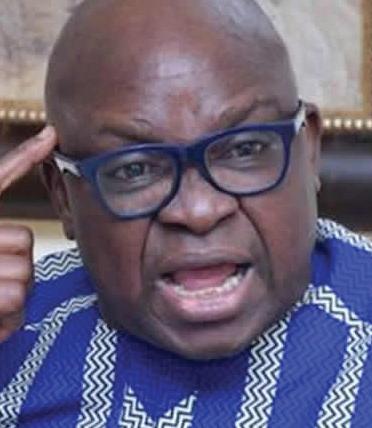
free, and for now, the amala is hot and the cameras are rolling. And in the theatre of Nigerian politics, that might just be the final word—until the next act.
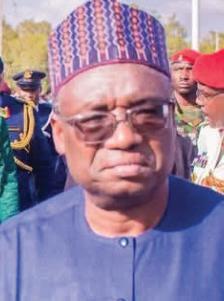
He walked a step ahead of the president. For ten years, always a few paces in front, not for prestige but for protocol, for duty, and maybe, just maybe, for love of country.
Ambassador Lawal Kazaure, Nigeria’s long-serving State Chief of Protocol, became a silhouette the public grew familiar with, though few knew his name. Always dignified, always composed, his was the quiet choreography of state: opening car doors, guiding foreign dignitaries, standing sentinel beside Buhari’s shoulder on tarmacs from Daura to Doha.
On Tuesday, he did it one last time.
At the airstrip in Katsina, beneath a heavy sun and heavier silence, the flag-draped casket of former President Muhammadu Buhari arrived from London. Kazaure was there, as he had always been, this time not to receive instructions but to honour memory. As pallbearers wheeled the casket past, Kazaure stood near; firm, still, the same angle of the head, the same squared shoulders.
For a decade, he was Buhari’s gatekeeper to the world: the man who briefed visiting leaders, organised summits, clarified protocol, and
He does not sit in the cabinet. He does not command a ministry. But if power in Abuja had a hallway nameplate, Zacch Adedeji’s would read something loftier than “Executive Chairman, FIRS.” These days, in the low tones of inner-circle banter, he’s simply called the Prime Minister.
seismic, are remapping Nigeria’s fiscal terrain. And his numbers speak in ways few headlines ever do.
smoothed the edges of power. While others came and went through the revolving doors of politics, Kazaure remained: discreet, constant, loyal.
That loyalty extended beyond office. When Buhari was lauded in foreign capitals, it was Kazaure at his side. When streets in Bissau were named after the president, Kazaure walked them with him. And when the late leader was honoured for defending democracy across West Africa, Kazaurenoddedalong,unseenbutinstrumental.
No titles were needed. No farewell speeches. In a world of shifting allegiances, he embodied something rare: steadfastness without spectacle.
As the Daura earth swallowed the president’s remains and the bugle notes of the funeral march faded, Kazaure didn’t linger for applause. He had done what he always did: led the way quietly, stepped aside gently. Loyalty may not make headlines. But on days like this, it becomes the headline. And Kazaure, in every measured step and silent salute, reminded us what it means to serve.
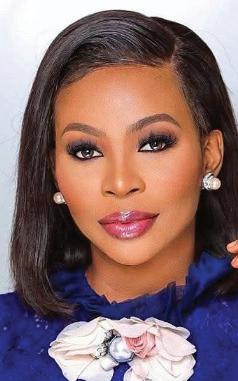
Her name is Usoro Akpabio, who, after the Senate gave its nod, became the leading authority on the letterhead of the South-South Development Commission. A newcomer to the national stage, she stepped into a role burdened with old expectations and urgent demands. But as Nigerian politics has shown, new names don’t always mean novice hands.
Born in Mbiaya Uruan, a quiet town tucked inside Akwa Ibom’s winding roads, Akpabio spent the better part of two decades learning the rhythms of regional politics. From student union days to quiet foundation work in underserved communities, she built a portfolio without ever needing a spotlight.
Her surname, however, comes with its own weather. Whispers of kinship with the Senate President have followed her nomination like a trailing scarf, though no official family tie has been confirmed. What is clear is that her political orbit is close enough to matter and distant enough to watch.
Behind her current role is a newly minted federal body, the South-South Development Commission (SSDC). It was created to course-correct where the Niger Delta Development Commission once stumbled. Charged with mending roads, cleaning up creeks, and putting young people to work across six states, the SSDC is no vanity project. It is, for many in the oil-rich but neglected region, a final hope.
He does not sit in the cabinet. He does not command a ministry. But if power in Abuja had a hallway nameplate, Zacch Adedeji’s would read something loftier than “Executive Chairman, FIRS.” In a capital city thick with titles and ceremony, the nickname stands out—less for pomp, more for precision. Adedeji, the 47-year-old tax reformer from Oyo, has emerged as President Bola Tinubu’s most trusted fiscal mind, with walk-in privileges few in the Villa can claim. When policy needs calibrating or revenue projections need massaging, it is Adedeji who gets the call.
In a capital city thick with titles and ceremony, the nickname stands out—less for pomp, more for precision. Adedeji, the 47-yearold tax reformer from Oyo, has emerged as President Bola Tinubu’s most trusted fiscal mind, with walk-in privileges few in the Villa can claim. When policy needs calibrating or revenue projections need massaging, it is Adedeji who gets the call.
He is not one for the spotlight. But neither does he shrink from responsibility. As head of the Federal Inland Revenue Service (FIRS) and Special Adviser to the President on Revenue, Adedeji straddles bureaucracy and statecraft with unusual ease. His reforms, quiet but
He is not one for the spotlight. But neither does he shrink from responsibility. As head of the Federal Inland Revenue Service (FIRS) and Special Adviser to the President on Revenue, Adedeji straddles bureaucracy and statecraft with unusual ease. His reforms, quiet but seismic,
While others chase political oxygen, Adedeji operates in clean lines and decimal points. Under his watch, FIRS posted a 144 per cent leap in revenue, even as he pushed to internalise 80 per cent of operations and reduce dependence on consultants. If bureaucracy is a maze, Adedeji prefers to redraw the blueprint.
are remapping Nigeria’s fiscal terrain. And his numbers speak in ways few headlines ever do.
While others chase political oxygen, Adedeji operates in clean lines and decimal points. Under his watch, FIRS posted a 144 per cent leap in revenue, even as he pushed to internalise 80 per cent of operations and reduce dependence on consultants. If bureaucracy is a maze, Adedeji prefers to redraw the blueprint.
But two months ago, his technocratic calm was tested when Abuja authorities shuttered FIRS offices over a ground rent dispute. He handled the fray with data, not drama, offering receipts up to 2023 and sidestepping the noise. The office reopened. The nickname endured.
Those who call him Prime Minister say it half in jest, half in awe. It reflects Adedeji’s growing influence, yes, but also the rare combination of discipline and discretion he brings to the table. He does not issue decrees. He drafts pathways. He doesn’t grandstand. He delivers.
But two months ago, his technocratic calm was tested when Abuja authorities shuttered FIRS offices over a ground rent dispute. He handled the fray with data, not drama, offering receipts up to 2023 and sidestepping the noise. The office reopened. The nickname endured. Those who see him as a technocrat say it half in jest, half in awe. It reflects Adedeji’s growing influence, yes, but also the rare combination of discipline and discretion he brings to the table. He doesn’t grandstand. He delivers.

Critics have grumbled. Some say she is too green. But her defenders point to the African Achievers Award she earned in 2019, and to the quiet efficiency of the Usoro Akpabio Educational Foundation, which has brought books and skills to communities often left behind.
Even now, all eyes are on the fair lady. This became the norm after she was confirmed as the best choice to run the commission. It might be because she carries the weight of a region’s aspirations and the scrutiny of a nation used to disappointment. She may be new to federal politics, but Akpabio is not walking in the cold. And if she succeeds, she may just rewrite the playbook.
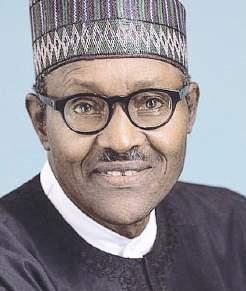
“Duke, I just came in from London and would be heading straight to Abuja to deliver my speech on the need to change the constitution.”
That was Chief Emeka Anyaoku, my favourite Nigerian and one of the most respected individuals alive in this world.
Chief is very passionate about this constitutional thing. He talks about it, puts his energy and is also part of a group called The Patriot whose main task is to push for a relook at the constitution.
Me, I don’t know how to tell Daddy the honest-to-God truth. This mission is much more difficult than fighting apartheid in South Africa. You know Daddy was very instrumental in that fight. If you sit down with him, he will tell you the work he did in bringing sanity to that country. A work that has been globally heralded, making him one of the most distinguished humans that ever traversed our world. But this latest mission? It cannot work Daddy because unlike the apartheid fight where you were dealing with reasonable people who were driven by ideology and selflessness, this one, you

I know you must have read a lot of commentaries on the passing of the former President Muhammadu Buhari. Add mine to your list.
It was the late General Abacha that started it. His death started the trend of Nigerians jubilating over the passing of a human being. Even Oyenusi, the great thief, was viewed with pitying eyes for himself and his family. But when Abacha died, Nigerians went into a state of celebration instead of a plaintive mood.
This trend once again was displayed over the sad and unfortunate passing of one of Nigeria’s most historic personalities.
Buhari was a former war hero, member of the Supreme Military Council, governor, minister, military Head of State and two-time President of Nigeria but Nigerians preferred to laugh, deride, mock and jump for joy at his passing. He died at a ripe old age – about two years after he left power – in London, his favourite city apart from Daura and the capital of Niger Republic.
At first, when the news hit the airwaves,
are dealing with the kind of people we call ‘nduseme’ in Ibibio. These ones, na small dem better pass he-goat. People that don’t think, people that are only after the morsel of yam that they pick and run with; people who are driven by such selfishness that you can only imagine.
They will just listen to your Queen’s English, nod and run to the next bazaar to continue with the thievery.
Daddy, mbok, let’s not waste our time on these matters as we would not be able to shift any ground. Instead, let’s just continue meeting at home with your legs resting on that beautiful puff pillow of yours, sipping your tea and regaling us with these beautiful stories that I like to hear.
Mbok, let’s not go and risk any of these baboons to come and insult you o because that one, they will see my nakedness in techno colour, and it is not a very good sight, I assure you.
Chief of Obosi, let’s turn our back, Nigeria does not deserve you. It is not worth it. Thank you sir.
ATIkU ABUBAkAr: HeAr we go
AgAIN
Oga has decamped again. The musical chairs never stop turning
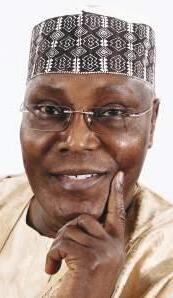
there was a loud silence of disbelief but immediately Nigerians started getting the news from credible sources and the affirmation by authorities, the walls burst and the insults, abuses, jubilation hit a crescendo. I am not there o. I did not follow them to clap and dance o. Me, I just took advantage of the holiday to get closer to my afang. I entered the kitchen and watched them slice and dice the leaves, watched them wash it and then saw how they threw in the condiments and the periwinkle which really interested me. Then they poured small palm oil and voila, the sweet aroma of the soup wafted down my nostrils. I quickly asked for fufu. That very smooth one and I ate and washed it down with palm wine.
I did not follow them o. All those people that were yabbing Buhari and laughing at him and saying those terrible things, I did not follow them o. I just ate my afang and watched TV. God will receive his soul and grant him eternal rest and for the rest of you, God will forgive you all. Let me repeat, and for posterity – I did not follow o.
and I suspect that we will be witnessing this revolving door for as long as Oga remains in politics. The only constant thing here is his ambition and whatever platform he feels would serve his purposes. For this one, nothing like vision, ideology, loyalty, faithfulness and all that crap. For him, these words are meant to be used to play scrabble and not for practical politics. The moment we see an opportunity, we jump in and as such, no permanent friends since the motion will take us from the man who called our mother a prostitute to the other one who just called our father a laggard. The most important thing is for the platform to be seized and used to propel another possible ill-fated attempt at the Presidency. Or how do you explain this movement back to bed with ElRufai, a man that has abused the living daylight out of him and today they are in one funny coalition smiling and drinking tea?
If I were Atiku, I would first request to give El-Rufai one dirty slap to compensate for all the abuses before I even agree to sit down to discuss. This “prostitution” of the political process does not even serve its

adherents very well as Atiku is now aiming for the Guinness Book of World Records as the most failed attempt at the presidency in modern day history.
Baba should just go and rest abeg. I never even believed that I would be on the same page with Mr. Keyamo who has kicked vigorously against the announcement of this stale resignation just a few hours after the passing of another major “coalition” builder.
Wetin concern me sef, abeg na siddon look we all dey for here. When they are tired, shebi they will all go back to their Dubai and let us rest.
AYo AND ISAAc FAYoSe: TweAkINg THe BlooDlINeS
I must confess that I am a fan of these two, even though I am a bigger fan of Isaac, Ayo always sha manages to hold his own.
Have you all seen the clip of him eating Amala to celebrate his victory at the court? He went straight to a building site - only God knows – to celebrate with the workers there over hot bowls of amala.
If you remember how after his tenure, he boldly wore a T-shirt and arrived at the EFCC office accompanied

by the irrepressible Wike. That time Wike had not become the Jehoshaphat that he is now, but was surely on the way.
Me, I hailed him for his boldness especially if you compare it to the Nollywood drama his White Lion friend took us through. Any time I remember that drama, what comes to my mind is when a doctor wants to give a little boy an injection. The way the boy would run around and shout is exactly what the White Lion that I just learnt has married a new wife was doing.
Anyway, the ethereal reality of the Fayoses continue to amuse Nigerians. Not for them is the pretentiousness of the elitist cabals that they belong to. While Isaac will shoot and send out videos with no shirt on, chewing some vile garden egg and making munching sounds, his brother Ayo will be stopping by the roadside as governor and chewing agbado, or was it boli?
I love both of them – Isaac more – and really do believe that Nigeria needs their realness and unpretentiousness. Who remembers Ayo”s screaming advice to Sim Fubara at that one’s reception “fear Wike ooooooooo,” how prophetic was that?
Kudos guys, both of you are simply just mad in a very funny way. Thanks.
AlIko DANgoTe AS MY DeAr SweeT MoNopolIST
The brilliant petro-economist sat across from me at the Alvin report roundtable. Aliko Dangote is pursuing a monopoly and Nigerians will be the worst for it. I crossed my legs, hissed at him and grabbed a bottle of coke and drank the damn thing. See ehn, this Aliko matter and his so-called monopolistic tendency is like one story they used to tell us in my village in Anyiam Nsit. So, the young virgin girl had tasted sex for the first time in her life and screamed “God punish my father, God punish my mother for depriving me of tasting this sweetness earlier.” Another story is when you are faced with your teenage daughter who has also just tasted the sweet apple and you are trying to convince her with mere words on the dangers of sex. She will just be looking at you while imagining her legs in the sky and looking forward to the next session. That is the situation between Nigeria and Dangote. The man has caused a huge shift in petroleum pricing and is now looking at LPG after converting Nigeria from an import dependent country on cement to an export one and people are now shouting monopoly. Mbok, monopoly come oooooo. If it is a monopoly that will bring the price of fuel down to N600 and price of cooking gas to N500 let the monopoly come o. This is the kind of monopoly that me I like. Abi is anybody stopping anybody from entering the business? Mbok anybody who hates monopoly should go and collect licence or buy any of the moribund modular refineries and do your own na. The man has stood up, risked his whole wealth and reputation, staked a very strong belief in Nigeria and delivered on a promise that millions thought not possible and the effects are beginning to show and we are shouting monopoly. Mbok, give us this monopoly if it will bring down prices of key essentials as we are seeing.
Please, is Alhaji interested in condom production? We really need the pricing of that to also come down
because the thing has gone from N20 when we started this career to about N5,500 now. We would not mind the Dangote magic in this area. Alhaji, please bring your monopoly here too.
reNo oMokrI vS rUfAI oSeNI: TIMe for THIS fIgHT
These two are fighting like agberos at Oshodi bus park. You know how two people will want to fight and they will be dancing around, running all over the place, breaking bottles, tearing their shirts, spitting all over the place and we will not see one blow. The crowd after some time will be tired and hiss and walk away, bitter that they were not given the opportunity to pick teeth from the floor.
This is exactly what is going on between these two “brothers”. Reno is reported to have accused Rufai of attempting to kill him or something
like that. He joined Rufai with one Justice as the main perpetrators of the dastardly act. But I have been told by a very small bird that this Justice is actually a blood relation to Reno.
Mbok, how a person will use Twitter – or is it X – or phone call to kill a whole Itsekiri man continues to defy all logic. So I took the phone and called Rufai – na true say you want kill your brother? He don report you to police o Rufai immediately went into a long long long talk, I come regret say I call am because he chop into my porn looking time - my daily chore involves exploring that world to see if there are any updates. Rufai talk o, he talk, talk, talk I come put the phone on speaker and enter toilet. Rufai talk talk talk. Last last, these two are related somewhat. Apparently Rufai has blood ties to Itsekiri land, and as
I saw the elegant Asue Ighodalo, the people’s choice during the last Edo gubernatorial election the other day in Ikoyi. He was in good spirits and we hugged. “Bro, I dey find you,” he said to me and I said, “I dey here,” and we laughed.
Asue had just gone through a very brazen bullying. He has fought to the very best of his capacity and must now bow to the system as a true democrat. It is very clear what just happened and we are not ok but we pause to come back.
One thing Asue’s mission proved is the love of the people. His campaign resonated amongst the people and his popularity soared as the people yearned for a different kind of leadership.
A people-centric leadership, a leadership that would leverage uncanny brilliance with pragmatic solutions driving impact but the wizards and witches that dominate our system stood up and put a very temporary halt to the move. What you guys don’t know is that people like Asue be like water – they usually morph into something else and flow towards their mission.
The Asue I saw last week is very far from beaten, he remains stoic, bold and beautiful and this is why the people of Edo will continue to stand with him to fight the Nebuchadnezzars who have not only seized their state but our country. This is where I also stand – with Asue.
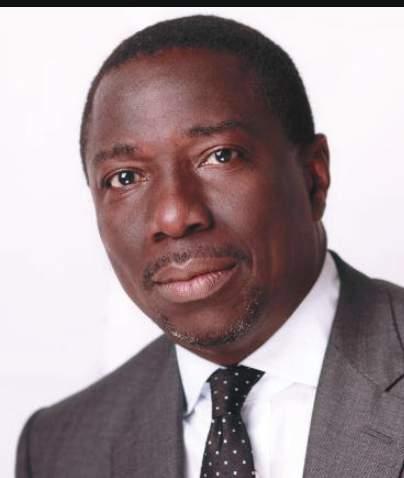
a result has some kind of blood affiliation to Reno through Reno’s mother, Aunty Helen and Rufai’s mother.
So, what we are seeing here na family feud masked as national crises. Me, I just want to see the fight, not all these social media rants. I am ready to host the fight in Shomolu any time. If Reno beat Rufai, I will vote for Tinubu in 2027 but if Rufai beat Reno, I will vote for Obi or whoever is his candidate in that election. But before I drop, let me state clearly that on any issue between these two, I stand with Rufai because e be like say Rufai makes more sense on national issues. My other brother, let’s leave that one first. Thank you.
SegUN AgbAje: TIMe To SAY SorrY You guys know that this bobo will not make my list of favourite people. I no just like am and I don’t know why. Anyway, there is this gentleman from Kano, a retired technocrat that would come to my office and scream “One million man.” That’s what he calls me for reasons best known to him. He would say, “One million man, Segun is doing well o.” I would reply “Alhaji, please let’s talk about another thing abeg. Doing well how?” and he would be talking like Scooby Doo.
Then he listed GTCO on the London Stock Exchange, making history and then leading the bank stock to cross the N100 mark on the NGX. Guys, you know when it comes to things like this, I have no shame. I will quickly capitulate and begin to speak from the other side of my mouth. These two movements have not only positioned Mr. Agbaje and his bank in true leadership positions but has made shame catch me. Remember when they could not hit the mark during the capital raise exercise and I gloated. The yabbing I gave them was real but today they have made me swallow my pride and say sorry.
See, I even just heard that his bank escaped the forbearance wahala. Mbok, my brother, sorry for the initial yabs, you are nothing but Simon Templar, the James Bond of banking. Well done.
bAbAjIDe SANwo-olU: YoUr people Are bUSY
I think my Lord missed the opportunity to make a mark during his recent 60th birthday celebrations. I watched closely to see if any landmark project or initiative would be launched but didn’t see. If it happened, I did not see o. What I saw was a huge soiree at the Eko Hotel and three changes of clothes. That one is not my wahala this morning. My wahala is the report that I have just seen that Lagosians are now having sex under the bridges. The report says that as a result of the widening housing deficit, the population of under the bridge dwellers is increasing and with that sex is on the upswing under those bridges.
For me, this is an exciting proposition as it opens another tourism slot that we can tie to the world famous Detty December thing. So, we can really package this and sell to international audiences as part of our offering. We kuku now have the world’s largest porn industry called Nollyporn- just google if you doubt me. So free and open shows under the bridges will just be an exciting addition. Governor Sanwo-Olu, don’t let us fight o, it will not be good o. Let’s finish these second tenure with a bang o because I don’t really understand this one that you are doing o. Thanks

As a child, Yutee Rone’s favourite pastimes were drawing and sketching. Her rich imagination often inspired enthusiastic remarks sometimes whispered from family members, peers, and neighbours. Many watched her in awe, while others lavished effusive praises on her creative ingenuity.
While in university, her father, though supportive of her passion, wanted her to study medicine. But for personal reasons, she chose to pursue Microbiology. Even as she worked towards her degree, her love for fashion design only grew stronger.
After graduation, the young Yutee went to London for training in fashion design and marketing in preparation for the launch of her label, Yutee Rone’s Fashion Collection, in 2006.
When she founded her high-end, Africa-based women’s wear line 18 years ago, it was with one sole intent - to revolutionise the industry.
Over the years, Yutee, wife of business mogul Julius Rone, has made a lasting statement through her innovative designs, continually showcasing her uncommon creativity.
Her brand embodies sophistication, femininity and effortless elegance, earning her global recognition.
Known for using experimental fabrics and textiles, bold prints, and meticulous craftsmanship, she has amassed a growing clientele.
As proof of her creativity, her collections have graced runways across Africa and beyond, receiving standing ovations.
Based in Abuja, this celebrated fashion designer has been featured in major fashion events around the world, including London Fashion Week in 2012 and 2013, and the Elite Model Look in Lagos in 2014.
It was the end of an era last Sunday when the Awujale and Paramount Ruler of Ijebuland, Oba Sikiru Adetona, bid farewell to Mother Earth. The monarch, one of the longest-reigning monarchs in Nigeria’s history, ruled over the affairs of Ijebuland for 65 years.
The late Awujale, who ascended the throne of his forebears at the age of 26, joined his ancestors at the ripe age of 91 after more than six decades on the throne.
If the dead could look back, the late Oba would be grinning in his grave because he lived a fulfilled life. He came, saw and conquered.
He would be described as an architect of modern Ijebuland and a symbol of unity and development. Under his reign, Ijebuland witnessed a tremendous cultural renaissance, infrastructural growth and economic advancement. Apart from being the longest king to have ruled over the people of Ijebu, he left a legacy steeped in splendour, turbulence and the
audacity to defy even the most powerful.
To say the man had a date with destiny is stating the obvious. He was a man destined for greatness from above. His ascension to the throne in 1960 was rancour-free as he was unanimously chosen by the people of Ijebuland.
In a country where monarchs are sometimes regarded as relics of the past, Oba Adetona defied time, politics, and even the evolving notion of traditional rulership. He did not simply inherit the throne; he embodied it, redefined it, and moulded it into a symbol of cultural defiance.
Oba Adetona would be remembered as a visionary bridge-builder between tradition and modernity. He revitalised the Ijebu age-grade system — the Regberegbe — giving young Ijebus a sense of cultural pride and structured communal service. He championed the Ijebu Development Board on Poverty Reduction, which created economic opportunities for indigent citizens.
Under his watch, the annual Ojude Oba festival,
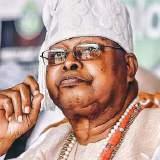
once a modest Muslim homage programme, became a world-renowned cultural carnival, drawing tourists and uniting the diaspora. He modernised the Ijebu palace with the iconic Ojude Pavilion and used his influence to push for infrastructural development across Ijebuland.
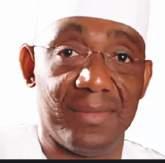
Perhaps, if Mohammed Gobir, the former Afromedia topshot, foresaw what he’s currently going through today, he would have stopped for a moment to think properly and stop his act of knavery. But the Kwara State-born probably allowed his unscrupulous behaviour to blind his
sense of reasoning, which made him unmindful of the attitude that eventually cost his partners dearly, and led to financial ruin for many years.
He was fully involved in fraudulent activities without minding whose ox is gored. Perhaps what mattered to him was how to acquire ill-got wealth.
Gobir loved acquiring money, and he spent it like a drunken sailor. He was literally the life of parties until his larcenous action got the attention of the Economic and Financial Crimes Commission (EFCC) in 2015. He was subsequently arrested and charged with multiple frauds.
Since then, the matter has dragged on so much that the once jolly and colourful fellow was forced to take a prolonged ‘leave of absence’ from the social scene, apparently to avoid public scrutiny.
He was taken to court for allegedly defrauding the foremost outdoor advertising company, Afromedia, of huge sums of money in various currencies. The ugly action made Gobir an instant multi-millionaire.
It was also gathered that Gobir was sued in
another matter before Justice Josephine Oyefeso of an Ikeja High Court, Lagos, for allegedly defrauding the Kwara State Government of N277 million on a five-count charge bordering on conspiracy, stealing and forgery. However, last week he was convicted and sent to seven years in prison for N300 million fraud.
According to reports, he was introduced to the company by its private placement consultants, Synergy Capital Advisory Limited, sometime in 2008. He, thereafter, offered to invest the sum of N1 billion in Afromedia, a pretext that earned him a position as Chairman, Business Development Committee, on the Board of Directors. Investigation revealed that Gobir, having earned the trust of the company’s board, defrauded the company of several million in hard currency. He was subsequently arraigned on March 17, 2016, by the EFCC, on a 17-count charge bordering on obtaining under false pretence, stealing, possession of fraudulent documents and forgery.
Anyone who has watched billionaire businessman Tunde Folawiyo and his adorable wife, Reni, closely will agree that they were created for each other.
Theirs is the type that affirms the meaning in the cliché: “marriage made in heaven.” The businessman tells whoever cares to listen that his wife is “his jewel of inestimable value.”
Indeed, his love for the mother of his two children beggars description. And that is why her billionaire husband left no stone unturned to give her a memorable 60th birthday.
Reni’s 60th birthday celebration was nothing short of cinematic, like stepping onto a grand Hollywood epic set, according to iconic filmmaker Tunde Kelani. “It felt like we were all part of a beautifully scripted film, surrounded by hundreds of stunning guests dressed in both regal period and contemporary styles.
“One of the night’s highlights for me was reuniting with my dear friend and brother, the legendary King of Juju music, King Sunny

Ade (KSA), who masterfully set the rhythm of the night, serenading us into the countdown that ushered Reni into her remarkable 60-year journey on earth,” said Kelani who gave a vivid description of the celebration.
The highlight of the celebration was Reni’s grand entrance, cruising in a vintage 1973 Mercedes 380SL.
Reni is a lawyer-turned fashion entrepreneur, businesswoman and founder of Alara, West Africa’s first fashion luxury and lifestyle concept store. She also owns NOK and NOK Garden by Alara to promote African cuisine.
Mrs. Folawiyo is the daughter of the late Chief Lateef Adegbite. She studied commercial law at the University of Warwick, United Kingdom and came back to Nigeria to start practising in her father’s law firm.
She married businessman Tunde, the first son of the late billionaire businessman, philanthropist and former Baba Adinni of Nigeria, Chief Abdulwahab Folawiyo, in 1989, and they have two children, Faridah and Fuaad.

restored when the people begin to enjoy the true dividends of democracy by electing candidates who know their onions. Such individuals may be hard to find, but they do exist and are committed to bringing about change in society.
This explains why Peter Obafemi, a serial entrepreneur, politician and astute businessman, is entering the race with a mission of change for Ekiti State.
The sophisticated and well-connected Obafemi exudes the characteristics of an accomplished American business tycoon, fueled by his passion to use polity as a viable tool for societal re-engineering.
He believes that the time has come to herald policies and initiatives with direct impact on the welfare of the people, and that there is much that could be achieved through adequate leadership and representation. He hopes to bring governance closer to the grassroots if allowed to lead as the number one citizen of the state.
Going by his records, Obafemi has a history
of running successful companies, turning them into highly sought-after business empires on the international stage, and this is his plan for the state: to dutifully transform it to a new dispensation of prosperity and economic wealth.
The tall and handsome dude is a personality who has an eye for detail and success. A hard worker and a firm believer in equity, he understands the pains of the poor and the gains of the great.
Shrewd and benevolent, he is familiar with the intrigues of being successful when the odds are against him.
The businessman will take a step further into his Ekiti State governorship ambition as he will officially make his dream known to the people of the state come July 23.
It was gathered that he has consulted the elders and top politicians in the state, who have given him their blessings.

with a bold fusion of digital surrealism and african pop culture, ehinomen okoeki’s mixed-media collages dissect the complexities of modern identity, laying bare the paradoxes of self-presentation and the human quest for validation in the virtual landscape. okechukwu Uwaezuoke writes
Sure, collage art may not be the latest buzz in art trends. Nonetheless, Ehinomen Okoeki's game-changing blend of digital surrealism with African pop culture packs a visual punch. These mixed-media compositions beckon the viewer to lean in and unravel the threads of meaning woven into each layered, surreal figure.
This Edo State-born artist’s mixed-media collages, which explode with visual tension, slice through the façade of social media’s curated veneer to reveal the complex, often contradictory truths of modern identity. With wit and nuance, he lays bare the paradoxes of self-presentation, aspiration, and the human quest for validation in the virtual landscape.
In one of these works, which he titled “Midnight Calls”, the artist stages a dazzling spectacle of self-presentation, where two faces – one male, one female – don oversized masks of their own eyes, grinning with a theatricality that is both captivating and unnerving. The black-and-white photography is amplified to cartoonish proportions, underscoring the performative nature of identity in the digital age. The male figure flaunts a bold, patterned outfit emblazoned with the defiant mantra “My Money Grows Like Grass”, an anthem to the Nigerian hustle ethos. Meanwhile, his counterpart radiates sweetness and pride in her vibrant textile, adorned with the nostalgic South African phrase “Ama Kip Kip”. As they clutch their phones, the image becomes a wry commentary on the curated personas social media denizens craft and consume online. Beneath the humour and visual panache, however, lies a sharp observation: in a world obsessed with likes and influencer aesthetics, the lines between authenticity and performance are hazily defined. Yet, the work exudes a sense of celebration and affection for African youth culture, seamlessly blending tradition with modernity.
Further navigating the realms of fantasy and reality, the artist unleashes a riot of colour and imagination in a composition he titled “I Gat My Eyes on You”, crafting a portrait that is at once whimsical and thought-provoking. The young subject’s eyes, like those of the figures in the previous painting, are amplified to surreal proportions, her vibrant lips curled into a sly smile as she tenderly cradles a single red rose. Her bold, geometric print dress is a masterful mashup of traditional African textiles and modern flair, blurring the lines between heritage and contemporary cool. The oversized, mask-like eyes she wears like a second skin raise questions about the performances of girlhood – is she
playing a role, or revealing a deeper truth? Yet, it is the unbridled joy that lingers, a sense of childhood wonder that defies containment. This is a portrait that captures the essence of imagination in full bloom, where fantasy and reality blur like the petals of the rose she holds.
Fusing traditional and modern elements, the artist’s third piece, titled “Bloom”, bristles with energy, defying conventions and redefining the boundaries of contemporary portraiture. The subject’s face, like the others rendered in bold black-and-white, is exaggerated to comedic extremes, yet radiates an unmistakable joie de vivre. Seated with confidence, she cradles a bouquet of flowers that explodes with colour, injecting vitality into the monochromatic figure. Her Ankara-print dress proudly showcases West African heritage, while the flowers symbolise joy, femininity, and cultural pride in perfect harmony. What makes this piece truly remarkable is the artist’s masterful balance of humour and reverence, achieved through a precise collage technique that blends realism and surrealism. Every detail, from lashes to teeth, is meticulously crafted, inviting both admiration and delight.
Lighting the way for new conceptual possibilities, Okoeki’s artistic approach is rooted in his early fascination with art and his internship experience with his maternal uncle, Victor Ehikhamenor, a renowned artist. Okoeki’s creative process involves collecting and manipulating images, digitally assembling and deconstructing them to uncover new conceptual possibilities. By blending digital manipulation with tactile collage, the Benin City-born artist operates at the intersection of control and chaos, precision and fragmentation. Exploring the complexities of human experience, Okoeki’s art challenges conventional perceptions with his unique style, delving into themes of identity, culture, modernity, and human emotion. His works are populated by humanoid figures with exaggerated features, masterfully distorting proportions and challenging the viewer’s gaze. The vibrant incorporation of traditional African patterns and motifs adds a rich layer of symbolism and aesthetic depth to his craft, as vividly seen in the Ankara-print dress that brings “Bloom” to life. Okoeki’s artistic footprint is marked by a growing presence in notable exhibitions across Nigeria and beyond, including the thoughtprovoking Reflections of Our Times at the Ministry of Foreign Affairs in Abuja and the dynamic +234 Art Fair in Lagos. His artistic journey has also been enriched by participation in prestigious residency programmes, such as the 2023 residency at the Shanghai Academy of
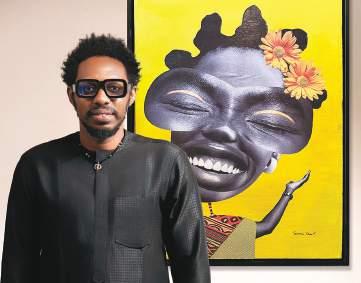


and the Creative Economy.
A first-time meeting with the artist in Abuja lifted the veil on his beyond-the-glare-of-thespotlight persona. It was on a sunny Thursday evening, on June 19 to be precise. A grey airport taxi, having obediently followed the GPS voice prompts, disgorged this writer before a modest bungalow at the end of Kachia Close in Abuja’s sleepy Garki neighbourhood, where the International Institute for Creative Development (IICD) Center unobtrusively called its operational base. As he stepped into the office, travel-weary from an afternoon flight from Lagos, the hum of creative energy wrapped around him like a soothing balm, momentarily easing the fatigue of the journey. Okoeki, clad in a black T-shirt and sporting tufty hair transitioning into dreadlocks and towering above everyone else, rose from his seat to shake hands. Looking more of a techy type than an artist, he radiated an aura of contentment that often accompanies artistic triumphs. He soon learned that he was supposed to be on the same flight with Okoeki, which he had missed by a curious twist of fate, hence his arrival later than expected. The office, meanwhile, with its endearingly disorganised appearance, was a cosy haven, with computer desktops and documents scattered about a longish table like the remnants of a creative brainstorm. The Bohemian setting, replete with teacups and a coffee machine cluttering a sink, added to the ambience, reminding this writer of a creative haven.
Mary Nnah
Visitors to Emmanuel Idowu’s solo exhibition, Echoes of Innocence, which opened on Saturday, July 5, were captivated by the artist’s poignant and thoughtprovoking exploration of childhood memories.
The exhibition, hosted by the Alliance Française in lagos in collaboration with Absa l’Atelier as part of its 2025 Pan-African Gallery Exhibition Series, will run until July 26.
As the 2023 Ambassador of Absa l’Atelier, Idowu utilised the exhibition as a platform to revisit his past and express his experiences in a poetic and emotionally resonant manner.
The artworks, deeply informed by yoruba mythology, bridged Idowu’s narrative with broader cultural themes.
The meticulously arranged exhibition featured artworks that explored the intricate relationship between memory and time, capturing the blurred moments between the past and present. using impressionism and color separation, Idowu created a visual language that not only captured the essence of childhood but also prompted reflection on how these formative memories shape our adult lives.
The artworks depicted children engaged in playful activities, such as swinging and climbing, evoking a powerful sense of nostalgia and contemplation.
Idowu’s unique blend of yoruba philosophy and storytelling was showcased through the incorporation of symbolic objects, including books, flower baskets, and chickens. The flower baskets, filled with delicate blooms, represented the fleeting beauty of childhood moments, while the chickens symbolised continuity, transformation, and the passage of time. The books served as vessels of knowledge, reflecting the formative nature of childhood
learning and experience.
In his remarks, Marc Brebant, Director of Alliance Française in lagos, welcomed the collaboration between Absa and SAVANA, highlighting its potential to promote the creative arts scene in Nigeria and globally. “It’s a tremendous opportunity for us,” he said. “The Absa l’Atelier programme supports young African talents, and as a venue partner, Alliance Française de lagos is thrilled to showcase emerging artists like Emmanuel Idowu.”
Brebant noted that the partnership would enrich the cultural landscape of lagos, encourage the circulation of artists and ideas, and open doors for Nigerians to explore opportunities in South Africa and beyond. “By sharing our heritage and creations, we can enrich each other’s perspectives and foster greater understanding.”
Absa CEO in Nigeria, Sadiq Abu, emphasised the bank’s commitment to promoting creativity and supporting emerging African artists. “At Absa, we strive to help artists navigate the terrain,” he said. “If you’re an artist, you need international exposure, mentorship, and support – which is what Absa, through the l’Atelier competition, aims to provide.”
Abu added, “The creative sector is becoming an increasingly active part of Nigeria’s GDP, and Absa is proud to be partnering with the arts, bringing through the system promising young talent like Emmanuel Idowu.”
Dr. Paul Bayliss, Absa Senior Specialist and Art Museum Curator, praised Idowu’s art, saying, “Emmanuel Idowu’s work forces us as adults to revisit our childhood, capturing it in an authentic African tradition. He remains true to his roots as a Nigerian artist and his yoruba culture.”
Dr. Bayliss also commended Idowu’s unique blend of traditional and contemporary tech-

niques, which sets him apart from his peers.
“By combining old-world techniques with his Nigerian roots, his artwork is reminiscent of the European Renaissance painters. This blend of skill and technique, while staying true to his heritage, is what separates him from his peers and positions him for a continental and global stage.”
In his remarks, Emmanuel Idowu expressed his gratitude to Absa and Alliance Française de lagos for supporting his artistic endeavors. “I’m thrilled to be here, showcasing the body of work I’ve put together for the audience,” he said.
Idowu revealed that the inspiration behind the exhibition came during his artist residency in South Africa, where he conceived the idea for Echoes of Innocence. “The exhibition explores the theme of growing up as a yoruba boy, delving into the methodologies and information passed down through generations that have shaped my artistic vision,” he explained.
With its unique blend of yoruba philosophy and storytelling, “Echoes of Innocence” was a
Aprolonged period of yearning for music and an amazingly fast-paced night were the hallmarks of “The Tales of Expression,” a concert headlined by virtuoso trumpeter Nicholas Emeka, whose showmanship captivated the audience for most of the evening. Featuring a lineup of talented acts, including ClintonicStrings, Progress, Genevieve, The Folks, Preacher’s Kid, and Joseph Ojo, the event took place on Sunday, July 6, at Alliance Française in Ikoyi, lagos. Although it started about an hour behind schedule, the night kicked off with a rousing performance by Victor Odetunde, whose jazzy entrée set the tone with great drums and well-modulated backup singing. The energy became even more soulful with linda 1nneka’s staccatolike delivery, punctuated by rap-infused singing that evoked comparisons to the multi-Grammy award-winning l auryn Hill. Through her intro, linda connected with the audience, presenting herself as a conscious musician who harnesses music as a powerful tool for self-expression, inspiration, social commentary, and personal growth.
She shared her personal struggles with the poignant phrase “2025 has shown me shege.” Her evocative lyrics and melodies resonated deeply with the audience, particularly with her song “Change,” which reflects pressing social issues. linda’s performance was like a soothing balm, providing healing through her masterful storytelling and communitybuilding techniques.
The highlight of the evening was Gen-
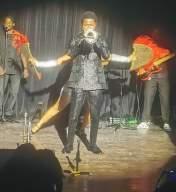
evieve’s captivating performance of the famous operatic song “Habanera,” which was first performed by GalliMarié at the Opéra-Comique in 1875. Genevieve’s mezzo-soprano vocals brought the audience through time, and her innovative rendition, layered with rap vocals from Ken, created an unforgettable harmony that elicited thunderous applause.
Despite technical issues with the sound output, ClintonicStrings arguably put in more effort than anyone else at the concert. His mastery of the violin seemed to take on a life of its own, elevating him to star performer status on the international stage. Clin-
tonicStrings showed impressive resilience in the face of technical issues, engaging the audience with a captivating rendition of Michael Jackson’s classic “I’ll Be There”. Headliner Nicholas Emeka made a legendary entrance, accompanied by drums, a heightened tempo, and a shimmering costume, delivering a medley of classics including Queen’s “We Will Rock you,” SZA’s “All the Stars,” Beyoncé’s “Crazy in love,” and Davido and Omah lay’s smash hit “With you.” The Afrobeats-loving audience responded with a dancing ovation. Emeka’s enthusiastic performance appealed to popular taste, becoming an instant anthem in the dimly-lit auditorium. He skillfully used flexible tempo to lift the mood of the audience. Building on the jazz tradition where musicians use tempo to create surprise and excitement, Emeka made a cakewalk of this technique in ‘Tales of Expression’ by masterfully creating a sense of tension and release, incorporating multiple rhythms and tempos. By seamlessly shifting between fast and slow tempos, he kept the audience engaged. A dramatic interlude of monologue gave way to a slowed-down tempo, which was then quickened again by Pharrell’s global hit “Happy.”
He ended his 30-minute performance with a burlesque-styled rendition of Asa’s “Be My Man.” Interestingly, all the performing artists were alumni of the Music Society of Nigeria (MuSON) who self-funded their own concert. It’s striking that despite showcasing such exceptional musical talent, many Nigerian musicians still struggle for recognition. This raises important questions about the support available to young, classically-trained musicians who are pushing the boundaries of performance, yet remain grossly underfunded.
truly unforgettable experience. The exhibition not only showcased Idowu’s talent and creativity but also highlighted the importance of art in preserving cultural heritage and promoting cross-cultural understanding. As the art world continues to evolve, it will be exciting to see how Idowu’s work inspires and influences future generations of artists and art enthusiasts.
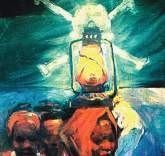
The National Association of Seadogs (Pyrates Confraternity) is set to host its inaugural annual art exhibition, titled Art Ova yap, at the Full Moon Hotel in Owerri, Imo State, Nigeria. The exhibition, scheduled to take place from Thursday, July 31, to Saturday, August 2, will showcase the works of leading contemporary Nigerian artists.
The exhibition will also feature curated works from both emerging and established artists who are active members of the confraternity. The theme of the exhibition is “Artvocacy,” Humanity, and Egalitarianism, highlighting the organisation’s commitment to advocacy, activism, and social impact.
Through this visual art showcase, the Pyrates Confraternity aims to demonstrate how art can be used as a powerful tool for social change. The exhibition will provide a platform for artists to express their unique perspectives and showcase their work, while also exploring the impact of their art on the organisation and the general public.
In light of this, the association invites art enthusiasts, collectors, and anyone interested in contemporary Nigerian art to the exhibition. With its focus on art-vocacy and social impact, “Art Ova yap” promises to be a thought-provoking and inspiring event that will leave a lasting impression on all who attend.
For many Nigerians, the courts have become a source of frustration, not just for issuing frivolous orders or delivering controversial, vague, and inconsistent judgments, but also for the growing delays in providing certified true copies of those judgments to litigants, Davidson Iriekpen writes
One of the major fallouts from the Federal High Court in the suit filed by Senator Natasha Akpoti-Uduaghan against the Senate over her suspension was the delay in releasing the Certified True Copy (CTC) of the judgment. About a week after the verdict, both the Senate and AkpotiUduaghan’s lawyers waited anxiously for the CTC to know the next line of action to take, for a document that should have been released the same day.
CTCs of court judgments are a vital and verified duplicate of the original court decision, officially stamped and signed to confirm their authenticity. They are necessary documents for various legal processes, such as filing an appeal, seeking enforcement of judgments, or proving a court decision in other legal matters.
While the judgments may already be written down, the process of certifying and issuing them is thought to be relatively straightforward—simply requiring the judges to sign off on the written documents and release them to the litigants.
The process for obtaining a CTC typically involves applying to the court that issued the judgment and paying the prescribed fee.
When the judgment in the Akpoti-Uduaghan versus Senate’s case was delivered by Justice Binta Nyako, due to the timely non-release of the CTC, news all over the media platforms and even the suspended senator’s camp was that the court had ordered her immediate reinstatement.
It was a week after when the CTC was released that parties in the suit and Nigerians in general knew that the reverse was the case.
Under the law, CTCs of court judgments are stipulated to be made available within seven days. But many lawyers said they often wait for months to obtain the copies and sometimes miss the three-month deadline to file an appeal. This, lawyers say, has become a big problem in the administration of criminal justice in Nigeria and has led to the denial of justice.
In the United Kingdom and other developed countries Nigeria strive to emulate, from the Magistrate’s Court to the Supreme Court, immediately judgments are delivered, they simultaneously release the CTCs to the public and social media for all to see. The same cannot be said of Nigeria.

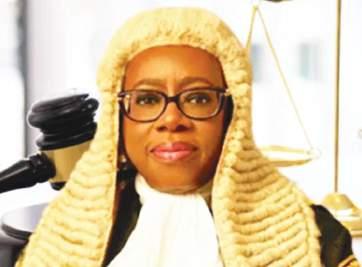
Currently, there are growing concerns over the delay in issuing CTCs of court judgments delivered. Though the judgments were read aloud in open courts for some hours, litigants and legal professionals still wait for the CTCs for weeks and months after their delivery.
These delays usually lead to widespread confusion and misinterpretations surrounding the judgment’s content, with many individuals taking positions based on hearsay or personal sentiment rather than the actual text of the decision.
On many occasions lately, the legal community and the public have had to raise questions on why it takes courts, including the Supreme Court, a long time to produce and issue CTCs after judgments are delivered.
A farmer in Ilawe Ekiti in Ekiti State, Babatunde Adebisi, recalled how the delay in obtaining a CTC of a judgment forced him to forfeit two plots of land in 2015.
Adebisi said his lawyer told him that he was waiting for the copy for more than three months. He believed that he could have reclaimed the land if he had been able to appeal the judgment.
Another litigant’s experience was at the National Industrial Court in Akure, Ondo State.
He said it took more than 90 days to obtain the CTC of the judgment delivered by the court against his client.
Many have attributed the delay in releasing CTCs of court judgments in Nigeria to a combination of factors, including bureaucratic process, inadequate resources and corruption.
There are strong allegations that some delays are perpetrated deliberately to give the judges and even the court officials in connivance with dubious lawyers the opportunity to alter the original judgment to suit a particular party in a dispute.
The difficulties in obtaining CTCs can hinder access to justice for individuals and organisations. In some cases, it may even prevent individuals from pursuing legitimate legal claims.
While the legal framework generally supports the issuance of CTCs, practical challenges in implementation can make it difficult to realise this right.
For example, the Evidence Act 2011 requires CTCs of public documents for admissibility in court, but obtaining them can be challenging. Section 104 of the Evidence Act specifically addresses the admissibility of such documents.
One of the major concerns surrounding the delay is the growing number of misconceptions
about judgments. Those who were not present during the reading of some judgments or have not yet seen the CTC are relying on word of mouth or interpretations from others.
Legal practitioners fear that this could lead to significant errors in understanding, particularly if individuals or media outlets take parts of the judgment out of context.
A legal practitioner, who spoke to THISDAY on account of anonymity, argued that while it is understandable that preparing the CTC may take time, the extended wait is hindering a clear understanding of the judgment.
“The delay is creating room for misinterpretation and misconceptions on several aspects of the judgment. Most of the people taking positions on the judgment have not read it or were not present when it was delivered, which is leading to blind conclusions.”
He emphasised that for those who were present in the courtroom, it is nearly impossible to retain all of the information presented during a one-hour-and-thirty-five-minute reading.
“That’s why the CTC is crucial—it provides clarity and allows for accurate reference,” he added.
“There may be other procedural matters, like ensuring that the judgment is fully accurate and in line with legal norms, that could explain the delay. But the lack of transparency in how long this takes is undoubtedly raising questions about efficiency,” said another lawyer who did not want his name mentioned.
The delay in releasing the CTC of the judgment of the Federal High Court in Abuja is also drawing attention to broader concerns about the pace of the judicial process and the need for the courts to streamline their procedures.
As the final arbiter in the nation’s legal system, courts’ decisions hold significant weight, and ensuring transparency and clarity in their processes is essential for upholding the rule of law and public confidence.
While it is understood that courts have internal processes to manage, it is clear that the timely issuance of CTCs is critical for the public, litigants, and legal practitioners alike. The public trust in the judiciary’s work depends on its ability to provide clear, accurate, and prompt judgments.
For now, litigants and the public are hoping for a more efficient system moving forward. The courts should address this issue to prevent future delays and confusion.
It was not until the Certified True Copy (CTC) of Justice Binta Nyako’s judgment in the case instituted bySenatorNatashaAkpoti-UduaghanagainsttheSenate was released that Nigerians knew how controversial the verdict was.
In her judgment, the judge described the suspension as “excessive” and faulted the provision of Chapter 8 of the Senate Standing Rules, as well as Section 14 of the Legislative Houses, Powers & Privileges Act. He declared both as overreaching.
According to her, since lawmakers have a total of 181 days to sit in every legislative cycle, the six-month suspension handed to Akpoti-Uduaghan was akin to pushing her away from her responsibilities to her constituents for about 180 days.
The judge held that though the Senate has the power
to punish any of its members who breaches the rules, such sanction must not be excessive to deprive the constituents of their right to be represented.
However,thequestiontoaskishowonearthdidJustice Nyako arrive at all the above assertions and still fail to make a declarative order for Akpoti-Uduaghan’s immediate recall?
Manyarealsoshockedthatshedidfollowprecedents in the plethora of cases on suspension of lawmakers?
HowwastheAkpoti-Uduaghan’scasedifferentfrom Senators Ali Ndume, Ovie Omo-Agege, and even Dino Melaye and 10 members in the House of Representatives, and other state lawmakers where the courts nullified their suspensions, ordered that they should be recalled and their withheld salaries and allowances be paid to them?
When did the courts become advisers that Justice Nyako had to offer advisory opinion urging the Senate to reconsider the suspension instead of issuing a binding directive enforcing Natasha’s reinstatement, after concluding that suspending an elected lawmaker for six months effectively denies a constituency its right to representation.
The judgment has joined the growing list of incongruous, incoherent and controversial judgments fuelling loss of confidence in the judiciary.
It was the same way the Supreme Court delivered vagueandcontroversialjudgmentsthatfailedtoaddress the leadership crises in the Peoples Democratic Party (PDP) and Labour Party (LP).
This is a pure act of judicial indiscretion on the part of Justice Nyako. Simple.
Despite some private hospitals in Nigeria attaining world-class status and Nigerian doctors competing favourably with their foreign counterparts, the country’s past and present leaders have continued to shun Nigerian hospitals. ejiofor Alike reports
Nigeria was thrown into mourning last Sunday when the death of former President Muhammadu Buhari was announced by his family.
His death at a London clinic, however, exposed the failure of successive Nigerian leaders to fix public hospitals and their apparent lack of faith in the country’s world-class private hospitals.
Forty-two years after Buhari overthrew ex-President Shehu Shagari’s administration in a military coup partly on the ground that Nigerian public hospitals had become “mere consulting clinics without drugs and equipment,” these public hospitals are still not adequately equipped to cater for the country’s leaders and their families.
Consequently, Nigeria’s successive leaders have continued to waste public resources trooping to hospitals in Europe and other parts of the world to visit their loved ones in sickbed, or seek medical treatments, despite the significant improvements in healthcare delivery in private hospitals in Nigeria.
Since he assumed power, President Bola Tinubu is believed to have spent over 50 days in at least eight separate visits to France.
Critics have raised concerns over the frequency of the visits, with insinuations in some quarters that some of the trips were related to medical tourism, especially as they have not been reciprocated by President Emmanuel Macron.
Before the late President Umaru Musa Yar’Adua died on May 5, 2010 at the Presidential Villa in Abuja, he was treated at a hospital in Saudi Arabia from November 24, 2009 until he was brought back to Nigeria on February 24, 2010 when his health deteriorated.
Though not at the expense of public resources, Buhari was receiving treatment at a London clinic until he died.
His death at a foreign hospital, however, dipped into public resources as President Bola Tinubu sent Vice President Kashim Shettima-led delegation on two different occasions - to visit him at his sickbed, and later to accompany his body back home for burial.
“I was there for two days and when he answered the call of Allah, the president equally directed me and the Chief of Staff to go and accompany the family and the body of the late president back home,” Shettima reportedly explained.
Other public officials also rushed to London at the expense of government’s resources.
The trips to London by Shettima and other public officials were not the first time public resources were expended in the course of the former president seeking medical care
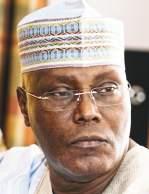
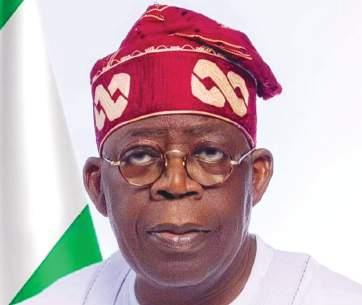
in foreign hospitals.
As the President of Nigeria from May 2015 to May 2023, Buhari was believed to have spent about 200 days on medical leave in foreign hospitals despite the Federal Ministry of Health receiving over N2 trillion during the period.
The State House Medical Centre also received billions of naira, according to reports by the Budget Office of the Federation.
The presidential clinic is meant to cater for the president, vice president, their families and members of staff of the Presidential Villa, Abuja, but these public officials and their families have always demonstrated preference for foreign hospitals, due largely to the poor state of Nigeria’s public hospitals and a lack of faith in private hospitals.
Former Vice President Yemi Osinbajo had in July 2022 attempted to break this tradition of patronising foreign hospitals by Nigerian leaders by undergoing a life-saving surgery at the Duchess International Hospital, Ikeja, Lagos, which provides access to affordable world-class healthcare.
Osinbajo successfully underwent a surgical procedure on his femur at the hospital, a new facility under the Reddington Hospitals
ThedefectionofformerVicePresidentAtikuAbubakar fromthePeoplesDemocraticParty(PDP)totheAfrican DemocraticCongress(ADC)hasfuelledthespeculations thathewilldarecriticswhohavemockedhimandlabelled him serial contestant, and vie for the presidential seat in the 2027 elections.
However,hisdefectionfromthePDPisnotnewasAtiku hadleftthepartyandre-joineditseveraltimesinhisover decade efforts to realise his presidential ambition.
He left PDP in 2006, re-joined in 2007, left again in 2014, and finally came back in 2017.
In2006,helefttocontestandbecamethepresidential candidateofthedefunctActionCongressofNigeria(ACN) inthe2007generalelectionbutwasdefeatedbyPresident Umaru Yar’Adua.
AtikureturnedtoPDPtocontestthe2011presidential election,andwasdefeatedbyPresidentGoodluckJonathan.
group in Lagos.
Osinbajo had earlier in October 2021 inaugurated the Duchess International Hospital.
Speaking at the inauguration, he had insisted that Nigeria has world-class talent, world-class ideas and world-class execution of ideas, adding that the hospital would make the country a destination of choice for medical tourists even from developed countries.
“We have all it takes to become the place of choice for even medical tourists from developed countries looking to jump long queues for specialised procedures at home or simply shopping for more affordable fees for first-class healthcare,” Osinbajo explained.
Later, while narrating his experience after his successful surgery at the hospital, Osinbajo stated that “by both medical and aesthetic standards, the Duchess Hospital is comparable to the best hospitals anywhere in the world.”
Indeed, Nigeria has world-class medical professionals and some of these experts work in some of the foreign hospitals being patronised by Nigerian leaders.
Before Osinbajo’s case, Buhari’s son, Yusuf,
who was involved in a motorbike accident in Abuja on December 26, 2017, was admitted into Cedarcrest Hospitals, Abuja, where he underwent successful emergency surgical operations carried out by a team of neurosurgeons and orthopaedic surgeons, and was discharged in January 2018.
However, the rare show of confidence in private hospitals exhibited on these two occasions by Osinbajo and Buhari’s family was not sustained as Nigeria’s past and present leaders and their families, including the late president himself, continued to patronise foreign hospitals.
Responding to criticisms over Buhari’s repeated medical trips to the United Kingdom while in office, his former Special Adviser on Media and Publicity, Mr. Femi Adesina Adesina said the former Nigerian leader would have not survived his health challenges if he had relied solely on Nigerian hospitals for treatment.
“Buhari always had his medicals in London, even when he was not in the office,” Adesina explained.
Adesina’s claim was a confirmation of Buhari’s lack of confidence in Nigerian hospitals.
The former Military Head of State, General Abdulsalami Abubakar (rtd.) had also revealed that he was admitted in the same London hospital with Buhari before his death.
Many believe that Buhari’s death in a London hospital has exposed the hypocrisy of successive Nigerian leaders and their failure to fix the country’s public hospitals.
The late president had led other military officers to overthrow Shagari on December 31, 1983, accusing the civilian administration of turning public hospitals to “mere consulting clinics without drugs and equipment.”
But ironically, his military regime which lasted for close to two years and his civilian administration that lasted for eight uninterrupted years could not fix any public hospital in Nigeria to be able to take care of the health needs of the president and past presidents and their families.
It is very shameful that the leaders of the giant of Africa have continued to search for foreign hospitals for themselves and their loved ones, instead of fixing government hospitals or patronising world-class private ones to save scarce public resources.
The rush to the London hospital by serving public officials to bring back Buhari’s body ought to have been an embarrassing moment for the Nigerian leaders if they truly understand their responsibilities as leaders.
He left again around 2014 to the All Progressives Congress (APC), where he contested the presidential ticketofthepartybutwasdefeatedbyformerPresident Muhammadu Buhari.
HereturnedtothePDPin2017andemergedtheparty’s presidential candidate in the 2019 general election but Buhari defeated him.
AtikualsocontestedandwonPDP’spresidentialticket in 2022, but lost the 2023 presidential election to the incumbent President BolaTinubu.
Inall,hehascontestedandlostthepresidentialticketof politicalpartiestwiceandalsolostthepresidentialelection three times, becoming a serial contestant, according to his critics.
Atikuhasalsoestablishedareputationforchallenging thesecondtermambitionsofeveryincumbentpresident, including those belonging to his political party.
His joining the ADC is an indication that he will vie for the presidential ticket of the party, despite attacks by criticswhoadvisedhimtoretireandgivewaytoyounger generations.
Thequestionis:CanAtikurealisehisage-longambition in2027,giventhemoodofthenation,whichfavoursthe South completing eight years before power rotates to the North?
OyoStateGovernor,SeyiMakindesaidhisexitfromthe PDPisagoodriddancetobadrubbish,andalsodismissed the idea of ADC being an alternative to PDP.
Whatever may be the case, Atiku’s defection to the ADC is a strong indication that he has not given up on his ambition to occupy the number one seat in the country, anambitionthatalmostmadehimtocontestagainsthis boss,formerPresidentOlusegunObasanjo,inthe2003 presidential election.
Vincent Obia writes on the next phase of the Nigerian politics after the late former President Muhammadu Buhari, especially the question of who would inherit his
Nigerians gathered in Daura, Katsina State, on Tuesday to bid farewell to the late former President Muhammadu Buhari. It was a grand event that brought together people from different walks of life, across social classes, from Nigeria and beyond.
In his honour, a huge funeral parlour appeared in his Daura hometown from Sunday, July 13, when news of his death at a London clinic broke. With the funeral over, the next question on the minds of many in Nigeria’s political circles is the fate of Buhari’s seemingly dedicated vote bank.
Buhari, who died at 82, was military Head of State from 1984 to 1985, and civilian president for two terms, from 2015 to 2023. He was one of only two Nigerians who had transmuted from a military ruler to democratically-elected leader. Before winning the presidential election in 2015, he had contested three times, consecutively in 2003, 2007, and 2011, maintaining a consistent 12 million plus votes in two election cycles – 2003 and 2011. He did below the 12 million count in 2007, when he contested against a fellow Katsina man, Umaru Yar’Adua, amid allegations of vote rigging.
Buhari’s loyal bloc of supporters has been an important factor in Nigerian politics since the Fourth Republic. In 2003, he polled 12.4 million votes (32 per cent of the votes cast) on the platform of All Nigeria Peoples Party (ANPP), and lost to President Olusegun Obasanjo, who got 24.1 million votes (61 per cent of the votes) under Peoples Democratic Party (PDP).
In the 2003 election, Buhari won in Bauchi, Borno, Gombe, Jigawa, Kano, Katsina, Kebbi, Sokoto, Yobe, and Zamfara.
Buhari got 12.2 million votes (31.9 per cent of the votes) in 2011 on the platform of Congress for Progressive Change (CPC), against President Goodluck Jonathan’s 22.4 million votes (58.8 per cent of the votes). He won in Adamawa, Bauchi, Gombe, Jigawa, Kaduna, Kano, Katsina, Niger, Sokoto, Yobe, and Zamfara.
The late president had maintained a fairly consistent community of voters in the North-east and North-west geopolitical zones, until 2015, when he expanded his voter base to other parts of the country, especially the South-west, under the All Progressives Congress (APC) coalition.
With the decades-old allegiance of Buhari’s followers now up for grabs, the question is, are there potential heirs to his legacy?
A close associate of the late president, who served as Attorney-General of the Federation (AGF) and Minister of Justice in his administration, Abubakar Malami, (SAN), has declared that any potential inheritors of the loyalty of Buhari’s electoral bloc must fit into certain characteristics.
Malami said on Channels TV, “Buhari left behind a legacy and that legacy is the legacy of service. He left behind the legacy of the votes. They are votes that are rooted in service; they are rooted in transparency, accountability, and above all, sacrifice.”
Buhari was popular with the downtrodden in the north – talakawas – and he was respected by the elite in the region. Yet, none among the elite seems to have the cult following he had.
Before the 2023 presidential election, there were claims of inheritance of the votes of the then retired Buhari by some northern candidates.
Atiku’s campaign spokesman, Daniel Bwala, said on ARISE TV, “Atiku has inherited the over 12 million votes that Buhari has carried for these years. All you need to do is to look at the Katsina rally, and to look at all the rallies of APC in the North-central and North-west. Any time they chant Nigeria, the people will say, sai Atiku. It is a movement.”
Atiku was presidential candidate of PDP in the 2023 general election.
The spokesman of the New Nigeria Peoples Party (NNPP) presidential campaign committee, Abubakar Yesufu, also made a similar claim before the 2023 poll. Yesufu said the NNPP presidential candidate, Rabiu Kwankwaso, was set to inherit Buhari’s votes.
Yesufu stated, “Kwankwaso is the true representative of the north. He is set to prove this fact on February 25. He is set to claim Muhammadu
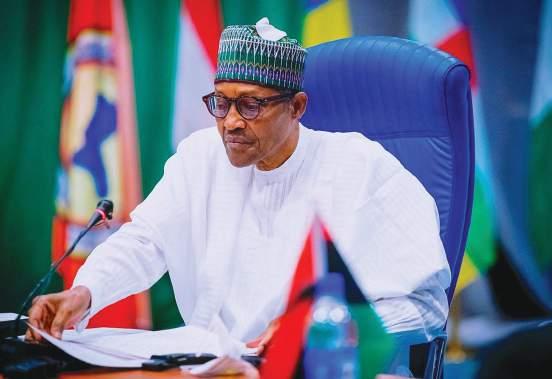
I can’t see any individual in the north, any governor, who can go against his wishes without paying a price.” “The style of the presidency of Buhari is a personality cult, a personality cult president, who just says this is what I want and everybody falls in line.”
Buhari’s 12 million votes in the kitty.”
In a veiled reference to Atiku, Yesufu added, “From the late Ahmadu Bello, Alhaji Tafawa Balewa, Alhaji Shehu Shagari, Alhaji Aminu Kano to President Muhammadu Buhari, none has exhibited vulgar wealth as those presently masquerading as leaders.”
Despite the claims, neither Atiku nor Kwankwaso came close to inheriting the votes Buhari left. Though Atiku won in some of the traditional Buhari states in the north, the win could be attributed to the influence of the state governors, who supported him.
But Buhari put up a good fight against the opposition in politics on the strength of his own personality. For instance, he performed impressively in 2011 on the platform of CPC without the party having any governor from that election.
Kwankwaso won only in Kano State during the 2023 election.
Will President Bola Tinubu stand a chance of inheriting the votes?
Outside the north, taking over Buhari’s northern electoral base would be quite challenging due to entrenched cultural and
emotional issues. If not, President Tinubu could easily have filled the void and inherited the votes for the APC, given that Buhari belonged to the same party with Tinubu, who was instrumental to Buhari’s 2015 electoral victory.
For similar reasons, also, the Labour Party (LP) presidential candidate in 2023, Peter Obi, would find it difficult to establish any beneficial links with the electoral base Buhari left behind, despite sharing some ideological beliefs with the former president.
Veteran journalist and former political adviser to Obasanjo, Akin Osuntokun, said during the Buhari administration, “Apart from being the president, he has always been a hero to a large number of people who are going to vote, which reinforces his capacity to determine who would go.
“I can’t see any individual in the north, any governor, who can go against his wishes without paying a price.”
Osuntokun added, “The style of the presidency of Buhari is a personality cult, a personality cult president, who just says this is what I want and everybody falls in line.”
Nigeria, for now, does not seem to have a rallying figure capable of inheriting Buhari’s northern electoral stronghold. What appears feasible is a
dispersal of his bloc of supporters among key northern politicians, with a strong tendency for shifting loyalties. Generally, loyalty is cultivated, not conferred. Leaders who stir the hearts of their people do so on the altar of personal sacrifice, which warms them to the people and sets them apart from the crowd. It is hardly inherited. Which explains why no one in the South-west, for instance, was able to inherit the cult following of Chief Obafemi Awolowo. And in the north, followers of leaders, like Ahmadu Bello and Aminu Kano, were hardly inherited.
The exit of Buhari, thus, seems to open a new chapter in the country’s political journey, which would increasingly de-emphasise the influence of cults of personality in politics.
A member of African Democratic Congress (ADC), Mallam Salihu Lukman, said the death of Buhari signified an end to the era of creating leaders with an image of infallible heroes, whose political endorsements or nominations are automatically taken as victory.
Lukman stated, “What we must learn, most especially in the coalition, is that we don’t have somebody with the kind of intimidating profile like that of late Buhari and what that means is that all the leaders of the coalition need to be humble and acknowledge that they need one another, and in the context of that, develop a strong team work. I think that is the challenge we are all facing. Our leaders must have a kind of team spirit.”
He said politicians must begin to take issues of humility in public office, fulfilment of campaign promises, and negotiation of good relationships with the citizens more seriously.
In the new political chapter, democratic institutions, like the Independent National Electoral Commission (INEC), would need to be strengthened, with more attention paid to democratic principles, such as the rule of law and separation of powers. It would also involve promoting the culture of accountability, and change from personality-driven to issue-based politics.
The next few months, especially the period before the 2027 general election, will be critical in determining the colour of politics in Nigeria after Buhari. This is as the fate of his followers and their votes remains uncertain.
Picture this: a bold roadmap to ignite Nigeria’s economic transformation—an audacious, actionable blueprint for inclusive growth, security, and global competitiveness. Whether the ADC seizes it as their defining agenda or the APC leverages it to revitalise national governance, this vision could catalyze the breakthrough Nigeria urgently needs.
An overview of the current economic climate highlights pressing challenges and opportunities. The landscape is shaped by multiple factors including global and domestic pressures.
Nigeria truly stands at a crossroads. Entrenched cycles of economic volatility, pervasive insecurity, and chronic underutilization of its vast human and natural resources have persisted under the current administration. The emergence of the African Democratic Congress (ADC) as a credible coalition and alternative to the ruling All Progressives Congress (APC) represents a timely opportunity to reset Nigeria’s trajectory and engineer a breakthrough transformation akin to those witnessed in Singapore, China, Brazil, and other rising economies. To achieve this, the ADC must set a bold, pragmatic agenda that addresses foundational economic weaknesses, fosters sectoral reinvention, and positions Nigeria as a global competitor in the 21st century.
I Propose to Set This Out: as a “To-Do List.”
1. General State of the Economy: The Imperative for Structural Reform Nigeria’s economic fundamentals remain fragile. With GDP growth averaging 2.7% in recent years—barely above population growth— unemployment and underemployment rates hover at over 33% and 22% respectively (NBS, 2024). Oil, which accounts for about 7% of GDP but over 85% of export revenues, exposes the nation to external shocks (World Bank, 2023). The ADC’s economic stewardship must prioritize diversification, productivity, and broad-based growth.
• Macroeconomic Stability: ADC must adopt prudent fiscal and monetary policies focused on inflation targeting, debt sustainability (public debt at 41% of GDP), and disciplined public expenditure (IMF, 2023).
• Human Capital & Innovation: Investments in health, education, and digital skills must be doubled. Nigeria lags behind peers like Malaysia and Turkey in education expenditure as a share of GDP (World Bank, 2023).
2. Tackling Insecurity: Global Best Practice Approaches
Security issues continue to impact economic activities and overall national stability. Addressing these concerns remains central to fostering growth and investor confidence. Insecurity - manifest in insurgency, banditry, and kidnapping - undermines economic activity, erodes investor confidence, and exacerbates poverty. ADC’s approach should encompass:
• Integrated Security Architecture: Establish a National Security Coordination Centre, leveraging intelligence sharing, modern surveillance technologies, and community policing (Geneva Centre for Security Sector Governance, 2021).
• Socio-Economic Inclusion: Address root causes of insecurity by targeting youth unemployment through skills training and social entrepreneurship (see Brazil’s Bolsa Família and Indonesia’s Kartu Prakerja).
• International Collaboration: Forge intelligence-sharing pacts with ECOWAS, the African Union, and global partners for coordinated anti-terrorism efforts.
3. Cushioning Cost-Push Inflation Induced by Subsidy Removal
With the removal of subsidies leading to cost push inflation, there is an urgent need for effective cushioning measures. These actions aim to mitigate the impact on citizens and maintain economic stability.
The removal of fuel subsidies, though fiscally advisable, has fuelled inflation, eroding household purchasing power. ADC should

implement:
• Targeted Social Transfers: Expand conditional cash transfers to the poorest 40% of households, modelled after Brazil’s Bolsa Família, using transparent biometric systems (World Bank, 2022).
• Transport and Production Subsidies: Temporarily subsidize public transport and key agricultural inputs to reduce immediate inflationary pressure.
• Strategic Grain Reserves: Adopt best practices from India and China in maintaining and releasing grain reserves to stabilize food prices.
4. Exchange Stability: Prerequisite for Economic Confidence
Ensuring the stability of the exchange rate is critical. Volatility in currency markets affects trade, investment, and the general cost of living.
Exchange rate volatility undermines planning and investment. The ADC must:
• Adopt a Managed Float Regime: Allow market forces to determine rates within a managed band, as Malaysia and Turkey have done successfully (IMF, 2021).
• Boost Non-Oil Exports: Incentivize agro-processing, ICT, and manufacturing exports to increase FX supply.
• FX Reserve Management: Enhance reserves through prudent oil revenue management and diaspora bonds, following China’s example.
5. Power Sector Transformation: Catalyst for Industrial Revolution
Reforming the power sector is seen as a pivotal driver for industrial revolution and promotes import substitution industrialisation strategies.
Reliable electricity supply is fundamental for industrialisation. Nigeria currently generates just 4,000–5,000 MW for over 200 million people, compared to South Africa’s 58,000 MW for 60 million (IEA, 2023). ADC must:
• Accelerate Power Privatization: Deepen reforms in generation and distribution, clarifying contracts and enforcing performance benchmarks.
• Expand Off-Grid Renewables: Support solar mini-grids and hybrid solutions for rural electrification, leveraging models from India and Kenya.
• Subsidize Industrial Tariffs: Implement phased tariff reliefs for manufacturing and SMEs to drive import substitution and job creation.
6. Oil Sector Transformation: Building Resilience and Value Addition
Transforming the oil sector is essential for economic diversification and increased efficiency. This sector remains a significant contributor to national revenues and development.
Nigeria must transition from crude oil dependency to value-added petrochemicals and refined products.
• Petrochemical Hubs: Establish industrial clusters for refining and chemical processing, modelled after Singapore’s Jurong Island and Saudi Arabia’s SABIC complexes.
• Gas-to-Power Prioritization: Develop domestic gas infrastructure to power industry and reduce flaring, drawing on Qatar’s LNG-led diversification.
• Transparent Contracting: Digitize licensing and royalties to reduce leakages and attract reputable global partners.
7. Cutting Edge Infrastructure: The Bedrock of Growth
Infrastructure investment - roads, rail, ports, ICT - is the backbone of sustained growth (see China’s Belt & Road).
• Public-Private Partnerships (PPP): Establish credible frameworks to attract private capital, as in Indonesia and Turkey.
• Smart Cities: Partner with global tech firms to pilot digital cities and e-governance.
• Logistics Corridors: Prioritize regional corridors connecting hinterlands to export gateways, as in Brazil’s “Arc of Development”.
8. Energy Transition: Pathway to Sustainable Prosperity
Transitioning the energy sector towards more sustainable sources is a key priority. This shift supports environmental goals and long-term economic resilience. The global pivot to renewables is both an opportunity and necessity.
• Solar and Wind Scale-Up: Target 30% renewable generation by 2030, leveraging the successes of Morocco and South Africa.
• Green Finance: Structure climate bonds and concessional facilities, learning from Qatar and Saudi Arabia’s Vision 2030.
• Local Content Development: Incentivize domestic manufacturing of solar panels and batteries, building a supply chain hub for West
Africa.
9. Unlocking Marine and Blue Economy Potential
The development and utilization of marine and blue economy resources present opportunities for growth. This sector offers untapped potential for diversification and sustainable development.
Maritime resources - fishing, shipping, tourism - are underexploited. The sector contributes less than 2% to GDP, compared to 8-10% in countries like Indonesia and Turkey (UNCTAD, 2022).
• Modernise Ports: Automate port operations and expand capacity at Apapa and Onne, as Rotterdam and Singapore have done.
• Fisheries and Aquaculture: Develop integrated value chains exporting processed fish, following Norway’s model.
• Coastal Tourism: Partner with private investors and local communities to develop eco-friendly resorts and cruise terminals.
10. Mining Sector: Nigeria’s Untapped Wealth
Nigeria’s mineral endowments - gold, lithium, iron ore - remain underdeveloped. In comparison, mining’s share of GDP is less than 1%, while in South Africa it accounts for 8%, Botswana 16%, and Australia 10% (Statista, 2023). South Africa’s mining revenue was $24.5bn in 2022, Botswana’s $6bn, and Australia’s a staggering $250bn. European countries like Sweden and Finland also generate billions annually, underlining the transformative potential.
• Policy Certainty: Pass and enforce miningfriendly laws, clarify royalties, and guarantee security of tenure (PwC, 2022).
• Investment Promotion: Establish a onestop investment agency, modeled after Brazil’s National Mining Agency and Australia’s Austrade, to attract majors like BHP, Rio Tinto, and Glencore.
• Environmental Stewardship: Implement best-in-class ESG standards to assure global investors.
11. Lessons from the BRICS and Beyond: Nigeria’s Leapfrog Moment
The stories of Singapore, Malaysia, China, Brazil, Indonesia, and the Gulf states show that economic transformation is possible with:
• Visionary Leadership: Consistent long-term planning insulated from short-term politics (Singapore’s Economic Development Board; China’s Five-Year Plans).
• Institutional Reforms: Combat corruption, strengthen the judiciary, and promote transparency (see Qatar’s single window for investment).
• Export-Led Growth: Empower domestic firms to compete globally, with targeted support for high-potential sectors.
12. Unlocking Opportunities: Attracting Foreign Direct Investment (FDI)
To attract the likes of BHP Billiton and other global majors, Nigeria must:
• Guarantee Regulatory Certainty: Ensure clear, stable, and predictable regulatory environment.
• Develop World-Class Infrastructure: Invest in logistics, ICT, and energy to lower production costs.
• Prioritize Security: Provide guarantees for physical and legal security in mining zones.
• Tax Incentives and Royalties: Offer competitive fiscal terms, learning from Botswana and Australia.
Final Words
The ADC’s agenda must be transformative, holistic, and implementable. By addressing economic fundamentals, embracing global best practices, investing in human capital, and unlocking Nigeria’s mineral and maritime wealth, the ADC can chart a path to inclusive prosperity. The next leap forward will not come from incremental change, but from bold, evidence-based reforms drawing on the best of global experience.
•Ashiekaa is an international consultant, policy analyst, oil & gas professional and President/CEO, Bel Air Capital Int’l Limited.
stood in his corner. It was a badly conducted election, one of the most rigged in our history as at then. Even the Supreme Court admitted it, only saying that there was “substantial compliance” and that if the bloated figures were cancelled, Buhari would still not win. The 2007 election turned out to be worse than 2003 and Buhari headed for the courts again. Because his opponent, Alhaji Umaru Musa Yar’Adua, was also from Katsina state, Buhari was asked to withdraw his petition in the interest of brotherhood. I called to get his reaction and he said bluntly: “I am only thinking about Nigeria, not Katsina state. There is no room for sentiments.”
Buhari was always ready to meet with me to discuss the state of the nation, mostly off the record. However, when I met him in London in May 2009 in company with my friend, Mallam Aminu Hammanyero, I decided to pen the encounter because he said things I did not want to keep to myself. My article was titled ‘Leadership without Conscience’ (THISDAY, May 24, 2009). He was critical of the Yar’Adua administration for reversing Obasanjo’s policies, saying: “When I became head of state in 1983, I announced that we would honour every international obligation, even though some were entered into wrongfully by the previous government. But an agreement is an agreement.”
He said after taking a look at the country for decades, “I came to the conclusion that our leaders do not have conscience.” As evidence, he said: “I was in Calcutta (now spelt as Kolkata), India, in 1972 for my staff training. I remember that the same way refuse collectors come around in the morning was the way undertakers were going round every morning collecting dead bodies for burial. India
ON THE MARCH AGAIN
Alhaji Atiku Abubakar has officially resigned from the Peoples Democratic Party (PDP) to join the African Democratic Congress (ADC). This is the third time the former vice-president would resign from the PDP to pursue his presidential ambition elsewhere. He will be 79 during the 2027 elections and this must be considered his final realistic chance of being elected president, but you never know. By leaving the PDP, Atiku has somehow outwitted Chief Nyesom Wike who might have thought his stranglehold on the once-great party would stifle the plans of his rivals. I think the ADC option is a smart, strategic choice by the opposition. It is now up to them to make the best of it. Fascinating.
2007 elections but either the discussions fell through or the permutations were not consequential enough). In 2015, key segments of the political class and the electorate came together to create a national moment, the Buhari moment.
That moment was possible because most of the voters either wanted, or had been mobilised to want, anyone but the incumbent, President Goodluck Jonathan. But ‘the-anyone-but’ thesis should be properly dimensioned: it was not just anyone that could dislodge an incumbent in a developing country like ours. A retired general with a stern visage and an ascetic lifestyle, Buhari offered a credible and persuasive alternative to the pervasive insecurity and corruption that a sizeable number of Nigerians wanted to move away from at that point. No other aspirant or candidate in the race of that season boasted of that combination. But Buhari had something else: a steady and sturdy bank of 12 million loyal votes.
With such a candidate on its top ballot, the opposition stood a fairer chance of success. And not surprisingly, though a major historical shift, the 12 million votes swelled to 15 million votes in 2015. Being in office tested Buhari’s mystique and reduced his popularity and ratings, especially among those that swung to Buhari’s side in 2015 and some avid marketers who had projected the things they would like to see in a president unto Candidate Buhari. But my sense is that the core of his bank of 12 million loyal voters survived, and that most of the 2027 presidential aspirants hope to inherit Buhari’s mantle or at least do not want to excite strong negative emotions from the late president’s loyal base. It must be said that this attempt at appropriation or appeasement is not new, too: we saw similar aspirations after the passing of Awolowo and Azikiwe.
How Buhari came to acquire his mass appeal should be of scholarly interest. His following didn’t come from fiery or rousing oratory. Unlike Azikiwe, Buhari was actually a man of few words and was soft-spoken. The appeal didn’t come from a documented body of thoughts or ideas, unlike an Awolowo whose books
was facing harsh economic and food crises then. Yet, with purposeful leadership, India had become a different country in a matter of 10 years. When I became head of state in 1983, I was amazed to discover that Nigeria was importing rice from India. That is what purposeful leadership can do.”
I wrote on my encounter with him and he was surprised at how well I captured his thoughts. “Simon, I did not see you with a tape recorder,” he joked. I didn’t capture everything, though. For instance, I recall asking him if it was true Idiagbon was the one running the show when he was head of state. He denied it. “Tunde’s role was to announce the decisions of the Supreme Military Council and interface with Nigerians. There was nothing he announced that was not discussed and agreed upon in council. He did not take any decision by himself.” This was unknown to most Nigerians and that must have fuelled the assumption that whoever ended up as his vice-president would be the one in charge.
When he threw his hat into the presidential ring again in 2011, he asked the late Mallam Abba Kyari to offer me the position of campaign spokesman but — to his disappointment — I said I was not interested in politics. Ironically, it was the same election that dampened my affection for Buhari. I had expected him to come out forcefully to condemn the post-election violence, but his response deeply disheartened me. I then wrote a critical article on politicians and violence, asking: must you serve the people by force? Buhari believed it was aimed at him. He gave me a call. “Simon, thank you for abusing me today,” he said and laughed, but insisted his supporters suffered attacks as well.
With the formation of the All Progressives Congress (APC), it appeared the stars were finally aligning in his favour. He sent a hearty congratulatory letter to me after the launch of TheCable in April 2014 and granted us an interview later in the year. I did the interview along with my colleague, Frederick Nwabufo, and I recall eating a dinner of jollof rice with fried chicken. Mallam Ya’u Darazo, Buhari’s long-term ally, helped to facilitate the interview. By then, I had become a curable optimist. I no longer thought one man could save Nigeria. Agreed, leadership at the very top is important, but in a democratic federation of 36 states, it will take more than one man to tackle underdevelopment.
After he won the 2015 election, I called to congratulate him. The phone was often with his aide, Mallam Sarki Abba, and I assumed it was Abba’s. It rang out. A day later, I got a call from the number. “Mallam, I tried to reach you yesterday,” I said, thinking it was Abba. The voice said: “How are you, Simon? This is General Buhari.” I froze in disbelief. He went on: “I had several missed calls. Sorry, I’m just returning yours.” I congratulated him. But in my mind, I did not expect miracles. Boko Haram would not vanish overnight. The economy would not recover magically. Despite the sweet campaign promises, I knew there was no easy way out. Pains awaited us no matter the choices he made.
My final one-on-one with Buhari was in October 2018, this time in Aso Rock. I offered a frank assessment of his administration, specifically the security situation and the in-fighting in his government. I said to him:
“People are asking, where is the Buhari of 1984?”
On the menace of the herdsmen, he asked me:
“Do you honestly believe I asked herdsmen to be
Here we go again. When President Obasanjo sold two refineries in 2007, we screamed “cronyism”. The reversal of the sale by President Yar’Adua not only perpetuated the rehabilitation fraud but we also ended up 100 percent dependent on imported petrol, burning precious forex. At a time, we were spending almost all our forex earnings on fuel imports. We were even mortgaging future crude output just to import petrol. Well, after a reported $18 billion wasted on “rehabilitation” in 18 years, we are yet to get an apology from the do-gooders, who have again started opposing selling the refineries. A sensible thing would be to insist on due process in line with the PIA 2021. Regressive.
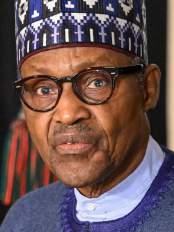
are still being read and cited till today. It was also not from a deeply ideological position, unlike an Aminu Kano. Buhari had some positions about certain things, especially on the economy, but those were not rooted in ideological postulations. And crucially, Buhari’s mass appeal wasn’t created and nurtured by an entrenched political machine. Yes, there was a group called The Buhari Organisation but it doesn’t have the organisational muscle of traditional political organisations.
Buhari was the organisation and his mass appeal, even when extended by a combination of factors and actors, was inherent in Buhari himself. It wasn’t about what he said or wrote, but it was in the story told powerfully by his lifestyle in contrast to others with a fraction of the opportunities that he had in public office. Buhari was governor of North Eastern State
Last week, I went hard on Mr Boss Mustapha, the former SGF, for appearing to downplay the role of the other parties in the merger that brought President Buhari to power in 2015. After seeing the video, I realised I misunderstood his analysis that the other parties (including the ACN, of which he was deputy national chairman) brought only “three million votes” to the merger, with Buhari providing his regular 12 million. Apparently, he meant they took a strategic decision to merge with Buhari’s CPC because of his vote bank. He was not downplaying the “three million”. Ironically, his attempt to hedge with “this may sound controversial” only stirred controversy. Self-fulfilling.
(today’s Borno, Yobe, Bauchi, Gombe Adamawa, and Taraba states), the minister of petroleum resources in the thick of an oil boom, a military head of state, and the head of a well-resourced interventionist agency, the Petroleum Trust Fund (PTF).
Despite all these, Buhari was a man of modest means and simple lifestyle. For those socialised to worship wealth no matter the source or conditioned to see public office as a legitimate path for private advantage, there was nothing worth seeing here.
But for the masses at the receiving end of the rapaciousness of the elite, Buhari was a refreshing oddity, a positive outlier. When Buhari decided to throw his hat into the political ring in the early 2000s, the northern masses took to him instantly, cast him in the garb of the long-awaited messiah, and the organic love-affair endured. However, the ecstatic crowd turning up at Buhari’s rallies also created a scare in the opposing camp. They started twisting his words and painting him as a religious zealot, and succeeded in confining his appeal largely to the Muslim north, until the crossover of 2015.
The essence of Buhari’s staying force is captured in his best-known appellation, Mai Gaskiya, which roughly translates to the truth-teller or the honest one. In a way, the non-politician. It is an affirmation, or a veneration even, of the place of character and integrity even in the murky waters of Nigeria politics, and a loud repudiation of the dominant political order. It runs in parallel with another strain: the cash-and-carry model of politics. The two strains are actually two sides of the same coin: if you are seen as honest and someone that would do good by the voters, you don’t have to procure their votes; otherwise, pay in advance.
Buhari’s loyal voters mostly stayed faithful to him. And even when as president he didn’t deliver on all the promises and expectations to them, they were ready to cut him a lot of slack. They are believers. Their faith and expectations were not lost on Buhari too. Doing well by and staying faithful to the commoners remained an abiding governance
killing people?” I could feel his pain at this point. “No, Your Excellency,” I replied, “but people are talking about your body language. When OPC was attacking northerners in 1999, Obasanjo ordered the security agencies to shoot on sight. I don’t know if he meant it, but the OPC boys got the message and mellowed down.”
Buhari spoke like a man betrayed by those he trusted, most of whom only looked after themselves. He complained about an appointee who disobeyed his directive and I asked: “Why didn’t you fire him? People say you are the best employer of labour in town, that you never sack anybody.” I’m not too sure he was comfortable with my critical comments. I left the meeting that evening asking myself: “Hope I have not just disrespected the president of the Federal Republic of Nigeria…” I last saw him in flesh at his 80th birthday dinner in December 2022. Last month, I heard he was in a UK hospital. I thought it was a routine check-up. I was also in the UK but chose not to disturb his peace.
You can imagine my shock at the news of his death last Sunday. He had looked quite healthy after his near-death experience of 2017. At 82, he definitely did not die young. Nevertheless, I could not hold back the tears. Opinion will forever be divided on his tenure. Some mourned and said he was the best. Others mocked and said he was the worst. The truth, as with many things in life, is always somewhere in-between those extremes. Regardless, Buhari sincerely believed he could lead Nigeria to the Promised Land. He later realised that there is a big difference between theory and practice. It takes more than one person’s integrity and modesty to overcome inflation, insecurity and poverty.
So far this year, we have lost two very prominent elder statesmen: Chief Ayo Adebanjo and Chief Edwin Clark. They died within days of each other. Oba Owolabi Olakulehin, the Olubadan of Ibadanland, has also died. Oba Sikiru Kayode Adetona, the Awujale of Ijebuland and paramount ruler of the Ijebu people, died same day as President Buhari, who ruled Nigeria both as a military man and as a civilian for nearly 10 years. I have googled doggedly and can’t find any of our famous prophets giving any hint at the possible deaths of these eminent Nigerians — not even the low-hanging fruit of saying that “a former head of state should pray seriously for good health this year.” Hahahaha…
ethos for him as president. That’s why he would refuse to remove petrol subsidy or he would not undertake a massive devaluation of the Naira. Buhari was instinctively bothered about how the removal of the two subsidies would impact the generality of Nigerians, especially the poorest of the poor. With the severe cost-of-living crisis that most Nigerians are battling with at the moment, it is difficult to say Buhari’s concerns were misplaced.
A proper debate, in the fullness of time, can be had about the totality of Buhari’s stewardship on his beloved masses and the entire country. But I refuse to buy his blanket deification or demonisation. I will acknowledge my limitation in this discussion: I served for five years in the Buhari administration as the head of an agency. I will concede that Buhari could have done much more, could have been more involved and less trusting (or at least trust but verify), and could have been more sensitive to the need for inclusion in a heterogenous country like Nigeria. I will also concede that character is sorely important but not enough.
But I have no doubt that Buhari’s heart was in the right place. He restored the fight against corruption to the top of the governance agenda. His administration pushed Boko Haram back from the North East and places like Kano and Abuja (where even key security institutions used to be blocked off), though other fronts of insecurity opened up across the country. He saw through some consequential laws and invested in physical infrastructure more than most presidents, despite low oil prices, and two economic recessions driven largely by external shocks, including a global pandemic. It was by no means a perfect record, and couldn’t have been. But Buhari did his bit, and there are lessons either way. Whichever way we feel about him and whatever lessons we choose to draw, what cannot be wished away is that Buhari attained and sustained a political mass appeal that is distinctly his and that, probably, cannot be transferred, even to his son.

The demise last week of Nigeria’s former president and military autocrat, Muhammadu Buhari, merited national attention. Quite justifiably, Mr. Buhari belongs in that select group of elite Nigerians on whom Nigerian history has been most kind and generous. Obviously among our few military oligarchs, Buhari was variously regarded as a nationalist, patriot, military leader and civilian democrat. In the nation’s automatic glorification of the heroes of our civil war, it did not matter how Buhari ascended to such heights. It has not mattered whether Buhari or some of his colleagues earned their promotions in the army by flunking their promotional examinations but being in the good books of kind senior officers. For whatever else he stood for, Buhari ranks with Obasanjo among Nigeria’s hybrid leaders, those who presided over national affairs both as military coup leaders and as elected civilian democrats. Along the line, Buhari even happened on a mythic stature among past Nigerian leaders, glorified as both a messianic figure and once a fiery patriot. By the time he passed on last week in a London clinic, the only honour and tribute that the nation still owed Buhari was perhaps the full state military burial that he got. In all of it, he bowed out of the stage more like a tragic hero whose whole career had been devoted to the realisation of a foretold tragic destiny. But he was mostly all tragedy and little heroics except in his own imagination and those of the mobs up north who used to hail him : “Sai Baba” at political rallies. To the rest of Nigerians, Mr. Buhari ended up as a historic leadership disaster. Clearly a beneficiary of historical timing, Mr. Buhari shot into the limelight using the professional vantage of his military career. Prior to his 1983 emergence as a coup leader, he was at best one of the generals propped up by the Nigerian civil war (1967-70). Alongside his other colleagues, the nation accorded Buhari the unearned benefit of a heroic stature. He and his deputy, Tunde Idiagbon, bestrode the national centre stage like messiahs because the nation had rotted away under the watch of political leaders. As with most ambitious military coup leaders, Buhari struck the right chord in our collective consciousness. He and his colleagues converted our weaknesses and challenges into their regime’s unique selling points. We needed patriotism. We were undisciplined, rowdy, lawless and worshipped corrupt leaders. Our political leaders were common petty thieves and touts. Buhari’s mission to rein in these deviations fitted into a national mood and hunger, hence the quick popularity of the junta he led. Nigerians stood endlessly in queues waiting for essential supplies that hardly came. Soldiers wielded horsewhips on innocent people for minor social infractions. Mr. Buhari came to be valorized for his draconian descent on citizens who embodied the negatives of the nation at the time. He jailed over 500 politicians for periods ranging from a few dozen years to many life times. Some innocent people were arrested and detained without trials. Whatever trial there was presided over by military tribunals. Journalists were detained and jailed for just being journalists. Hunger for a better nation was replaced by fear of those who came to save the nation. The state degenerated into a terror machine that went as far as kidnapping a citizen in far away London ready for rendition to Nigeria as ‘diplomatic baggage’. Thus Mr. Buhari earned his overthrow by the more liberal faction of the military led by Ibrahim Babangida barely two years into his reign of terror.
Though he was toppled after a mere two years in office, Buhari somehow registered in national memory as easily the best and most forthright leader Nigeria deserved. He carried that mythic mantle for as long as the military remained in power before handing over to civilians in 1999. It was perhaps this mythic profile that powered his conversion into a ‘democrat’ in subsequent years. He enrolled in the political system and serially contested the presidency on three different occasions until he finally succeeded in 2014/15 in defeating the incumbent Goodluck Jonathan.
By a cruel irony, it was good that Mr. Buhari was elected civilian president and came to rule Nigeria for eight years. The yearnings of
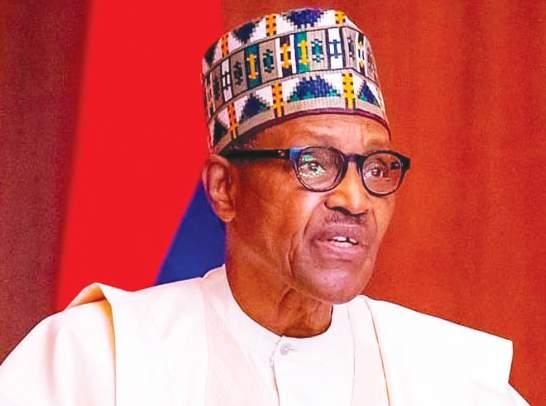
those who had lionized him as a messiah was to be realized mostly in the reverse. Over the next eight years of his tenure as civilian president, his myth came crashing down. Civilian president Buhari was crassly incompetent, slow in action, clueless on policy matters, condescending towards the people who elected him into power. He needed months on end to appoint a cabinet and forever to replace dead or absent cabinet members. He spent months as a patron of London hospitals attending to undisclosed ailments ranging fro ear acheto leukemia.
On the matters that had been his trade marks- anti corruption, nationalism, bureaucratic tidiness, he fell flat on his nose. He ended up presiding over the shredding of the Central Bank, lent money to mostly invisible rice farmers who produced no rice but more propaganda. His administration produced some of the most corrupt public officials that the nation has ever known like the former Central Bank Governor with an estate of nearly 800 housing units in Abuja. He closed the borders to protect local producers of food but food scarcity and higher prices greeted the people towards the end of his tenure. He was characteristically alienated and distant from the people. His indifference was seen as patent insensitivity. He openly failed to understand the changing needs of the new generations of Nigerians, describing the youth as lazy. Most embarrassingly, a man that many had seen previously as a nationalist displayed the most brazen acts of xenophobic ethnocentrism in appointments. His partisan support for fundamentalist rascality was never in doubt as the phenomenon of armed herdsmen emerged to combat settler farmers in parts of the country.
At times, he could hardly hide his disdain for certain sections of the country. At inception, he swore he owed no development obligations to citizens
in the south east who gave him less than 5% of the votes he scored. He was later to brand the illustrious Igbos of south eastern Nigeria as an irritating ‘dot’ encircled by the Nigerian circle. To the people of the oil rich south south , he ended the successful Amnesty Programme that neutralized widespread militancy in the region.
A man whose credential rested partly on his military background watched helplessly as the nation under his watch reeled under epic insecurity. Armed counter state terror squads came out openly to contest the coercive dominance of the federal state. He could not even secure his home state of Katsina or Abuja, the nation’s capital which came under frequent bandit and terrorist attacks up to engaging his presidential guards and bursting prisons located within earshot of the presidential villa. Nigeria under Buhari was at war with a nameless but omnipresent adversary. Towards the end of his second term in elective office, the masses prayed for time to roll fast so that Buhari could depart. It seemed that he had no other aim than to complete his tenure and depart to his Daura country home. He had run out of energy, initiative, capacity and even basic interest in a job he spend years angling for. The common prayer among the people shifted to the necessity for him to leave before damaging the nation even further.
In Mr. Buhari’s tragic failures as an elected president, so many issues of political relevance have emerged. It is being said that he as a person was ascetic and hardly corrupt. But yet he had too many corrupt people in and around his government. The question that arises is that of the relationship between personal morality of a leader and the moral requirements of public office at the highest level. If the political leadership of a nation were to be insulated from proving moral leadership for government and the larger society, many nations would be content with choosing a Pope, Bishop, Mullah or Budhist monk as leader and leave society to its own desires and designs. Nigerians were least interested in Mr. Buhari’s modest taste and ascetic choices. They desired a state in which
the common good governed public morality. It has also been said in Buhari’s favour that he believed in the power of institutions to guide society aright. Those who hold this view insist that he was more a systems and institutions man. But in Africa, it has been proven again and again that what society needs to make progress is a delicate balance between strong state institutions and a strong leader who drives those institutions to do right for the common good without converting those institutions to private use. Mr. Buhari allowed the institutions of state to falter and fumble as he himself fiddled away in indifference, waiting to be reminded to do basic duties like addressing the nation in times of emergency and trouble like during the #EndSARS crisis.
In Buhari, then, we encounter a classic illustration of Achebe’s concept of “the trouble with Nigeria”, a recurrent paucity of enlightened and informed leadership. A man who had no idea of economics was ever ready to impose his village pastoral concept of subsistence agriculture to solve the crisis of food security in Africa’s largest nation. A man who had little knowledge of current international relations was flying the flag of Nigeria’s diplomacy in the world of the internet. He was still referring to ‘Western Germany’ at the height of his tenure in 2022! Now the man is dead. So also is the halo of a fraudulent myth that some allowed to linger around his troubled image. As the nation finally bids farewell to Buhari, the challenge we still face on the leadership question is that of where and how to draw the line between villains and heroes in the growing pantheon of Nigeria’s leaders. To those who insisted on seeing Buhari as an ascetic hero, his passing will linger as the end of a failed promise of national redemption. But for the majority who were tempted to troop out in celebration of the demise of Buhari the bigot, autocrat and political counterfeit, the recurrent slogan is bound to be: “Let a new day dawn. Let evil die!”
Buhari the military despot was a masquerade that graduated into a myth. But Buhari the civilian president was the unmasking of a fake myth and the full realization of a personal tragic destiny.
Edited by: Duro Ikhazuagbe
email:duro.Ikhazuagbe@thisdaylive.com
Duro Ikhazuagbe
Oleksandr Usyk last night further cemented his place as one of boxing’s greats by stopping Daniel Dubois in round five to become a two-time undisputed heavyweight champion.
The ukrainian put on a masterclass in front of 90,000 fans at Wembley Stadium to dash Dubois’ dreams of being the first Briton to unify the division in the four-belt era.
Usyk, 38, put Dubois down twice in the fifth and the Londoner was unable to return to beat the count the second time round.
He also stopped Dubois in 2023 and extends his perfect record as a professional to 24 victories.
“I’m sorry [Dubois], it’s sport.
My people wanted this win,” Usyk told DAZN.
“Nothing is next. It’s enough. Next, I want to rest. My family, my wife, my children, I want to rest now. Two or three months, I want to just rest.”
Dubois – who beat Anthony Joshua to defend his IBF title in September – tastes defeat for the third time in 25 contests as a professional, with each of those losses coming inside the distance.
Usyk reclaimed the IBF title, which was stripped from him just weeks after unifying the division in 2023, and added it to his WBA (Super), WBO and WBC belts.
“I have to commend him on the performance, I gave everything I had. Take no credit away from that man, I’ll be back,” Dubois told DAZN.
“I was just fighting, trying to pick up round by round. It is what it is.”
Defending champions of Women’s Africa Cup of Nations, South Africa defeated hard-fighting Senegal 4-1 in penalty shootouts last night to set up another mouthwatering semifinal clash with Nigeria’s Super Falcons on Tuesday in Casablanca, Morocco.
Banyana Banyana and the Senegalese ladies were deadlocked as both regulation and extra time were tied at 0-0. But in the ensuing shootouts, the South Africans scored all four goals while Senegal only scored one and missed the next two kicks.
The winner between Nigeria and South Africa will tackle the winner of the other semifinal between hosts Morocco and Ghana in the final scheduled for July 26 at the Olympic Stadium in Rabat. This clash between Nigeria and South Africa should be payback time for the defeat Super Falcons suffered in theAisha Buhari Cup here in Lagos and the opening game of the 2022 edition of the WAFCON in Morocco.
Since after those two defeats of Nigeria, Banyana Banyana have sort of bagged the bragging right of the best team in the continent.
Earlier yesterday, Ghana secured their place in the semi-
finals of the WAFCON after a dramatic 4-2 penalty shootout victory over Algeria, following a goalless draw after extra time at StadeMohamedVinCasablanca.
The highly anticipated quarterfinal clash was a tense and tactical affair, with both sides showing defensive resilience but unable to find the breakthrough in 120 minutes of play.
Ghana thought they had taken the lead midway through the first half when Stella Nyamekye found the net, but the goal was ruled out for offside after a VAR review.
Despite several efforts from the likes of Doris Boaduwaa, Chantelle Boye-Hlorkah, and Evelyn Badu, the Black Queens were denied by a spirited Algerian backline and goalkeeper Chloé N’Gazi. Algeria, playing with determination and energy, also created chances, particularly through Ghoutia Karchouni and Marine Dafeur, but Cynthia Konlan in Ghana’s goal stood firm, making crucial saves during regular time and extra time.
With the match heading to penalties, it was Ghana who held their nerve from the spot.
Cynthia Konlan emerged as the hero, saving efforts from Marine Dafeur and Inès Belloumou to give her side the edge in the shootout.
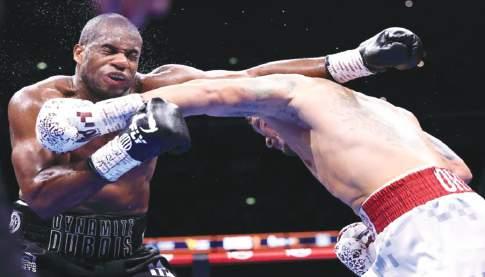
Nigeria’s Matthew Kuti etched his name in history as the first West African player to successfully defend the men’s singles title at the 2025 ITTF Africa West Regional Championships. Meanwhile, Ajoke Ojomu celebrated her first regional triumph in the women’s singles, marking a memorable outing for Team Nigeria at the event, which concluded last night at the Molade Okoya-Thomas Hall, Teslim Balogun Stadium, Lagos.
Following Liberia’s withdrawal, seven nations participated in the tournament. Host nation Nigeria dominated the team events, defeating Ghana, Benin Republic, Guinea, Togo, Côte d’Ivoire, and Burkina Faso.
Despite stiff competition from Côte d’Ivoire in the men’s singles, Nigerian players swept all the medals in the singles categories. Defending champion Kuti reaffirmed his supremacy by overcoming compatriot Abdulbasit Abdulfatai 4-1 (7-11, 11-6, 11-9, 11-7, 11-7) in the final.
Ahead of the FIBA Africa Women’s Afrobasket Championship slated to hold in Abidjan, Côte d’Ivoire, Head Coach, Rena Wakama, has joined the D’Tigress camp as team continues preparation in Abuja.
In the women’s singles, Ojomu bounced back from her 2024 loss to compatriot Hope udoaka to claim her first regional title. She defeated SukuratAiyelabegan in straight sets (11-7, 11-8, 11-5, 14-12), despite battling a leg injury during the match. Energized by the home crowd, Ojomu pushed through the pain to
emerge victorious.
Earlier in the tournament, on Thursday, July 16, Nigeria’s men’s team reclaimed their title with a commanding 3-0 win over Côte d’Ivoire in the final.
The Nigerian women’s team, led by Ojomu, also retained their crown with a flawless run, defeating Benin Republic, Ghana, and Guinea.
The four-day championship also served as a qualifier for the 2025 African Championships, scheduled for October 12–19 in Kigali, Rwanda. After narrowly losing the 2024 title to Togo, the Nigerian men returned with renewed determination. Playing on home soil, the trio of Kuti, Taiwo Mati, and Abdulfatai dropped only one set in the group stage—ironically to Côte d’Ivoire—before powering through the knockout rounds to dominate the final.
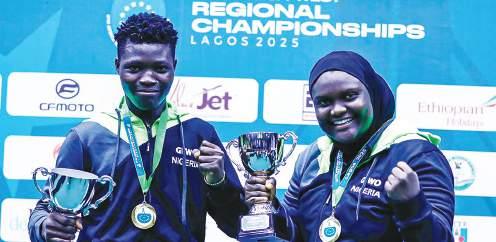
In 2023, Wakama made history as the first female head coach of the team and led D’Tigress to their fourth consecutive FIBA AfroBasket Women title, the first by a Nigerian female coach since the tournament began. Under her leadership, D’Tigress also became the first African team, male or female, to reach the basketball quarterfinals at the 2024 Paris Olympics, earning her FIBA’s Best Coach of the tournament award in the French capital last year.
Atalantaarefarfromimpressed with the €40million bid Inter Milan are offering after agreeing personal terms with Ademola lookman. According to Italian news outlet, Tuttomercato, the offer by Inter Milan for the Super Eagles forward to move on loan with an obligation to buy, describing it as insulting.
Atalanta consider Inter Milan offer insignificant and are irritated by the proposal, viewing it as an affront to their best player. Ademola Lookman has agreed to a five-year contract with Inter, to earn Four Million Euros per season, and has expressed his preference for joining Inter. The reigning African Player of the Year has been linked with top clubs across Europe, from Barcelona to Arsenal.
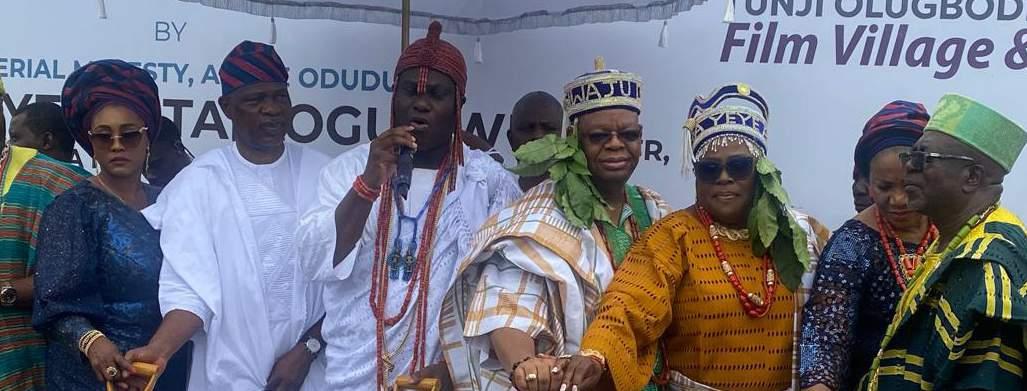
simon.kolawole@thisdaylive.com, sms:
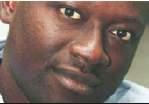
On December 31, 1983, I was but a tiny secondary school kid when Brig Sani Abacha announced the overthrow of President Shehu Shagari. The economy was in a complete mess, measured by the skyrocketing cost of living. Oil prices had dropped below $10 per barrel and foreign reserves had fallen to $1 billion — compared to a fairly healthy $10 billion in 1980. Prices of basic commodities doubled in a short while and factories started closing down as forex scarcity bit hard. Everything was going haywire. Abacha’s voice that early Saturday morning brought relief to millions of Nigerians who expected the new military government to tackle the inflation and restore sanity to the economy.
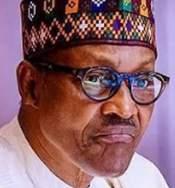
the links between production, consumption, exports, imports, the value of the naira and the overall health of the economy.
Worse still, I thought the economy was something to be fixed with military orders, price controls and popular opinion. With Nigerians still in the grip of untold economic hardship — coupled with the military highhandedness that saw journalists, critics and activists being arrested and detained without trial — there was another huge sigh of relief on August 27, 1985 when Brig Joshua Nimyel Dogonyaro announced the overthrow of Buhari. I celebrated, more so as the new head of state, Maj Gen Ibrahim Babangida, started to paint the picture that he was going to be a different, liberal kind of leader. He called himself “president”. He subjected economic reform decisions to public debate.
Babangida’s reforms under the structural adjustment programme (SAP) led to the liberalisation of the forex market, removal of subsidies and more pains. Nigerians began to regret Buhari’s exit. The refrain became: “Buhari’s government was not this bad.”
that his government made many mistakes but said they were “honest mistakes” because “we were in a hurry to change things”. Those words touched me. He came across as someone with a genuine desire to change Nigeria. I began to see him in a new light and I believed he did well as chairman of the Petroleum (Special) Trust Fund (PTF).
After admiring him from a distance for years, I finally met him in March 2001. I had just been appointed editor of the about-to-be-revamped TheWeek, a weekly news magazine founded by Alhaji Atiku Abubakar. Buhari graciously agreed to speak with me. I travelled to Kaduna to meet him and he gave me a very good interview with which we relaunched the magazine. He was very critical of the Obasanjo administration on leadership, security, corruption and the economy. That edition sold out. We kept in touch. I believed the media had been unfair to him and I took it upon myself to make his voice heard, all the more after I moved on to THISDAY in 2002 and became the Saturday editor.
Much later in the day, Major Gen Muhammadu Buhari was unveiled as the new head of state and Brig Tunde Idiagbon as the chief of staff, supreme headquarters — or No 2. Buhari instantly set out to work, preaching the virtues of patriotism and orderliness, launching the War Against Indiscipline (WAI), and jailing corrupt politicians, some for 500 years. But the economy remained in a bad state. At the Continued on page 37
I only started having a soft spot for Buhari in the mid-1990s when he admitted to TheNews magazine
When Buhari lost the 2003 presidential election, I

Not unexpectedly, the death and the burial of former President Muhammadu Buhari have focused the attention of the country on his person and stewardship. The reactions and the comments, expectedly too, have been varied, from the sugary to the scathing. But leading members of the Nigerian political class have united in paying homage to him and even in undertaking pilgrimage to Daura, the hometown of the late president. They are not just obliging the usual respect to the dead or avoiding to speak ill of the dead. They are either angling to make political hay of Buhari’s passing or positioning not to attract the ire of Buhari’s still massive political following. In life and in death, the soldier who did not transition into a full politician in the Nigerian sense of it continues to stand out as the country’s most enduringly dominant political force. For the bulk of the Fourth Republic, and even across democratic dispensations, Buhari leads in the mass appeal column by more than a country mile. His is a peculiar phenomenon worth dissecting and understanding.
Nigeria has had a few popular politicians. We have had Dr. Nnamdi Azikiwe (father of the Zikist Movement who at his height was idolised as the Great Zik of Africa), Chief Obafemi Awolowo (leader of the Awoists, famously described at death by Chief Odumegwu Ojukwu as ‘the best president Nigeria never had’), Mallam Aminu Kano (the radical opposition politician who in the first and second republics fired the imagination of the talakawas) then lately Mr. Peter Obi (whose Obidients, in 2023, disrupted the established voting pattern of the Fourth Republic) and Dr. Rabiu Musa Kwankwaso (whose red-cap Kwankwasiya movement rules the roost in present Kano State).
Even among these wildly popular politicians, Buhari stood out, not just as the only soldier in the pack. He is the first and the only one, till date, to successfully convert the mass following to the desired electoral advantage as head of the federal government and the first and the only opposition politician, till date, to dislodge a sitting president. A fair but inadequate rebuttal would be to frame Buhari’s near religious following as localised in the Muslim north. True, the 12 million votes that Buhari routinely banked across
multiple electoral cycles were largely restricted to the North West and the North East. But all the mass political followings that we have witnessed have a local/ethnic core. They are all largely concentrated either in an area (Aminu Kano and Kwankwaso) or in a zone (Awolowo) or in a combination of zone and region (Azikiwe and Obi).
One of the iron laws of Nigeria’s politics is that localised mass appeal would not be enough to win the highest office in the country. The divisive and distrustful nature of our politics always ensures that a politician with rabid support in his home zone or region also arouses deep suspicion from other parts of the country. A safer route to Nigeria’s presidency has been to stir the least objection across the country and be able to cobble together a winning coalition.
A broad appeal is thus preferable to localised mass appeal, as demonstrated in 1979 by Alhaji Shehu Shagari and in 1999 by Chief Olusegun Obasanjo, with the latter remarkably snapping the ultimate prize without even the benefit of a respectable showing in his home zone.
Being able to completely lock down a base (ethnic or religious, or a combination of both) is a rare gift.
Most politicians would pine for that, and no one with such a gift would willingly trade it for something less. It is not unusual for our massively popular politicians, by design or default, to be perceived or projected as the leader of an ethnic group or region (Aminu Kano and Kwankwaso are exceptions). But it is also a major handicap in Nigeria’s delicately balanced politics. The politicians with mass appeal got this memo too. While holding down their base, they would also seek alliances across the country to give them the required number and spread. But they always came up short, until it happened for Buhari. After three previous attempts, Buhari was able to overcome the handicap of localised mass following when between 2013 and 2015 he allied with others to build a winning coalition that expanded on his loyal base and offered a bridge into the southern zones and parts of the North Central. Essentially, the localised mass appeal was transformed into a broad, more national appeal. (By the way, Buhari attempted a similar alliance in 2011, and there were permutations along same lines even in the 2003 and